1mabith
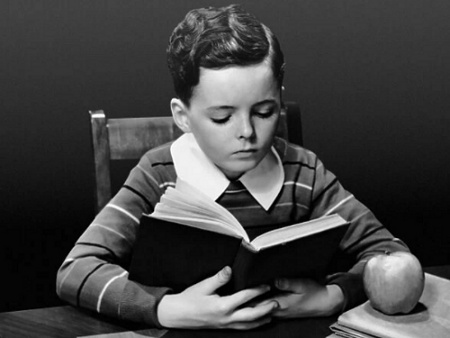
Read in 2024:
State of Exile by Cristina Peri Rossi
The Club – Leo Damrosch
Saving Sunshine – Saadia Faruqi
The Bass Rock – Evie Wyld
You Use a Gun, I Use a Bow – Hu Sheng You Meng
Kingdom of Characters – Jing Tsu
Rebecca – Daphne du Maurier
White Teeth – Zadie Smith
Seasons in the Sun – Dominic Sandbrook
Angelica – Sharon Shinn
Don't Call it a Cult – Sarah Berman
Cluny Brown – Margery Sharp
The Unbeatable Squirrel Girl Volume 6 – Ryan North
For Real – Alexis Hall
Rogues' Gallery – Philip Hook
It's Lonely at the Centre of the Earth – Zoe Thorogood
Girls and Their Monsters – Audrey Clare Farley
The Affair of the Bloodstained Egg Cosy – James Anderson
The Picts and the Martyrs – Arthur Ransome
Havana Nocturne – TJ English
Heart in a Box – Kelly Thompson
The Birth of Classical Europe – Simon Price
Don't Tell Anybody the Secrets I Told You – Lucinda Williams
The Affair of the Mysterious Letter – Alexis Hall
The Snarkout Boys and the Avocado of Death – Daniel Pinkwater
Empire State – Jason Shiga
What's Cooking in the Kremlin – Witold Szablowski
Sheets – Brenna Thummler
The Fraud – Zadie Smith
Beauty is a Verb – Jennifer Bartlett, Sheila Black, Michael Northen
Adventures of a Dwergish Girl – Daniel Pinkwater
The Wager – David Grann
Fuzz: When Nature Breaks the Law – Mary Roach
Hidden Valley Road – Robert Kolker
After I Died I Became Popular Again – Zuo Chuanchuan
Felix Holt, the Radical – George Eliot
The Snarkout Boys and the Baconburg Horror – Daniel Pinkwater
The Dictionary People – Sarah Ogilvie
Boy in a China Shop – Keith Brymer Jones
Bunbury – Tom Jacobson
Mr. Fashionable – Yu Xiao Lanshan
Rebirth of a Movie Star – J112233
Tipping the Velvet – Sarah Waters
How to Say I Love You – Feng Liu Shu Dai
The Buried Book – David Damrosch
After Marrying the Villain I Became Popular – Gan Hui
In Farleigh Field – Rhys Bowen
Tattoo – Bu Wen San Jiu
Beyond the Wall – Katja Hoyer
Later He Became a Royal Healer – Yan Guikang
Epitaph – Mary Doria Russell
Study for Obedience – Sarah Bernstein
Ignition! – John Drury Clark
Dark Archives – Megan Rosenbloom
I Can Do It – Jiang Zi Bei
Revolution – Peter Ackroyd
Hands of Time – Rebecca Struthers
Freddy Goes to the North Pole – Walter R. Brooks
The Moonstone – Wilkie Collins
The Ends of the World – Peter Brannen
Gentlemen of Uncertain Fortune – Rory Muir
Fight Night – Miriam Toews
O Ye Jigs and Juleps – Virginia Cary Hudson
The House of Mirth – Edith Wharton
Mortal Follies – Alexis Hall
The Art Thief – Michael Finkel
Design for Living – Noel Coward
Bank Shot – Donald E. Westlake
The Great Pearl Heist – Molly Caldwell Crosby
Cold War Spy Stories from Eastern Europe – Valentina Glajar (editor)
Pure Wit – Francesca Peacock
Something's Not Right – Cyan Wings
Bunk – Kevin Young
Emperor of Rome – Mary Beard
After Transmigrating I Made the Antagonist Cry – Qiao Muli
Spells for Forgetting – Adrienne Young
Ex-Husband's Call – Qin San Jian
Mutiny on the Rising Sun – Jared Ross Hardesty
Rise of the Novel – Leo Damrosch
For Real – Alexis Hall
The Gulf – Adam de Souza
Bitter Orange Tree – Jokha Alharthi
Mexikid – Pedro Martin
Good Behavior by Donald E. Westlake
UPROAR! – Alice Loxton
Queer Africa – Karen Martin, Makhosazana Xaba and others
When the Earth had Two Moons – Erik Asphaug
The Antelope and Night Wolf – Li Xiu Luo
A Shilling for Candles – Josephine Tey
Paperback Crush – Gabrielle Moss
Glitterland – Alexis Hall
The Library: A Fragile History – Andrew Pettegree
Into Thin Air – Jon Krakauer
You'll Do – Marcia Zug
Cotillion – Georgette Heyer
Drowned Hopes – Donald E. Westlake
Perilous Question – Antonia Fraser
Don't You Like Me – Lu Tianyi
Who Dares Wins – Dominic Sandbrook
All Fours – Miranda July
Thinking About History – Sarah Maza
A Psalm for the Wild-Built – Becky Chambers
A Prayer for the Crown-Shy – Becky Chambers
Venerable Devil Also Wants to Know – Cyan Wings
Kintu – Jennifer Nansubuga Makumbi
American Eclipse – David Baron
What's the Worst that Could Happen – Donald E. Westlake
Medieval Maritime Warfare – Charles D. Stanton
The Circular Staircase – Mary Roberts Rinehart
In the Wake of the Plague – Norman Cantor
Guardian of the Horizon – Elizabeth Peters
Killers of the King – Charles Spencer
All the Knowledge in the World – Simon Garfield
Woman, Captain, Rebel – Margaret Wilson
Freddy and the Baseball Team from Mars – Walter R. Brooks
The Trolley to Yesterday – John Bellairs
Doctor Zhivago – Boris Pasternak
He Lifted My Red Veil – Zi Jin
Milkman – Anna Burns
The Art of the English Murder – Lucy Worsley
The Prime of Miss Jean Brodie – Muriel Spark
The Disabled Tyrant's Pet Palm Fish – Xueshan Fei Hu
The Talented Mrs. Mandelbaum – Margalit Fox
We Solve Murders – Richard Osman
The Rise and Fall of Alexandria – Justin Pollard, Howard Reid
The Star Around the Sun – Jin Gang Quan
The Woman in White – Wilkie Collins
The Lion in Winter – James Goldman
A Gentleman from Japan – Thomas Lockley
The Hunter – Richard Stark
The Man with the Getaway Face – Richard Stark
The Ninth – Harvey Sachs
Zapped – Bob Berman
Ethan Frome – Edith Wharton
The Outfit – Richard Stark
The Hot Rock – Donald E. Westlake
Those Wild Wyndhams – Claudia Renton
The Very Secret Society of Irregular Witches – Sangu Mandanna
Worn – Sofi Thanhauser
FOG – Man Man He Qing Duo
Confounding Oaths – Alexis Hall
New Times New Hell – Lin Zhiluo
Challenger – Adam Higginbotham
Dead Djinn in Cairo – P. Djeli Clark
The Mourner – Richard Stark
Skies of Thunder – Caroline Alexander
The Last Honest Man – James Risen
The Score – Richard Stark
On the Waterfront – Budd Schulberg
Nobody's Perfect – Donald E. Westlake
The Bean Trees – Barbara Kingsolver
Four Lost Cities – Annalee Newitz
The Banished Immortal – Ha Jin
Zoot Suit – Luis Valdez
All the President's Men – Carl Bernstein, Bob Woodward
Waiting for the Flood – Alexis Hall
The History of the Ancient World – Susan Wise Bauer
In the Great Green Room – Amy Gary
Pansies – Alexis Hall
Inside Job – Connie Willis
The Masqueraders – Georgette Heyer
Vienna 1814 – David King
Looking for Group – Alexis Hall
Parable of the Sower – Octavia Butler
Keats: A Brief Life in Nine Poems and One Epitaph – Lucasta Miller
Writing on the Wall – Tom Standage
Lolly Willowes – Sylvia Townsend Warner
The House in the Cerulean Sea – TJ Klune
Freddy the Cowboy – Walter R. Brooks
2mabith
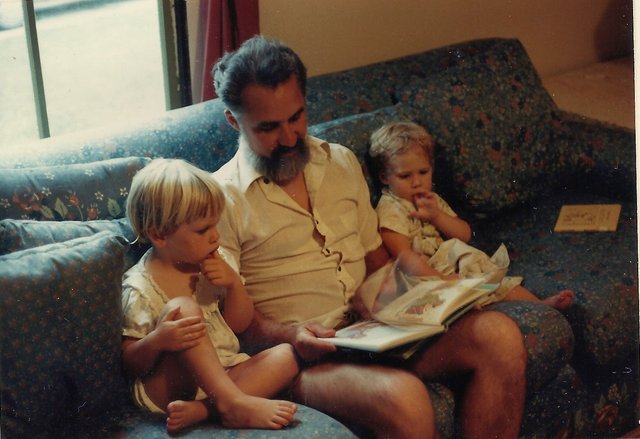
After a three year break from LT due to a variety of factors (pandemic, sudden long-term cat death, father's death etc...) I'm back! Excited to see some familiar names and get back to having more variety on my reading (and to-read) lists.
The photo is my dad with my cousin and myself.
When I was feeling like I was ready to come back to LT he got a diagnosis of Alzheimer's and late stage multiple myeloma at basically the same time and then died six months later in September of 2022. My mom died in 2017, roughly a month after her cancer diagnosis, and being only 38 years old the mental adjustment to Orphan has been very challenging. My grief over my mom only seems to grow in scale each year with the sheer enormity of what was lost (for both of us).
My dad wasn't a great father or friend to his adult children (just didn't have the emotional maturity for it), but he was very fun when I was a kid and so many of my reading interests were informed by his interests (which he very successfully passed on to me). He was a librarian for all of my childhood, so being stuck in libraries for full work days growing up during the summer or school breaks also informed how much I enjoyed reading and libraries in general.
3mabith
2023 Favorite Reads:
Fiction:
1632 by Eric Flint
The Last Devil to Die by Richard Osman
10 Things That Never Happened by Alexis Hall
Babel by RF Kuang
She Who Became the Sun by Shelley Parker-Chan
When the Angels Left the Old Country by Sacha Lamb
Piranesi by Susanna Clarke
At Night All Blood is Black by David Diop
Non-Fiction:
Kissinger's Shadow by Greg Grandin
Unmask Alice by Rick Emerson
Unruly by David Mitchell
The Field of Blood: Violence in Congress and the Road to the Civil War by Joanne B. Freeman
Madame Restell by Jennifer Wright
State of Emergency by Dominic Sandbrook
Things Are Never So Bad That They Can't Get Worse by William Neuman
The Domestic Revolution by Ruth Goodman
Ambition and Desire by Kate Williams
Delicacy by Katy Wix
Madhouse at the End of the Earth by Julian Sancton
River of the Gods by Candice Millard
The Reason for the Darkness of the Night by John Tresch
Born to be Hanged by Keith Thomson
I did so much re-reading this year that it was certainly easier to pick favorites out of the new-to-me books!
Fiction:
1632 by Eric Flint
The Last Devil to Die by Richard Osman
10 Things That Never Happened by Alexis Hall
Babel by RF Kuang
She Who Became the Sun by Shelley Parker-Chan
When the Angels Left the Old Country by Sacha Lamb
Piranesi by Susanna Clarke
At Night All Blood is Black by David Diop
Non-Fiction:
Kissinger's Shadow by Greg Grandin
Unmask Alice by Rick Emerson
Unruly by David Mitchell
The Field of Blood: Violence in Congress and the Road to the Civil War by Joanne B. Freeman
Madame Restell by Jennifer Wright
State of Emergency by Dominic Sandbrook
Things Are Never So Bad That They Can't Get Worse by William Neuman
The Domestic Revolution by Ruth Goodman
Ambition and Desire by Kate Williams
Delicacy by Katy Wix
Madhouse at the End of the Earth by Julian Sancton
River of the Gods by Candice Millard
The Reason for the Darkness of the Night by John Tresch
Born to be Hanged by Keith Thomson
I did so much re-reading this year that it was certainly easier to pick favorites out of the new-to-me books!
4Eyejaybee
Welcome back, Meredith. I was sorry to read about your loss and the difficult time over the last few years. I hope that 2024 is a huge improvement, and that you have a great year of reading.
I am looking forward to catching a lot of book bullets from you and the rest of the Group.
I am looking forward to catching a lot of book bullets from you and the rest of the Group.
5pamelad
It's good to have you back, Meredith. I'm so sorry to hear about the deaths of your parents. No matter how old you are, you're cut adrift. I hope things go well for you this year.
6mabith
Thank you both! It's been so nice to see so many familiar names still active on here (not really a surprise exactly, but you never know with online communities).
7mabith
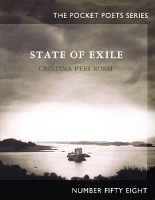
State of Exile by Cristina Peri Rossi
A quite small read to get myself going for the year. Rossi was exiled from Uruguay in 1972 (after her work was banned), after which she moved to Spain. These poems were written during her journey and the first period of her exile. They are largely quite brief and mostly speak to the day to day feelings. I feel like it's less a collection to become a favorite and more stands as an interesting window to that specific experience and the disconnects it imposes.
I'd marked a couple to copy out, but I can't retrieve the book as now my cat is sleeping on my lap, and well, I am a sucker. Let's pretend it's just because she had a difficult time over the holidays when there were a lot of guests around a few times so I have to make it up to her.
Cat placeholder for eventual poem:

8mabith
Adding the Cristina Peri Rossi here
Proximities
I don't need to go very far
to dream
A train to the suburbs is enough for me
Some rusted tracks that run
along the seashore
and I feel I'm already in another world
My ignorance of the nomenclature
allows me to baptize with other names
My foreignness
--I am the foreigner, the passing strange--
is the universal citizenship of dream.
Cercanias
No necesito ir muy lejos
para soñar
Un tren de cercanias me basta
Unas vias herrumbrosas que corren
al borde del mar
y ya me siento en otro mundo
Mi ignorancia de le nomenclatura
me permite bautizar con otros nombres
Mi ajenidad
--soy la extranjera, la de paso--
es la ciudadania universal de los sueños.
What a way to learn I still remember the alt code for an N with a tilde! Thank you high school Meredith for memorizing so many of those.
Proximities
I don't need to go very far
to dream
A train to the suburbs is enough for me
Some rusted tracks that run
along the seashore
and I feel I'm already in another world
My ignorance of the nomenclature
allows me to baptize with other names
My foreignness
--I am the foreigner, the passing strange--
is the universal citizenship of dream.
Cercanias
No necesito ir muy lejos
para soñar
Un tren de cercanias me basta
Unas vias herrumbrosas que corren
al borde del mar
y ya me siento en otro mundo
Mi ignorancia de le nomenclatura
me permite bautizar con otros nombres
Mi ajenidad
--soy la extranjera, la de paso--
es la ciudadania universal de los sueños.
What a way to learn I still remember the alt code for an N with a tilde! Thank you high school Meredith for memorizing so many of those.
9mabith
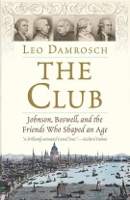
The Club: Johnson, Boswell, and the Friends Who Shaped an Age by Leo Damrosch
This book suffers a bit from containing very interesting information but scattered across a range of people who spent most of their lives apart. Damrosch gives potted biographies of each but the length of time he's covering and the variety of figures makes the book feel disconnected in a way I wasn't prepared for.
In the end, some of the most interesting sections were about the women in and around this group (the most well known of whom is Fanny Burney). Approached as a collection of interlinked essays, I think it would be a more satisfying read. I didn't dislike it, it's a great start to approaching any of the figures it covers, or this period of history, but it is limited. Damrosch is not as skilled at building the full picture as, say, Candice Millard or Caroline Alexander.
After reading this I've also cursed myself by looking up Damrosch and discovering a much earlier book that I'm desperate to read but cannot find at an affordable price, The Sorrows of the Quaker Jesus: James Nayler and the Puritan Crackdown on the Free Spirit. Most of my high school years I attended a very small Quaker boarding school, and I bet this was in the library when I was there (or in the library at the meeting house). So tempted to call and ask about it.
10mabith

Saving Sunshine by Saadia Faruqi
This is a middle-grade aimed graphic novel about a set of twins (a brother and sister) on vacation with their family. They've been bickering so badly that their phones are confiscated and they're forced to amuse themselves together at the beach.
I found this through the illustrator (Shazleen Khan), who writes and draws a webcomic I really like. A friend of mine has a sort of mini-book club with her daughter, and as the friend's birthday is coming up I snapped this up for her. Of course, what kind of person would I be if I didn't read it before mailing it off.
Needless to say, I really liked the art. The story is largely focused on the siblings attempts to understand each other but brings up wider issues as well (the sister has started to wear a hijab and the brother has trouble sticking up for her when kids make ignorant comments). It's well balanced, and feels like the right length for the story, which has become quite a problem after publishers realized graphic novels were popular but felt every title should be 100 pages long. I'd certainly recommend it to anyone looking for middle-grade graphic novels.
11wookiebender
I'm sorry to hear about your parents' deaths. I'm back after a long LT break that also encompassed the death of both my parents (Mum after a long running battle with cancer in 2021 during the second long Sydney lockdown from COVID; Dad from a shorter battle with cancer in 2022; it took my sister and I some 9 months to clear out their house as well because they'd lived there for 45 years and had all sorts of beautiful things that we both wanted to sort through, as well as the mandatory odd drawer full of rusted jar lids, etc). Some days the grief still hits me out of the blue, and I go and hug Dad's cat Pippi who is living with us now and bringing us much joy. I'm glad you have a cat to help you through the difficult days.
12mabith
I'm so sorry you're on this train as well, Tania, and with such a small gap between the deaths. Cancer is an absolute bastard. I'm sure the cats especially give themselves a lot of credit for comforting us.
13wookiebender
The cats deserve all credit, tbh. 🐈 ❤
14mabith
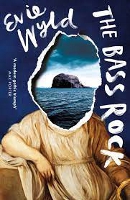
The Bass Rock by Evie Wyld
Wyld is a writer I particularly like, but I put this title off for a few years. It's her third novel since 2009 (she's very much not a full time writer), and her second (All the Birds, Singing) was so impressive, so innovative in form, so soul-shattering, that I couldn't stand to pick up The Bass Rock. This one does not quite reach those previous heights, but it was still incredibly immersive.
The book opens with a little girl finding a dead body in a suitcase on a local beach and cycles us through three time periods and groups, largely in Scotland. We go from the target of a literal witch hunt, to a woman embarking on a new marriage as the second wife and adapting to a new community after WWII, to one whose life is falling apart in the wake of her father's death. There are ghosts, secrets, and strangeness galore, along with so much grief in varying forms. Everyone is struggling and haunted and facing personal demons, and the atmosphere is delivered extremely effectively.
Since I knew I'd read this book no matter what, I didn't actually read the publisher's summary at any point. I can only thank myself for this grace, as I don't think it represents the book all that well (makes it sound more 'book clubby' than it is, in the negative sense, and speaking as someone in book clubs). On the other hand, I probably could have used the heads up for parent deaths in the book. Six of one, half dozen of the other I guess.
Wyld is one of those novelists particularly skilled is creating living characters, and I'll continue to seek out her work. This year I might try to carve time and energy for a re-read of All the Birds, Singing.
15mabith

You Use a Gun, and I Use a Bow by Hu Sheng You Meng RE-READ
Re-read of a Chinese webnovel. I started casually learning Chinese some years ago, which led to watching a lot of Chinese TV and then reading heaps of webnovels (sometimes the basis for those shows). Even though I'm reading translations there are always a lot of interesting notes of word usage and idioms and cultural points.
This is one of the pro-gaming focused novels, and just a pure comfort reread after I had to heal myself from Wyld's too-real characters. This one is a particularly amusing queer romance. Given that most of these writers are doing this as a side gig, I'm often pleasantly surprised by the quality of the work and the different culture around webnovels, where authors frequently say things like 'hey don't worry about X happening because it won't.' It's also fascinating that SO many Chinese dramas are based on webnovels, and they're often adapted extremely well.
16mabith

Kingdom of Characters: The Language Revolution that Made China Modern by Jing Tsu
This is about the various hurdles that written Chinese faced over the late 19th through the late 20th centuries, with how to use it for telegraphs, how to develop a typewriter for it, how to standardize a phonetic form, how to develop computer fonts and allow input, etc... For those who don't know, when you're typing Chinese on a computer or smartphone you use the phonetic form which brings up a list of characters with that syllable (or with phones especially there are usually handwriting inputs as well).
This was interesting, particularly the section on typewriters, I don't know how on earth anyone felt confident about developing that. A lot of the book is also just about the place that the written language has in the culture and the push back against the idea that it had to be scrapped in order to become a modern country. It's an absolutely ludicrous idea that you could change the written form given the number of homophones (and I don't even mean the same syllable with different tones, though there are loads, I mean same syllable AND same tone). Even the simplification of common characters experienced a lot of outrage, due to changing the radical in a character.
Probably only a more interesting read if you're already into the language and somewhat familiar with it (which I am).
17mabith

Rebecca by Daphne du Maurier
It's always a bit strange finally reading a book that you've known the title and author association for so long without knowing anything about the plot. This was picked for my book club, otherwise I probably wouldn't have gotten around to reading it.
I can see why the novel became such a touch point of 20th century novels, the atmosphere is very strong and quite compelling. However, I felt the narrator was too contradictory. She is obsessed with her new husband's first wife, who she knows tragically drowned. She is constantly in her own head about what the first wife was like, the fact everyone seemed to love her, her own place in her new husband's thoughts, and of course the oppressive house where every corner was touched by the woman who came before her. Only then, despite the obsessive thoughts and low self-esteem and insecurity, she'll be talking to people about swimming at the beach where the other woman drowned and not understand why the atmosphere shifted for minutes at a time. I don't think du Maurier remotely understood how that kind of anxiety manifested.
Where the plot went also felt fairly predictable, but the contradictions in our narrator (and the husband to a lesser extent) is what constantly got in the way for me. I could see so many ways to accomplish what du Maurier seemed to want with her in other less contradictory ways. The husband had quite a few of those moments as well, but they are less prominent because he is largely less prominent.
18pamelad
>17 mabith: Daphne du Maurier writes a good gothic romance, but they're not great literature. They follow a formula. The heroine of this one is typical: weak, worried and alone in the world. You don't expect insight and intelligence from a gothic heroine (unless she's Jane Eyre). Maximillian de Winter is also typical: silent, brooding and mysterious. It's all about the melodrama! The Hitchcock film is worth watching too.
I just finished Dragonwyck, another good gothic which I really liked despite its many flaws. Dragonwyck and Rebecca were written in the thirties and forties, when being dependent and not very bright weren't necessarily bad qualities in a romantic heroine.
I'm currently plodding through du Maurier's The King's General, which is a bit too worthy and serious.
I just finished Dragonwyck, another good gothic which I really liked despite its many flaws. Dragonwyck and Rebecca were written in the thirties and forties, when being dependent and not very bright weren't necessarily bad qualities in a romantic heroine.
I'm currently plodding through du Maurier's The King's General, which is a bit too worthy and serious.
19mabith
Pamela, I'd say gothic novels generally won't be my thing, though I'll get to Jane Eyre eventually probably.
Typically for me, I suppose, I've read two of Anya Seton's books and loved them, but they're both her biographical novels rather than her gothic novels.
Typically for me, I suppose, I've read two of Anya Seton's books and loved them, but they're both her biographical novels rather than her gothic novels.
20mabith

White Teeth by Zadie Smith
I've been meaning to read this for over a decade and finally got to it. Despite the years of hype for this novel and Smith in general, it exceeded my expectations. I'm blown away that this was her debut novel. I imagine it must have been difficult to have to come out SO strong when it came to the immediate followup. The writing was just fantastic. and enjoyable the whole way through.
Other than knowing that race would be a theme of the novel, I didn't remind myself of the specific premise of the book, and as usual I feel like going in ignorant of specifics works in my favor. The loosest summary of this one is simply the dynamics of two close family groups in the second half of the 20th century (well two and half families really). If it's on your list to read already, don't keep putting it off.
21mabith
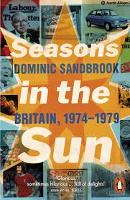
Seasons in the Sun: The Battle for Britain, 1974-1979 by Dominic Sandbrook
Last year I read the book before this one, covering 1970-74 and really enjoyed the deep dive into a short period. Sandbrook is very good at tying in the threads of popular culture and events with the political situation. He also seems reasonably good at being fair to the public figures involved, or at least looking well past common knowledge/assumptions and pointing out where they're inaccurate. I don't always agree with his conclusions but that hasn't impacted my enjoyment of the books.
They are quite long (in paperback this is 840 pages), and this one felt like a particularly hard slog. I found so many of the key figures incredibly stressful, partly I'm sure because this period is so responsible for building much of our current world and the events of my childhood. It's hard to look at it in isolation and 'watch' the politicians make the stupidest, most short-sighted decisions. He does try bring the humor where he can, but it's a dark period.
Of course, part of me still wants to immediately read the next in the series so take from that what you will (keeping in mind that history of almost any sort is my favorite reading subject, so your mileage might vary).
22mabith
In the last few weeks I've also reread seven or eight of my Chinese webnovels, but none of them really need posting about in isolation.
For months I've had various disability benefits review appointments going on and the stress has made me reach for all the rereads. Everything *should* be fine, certainly nothing in my health situation has changed, but when your ability to live a semi-independent life is on the line it's hard to be calm about it (especially after losing both my parents).
For months I've had various disability benefits review appointments going on and the stress has made me reach for all the rereads. Everything *should* be fine, certainly nothing in my health situation has changed, but when your ability to live a semi-independent life is on the line it's hard to be calm about it (especially after losing both my parents).
23mabith

Angelica by Sharon Shinn REREAD
A night-time audio reread for lying awake in bed but knowing the 'rest' is needed... This was the last book Shinn did in her Samaria setting, a far future world where the population was whisked away from their home planet after devastating war and started over with minimal technology and protections in place from their god to keep the peace. But all is not what it seems.
I enjoyed the Samaria trilogy (starts with Archangel), it has an interesting arc and she generally writes compelling characters. After those three books, she did two stand-alone works in the world, of which this is the weakest one. The pacing and personal development just seem a bit off. It feels like maybe she just needed a guaranteed payment and the publisher was more open to another set in this world vs a new series. The two main characters are also just less interesting and compelling than her leads usually are.
24mabith
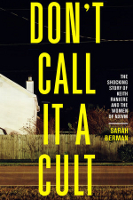
Don't Call it a Cult by Sarah Berman
This is a about the group NXIVM, led by Keith Raniere who was found guilty of various charges in 2019. There's a two season documentary series mostly focusing on one aspect of it called The Vow.
It's really hard to understand how so many people just missed all the red flags about this group and its teachings, particularly all these young women. There was a lot along the lines of 'if you feel upset by something that's probably your own fault so you need to examine your own behavior.' Even as a seven year old child my older sister saying she couldn't *make* me feel bad, she couldn't *make* me feel any particular emotion, *I* was in control of that, smacked of bullshit.
The book went into the fuller story whereas the documentary is heavily focused on a supposed women's empowerment group Raniere had set up which involved a lot of sexual coercion and being branded with his initials among other things. It was an interesting, if disturbing and confusing read. I know we'd all like easy answers to our problems, but I'm constantly surprised how many people fall into believing those actually exist and are held by one random guy.
25mabith
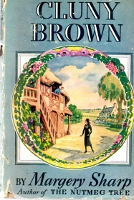
Cluny Brown by Margery Sharp
I'm a big fan of Sharp's Rescuers books (which the Disney movies were inspired by, one can't really say based on). They're smart, very funny, and a great time, so I've been meaning to read a few of her more adult works. The Rescuers at least was actually not exactly written for children either, which is fairly clear as you're reading it though I think she tailored them more for kids after that.
Cluny Brown is a young woman who doesn't know her place, so people keep telling her. She does shocking things like use her own money to take herself to tea at the Ritz (quite abover her station) and speaks plainly to people around her. Her uncle decides the solution is to send her into service and she becomes a parlor maid. We bump merrily along with her, her employers, their son, a Polish house guest, and the local pharmacist. Unusually for a book of this vintage (originally published in 1944), you never feel quite sure of what's going to happen, which was an enjoyable aspect. The ending somehow felt neither utterly predictable or particularly unusual, but did feel right. Though I think Sharp could have made any of the possible outcomes feel right.
While it's not an absolutely fantastic read I'll be pushing at everyone I encounter, it was a fun little snapshot of the era and I really enjoyed Cluny as a character. I'm certainly still thinking about it and how it might have fit into contemporary novels of the time. I don't know enough about this kind of 1940s novel and I wish I did to have more context for it (most of my reading from the 30s-40s are mystery novels or children's novels).
26mabith

The Unbeatable Squirrel Girl Volume 6: Who Run the World? Squirrels by Ryan North and Erica Henderson
I'm not a big mainstream comics reader, but Squirrel Girl is such a fun series. It's such a silly character that all of the nonsense that accompanies Marvel anything doesn't feel jarring in the way it does with other characters. I'm still happiest with the more alternative side of comics (or with old Carl Barks and Walt Kelly) but these always make for a nice break.
27Eyejaybee
>21 mabith: I enjoyed this book, too, (as I have all of Dominic Sandbrook’s history times) although I agree that it was perhaps overlong. I remember 1974, when the book opens, quite well as it marked my last terms in primary school and the move to secondary school. I turned eleven in the April of that year, so the two general elections for 1974 are the first that I can remember.
I was also struck by the opening in which he describes Crichton School in Muswell Hill. Back in the 1970s, with the wife of Labour Politician Roy Hattersley as head teacher, it had a bad reputation, and was frequently placed in the Draconian sounding ‘special measures’. Since then it has evolved into Fortismere School, now one of the best performing schools in the borough. I know about it because it is situated literally across the road from my house!
Dominic Sandbrook delivers a very entertaining podcast called ‘The Rest is History’.
I was also struck by the opening in which he describes Crichton School in Muswell Hill. Back in the 1970s, with the wife of Labour Politician Roy Hattersley as head teacher, it had a bad reputation, and was frequently placed in the Draconian sounding ‘special measures’. Since then it has evolved into Fortismere School, now one of the best performing schools in the borough. I know about it because it is situated literally across the road from my house!
Dominic Sandbrook delivers a very entertaining podcast called ‘The Rest is History’.
28mabith
Certainly a chaotic general election to be the first that made an impression! The school sections really did my head in, partly as that non-school is the best school attitude largely came later in the US. 1974-75 in my county brought a textbook war over inclusions of multiculturalism and egalitarianism where numerous schools were bombed and school buses were attacked with shotguns to intimidate parents who continued to send kids to school (whose homes were also attacked at times). Slightly different issues...
I do love The Rest is History, though I lost a lot of reading hours to it last year. I wish they'd take the line of another history podcast I like (You're Dead to Me) and avoid focusing on WWII and the Tudors. There's just such a glut on those topics already, and yet, have they done an episode about AD Wintle? They have not!
I do love The Rest is History, though I lost a lot of reading hours to it last year. I wish they'd take the line of another history podcast I like (You're Dead to Me) and avoid focusing on WWII and the Tudors. There's just such a glut on those topics already, and yet, have they done an episode about AD Wintle? They have not!
29mabith
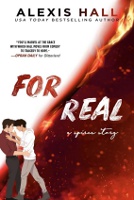
For Real by Alexis Hall REREAD
Starting in 2023, Hall has become one of my favorite authors. This is perhaps, unexpected, as he largely writes romantic novels (all with LGBTQ characters). I've never been a big one for romance, in fiction or real life, and I'm one of those asexuals who assumed for years that sexual attraction (as opposed to aesthetic attraction) was made up for fiction. Five or so years ago I fell into a romance drama TV pit after years of cutting off my own emotional life and it hasn't let me go since.
So here we are with a romance novel also centered around BDSM and I liked it enough to reread it. A scrawny young man, a would-be dom, meets an older man still struggling with the end of his previous relationship, and they form an unlikely duo, fraught with problems due largely to insecurity.
What Hall does so well are the emotions involved, realistic dialogue, and humour. His books have made me laugh more than almost anything else (equal amounts of laughter to reading Terry Pratchett or Donald E. Westlake). He also clearly loves literature, most of his books are packed with literary references, some obscure, some mainstream (the metaphysical poets get quite the nod in this book).
This is not my favorite of his books, and not the first one I'd recommend to others, but it is one of his most deeply emotional, in a way. Many of his others take a well-known romantic trope (fake dating, enemies to lovers, etc...) and breathe a terrific amount of complexity and real emotion into them. It probably helps if you're familiar with UK pop culture though. My favorites by him are Something Fabulous, 10 Things That Never Happened, and Boyfriend Material.
30mabith
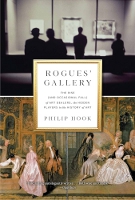
Rogues' Gallery: A History of Art and its Dealers by Philip Hook
An interesting little jaunt into the art world, and how dealers have shaped trends in collecting and, at times, artists themselves. Not the most fascinating book I've ever read, but full of interesting tidbits.
31mabith

It's Lonely at the Centre of the Earth by Zoe Thorogood
This is a graphic memoir largely covering a short period of the author's life when she seems to have particularly struggled with her place in the world, as an artist and as a person. She draws many versions of herself, who have slightly different views of the situation. Her depression and suicidal ideation is a central part of the work, so be forewarned.
The art is wonderful and captivating, but it was a hard read. This is partly due to age, I think. Thorogood is only 25, but somewhat comes across like one of those very young people who consider themselves old or haven't realized that even when they're 50 they will largely still feel 25 (until faced with actual 25 year olds, of course).
32mabith
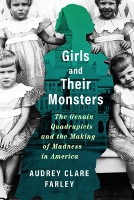
Girls and Their Monsters: The Genain Quadruplets and the Making of Madness in America by Audrey Clare Farley
As the subtitle makes clear, this is about a set of identical quadruplets. Born in 1930, all four developed mental health problems, at varying rates in childhood and teen years, diagnosed as schizophrenia. Because they were identical, the National Institute of Mental Health (NIMH), did a study on them to try to investigate a genetic origin for schizophrenia.
What was often ignored in the study are the actual factors of their home lives, with extremely controlling and often abusive parents who both treated them as a single person and but also heavily favored two of the girls. The girls' problems were often taken entirely out of the context of their lives. The book attempts a fuller picture, and also a mini-history of studies into nature vs nurture around mental illness.
The author does a pretty good job with looking at the wider picture and trying to be fair to those involved. Bringing in the mini-biographies of a couple of the main scientists involved in the research was also done well. The book felt balanced, and like it brought enough general information to make the importance of the this study (and the flaws) clear.
33mabith
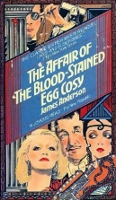
The Affair of the Bloodstained Egg Cosy by James Anderson
This is a book I looked at on the bookshelves at home for years. Age six, I thought the title was the funniest combination of words ever devised. It also had a great cover which I could not find online, and I'd meant to read it for years. I so regret I didn't specifically rescue it when we moved during my teen years.
I had been led to believe, from who knows where, that this was a spoof of a golden age mystery (it was published in 1975), but it really isn't. It does bring in a lot of classic tropes, and it has some funny aspects, but definitely not a spoof or parody.
Classically, it involves a group of people having a weekend at a large country house. There are foreign office types dealing with representatives from a foreign nation who they want to keep on-side ahead of WWII (this is set in 1937 or 1938), an American gun collector there to look at the homeowner's collection, a now-struggling girl from a formerly well off family, hidden identities, etc...
Not a mystery you can figure out from clues by reading but a great time. I'll definitely be reading the others he wrote in this vein.
34mabith
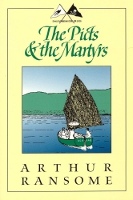
The Picts and the Martyrs by Arthur Ransome
After see Lisa (labfs39) read Peter Duck on her thread, I remembered I hadn't actually finished this series! I got anxious about 'running out' and was saving the last couple for some unknown point. I am skipping Missee Lee, as it's another fictional story written by the children vs a novel about them and I know it's going to annoy me.
In this one, the Amazons (Peggy and Nancy) are on their own with the cook, but their mother is letting them host the Ds (Dick and Dot) on their own as they arrive to pick up their own small sailboat. However, horror upon horrors, the Great Aunt has learned of their mother's absence and taken it upon herself to take charge. Nancy won't have the GA harassing their mother about her lax parenting, so is determined that they hide Dick and Dot and pretend to be perfect little ladies during the five or six days of her stay.
Banished to a shack in the woods, Dick and Dot become Picts while Peggy and Nancy are Martyrs at home. Dick and Dot, unlike the Swallows, have only recently learned to sail and have not taken care of their own cooking and such before. The book is occupied with this and avoiding the GA, but also pointing out the ways Nancy and the GA are actually quite similar. I really liked that aspect, it's something I see in a lot of people. There's this person they complain about, but cannot recognize their own behavior in. He doesn't moralize on this, or focus on it hugely but it's a classic little Ransome element and part of why I've loved these books.
These books are also, essentially, my ideal childhood, and I'm thankful I'm old enough and grew up in a rural enough place that I did get to run around on my own from a young age (though nowhere near to this extent, unfortunately).
35mabith
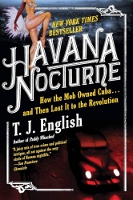
Havana Nocturne: How the Mob Owned Cuba and then Lost it to the Revolution by T.J. English
Well the subtitle really says it all on this one. It's a quick little popular history book. Not the most amazing read ever, but generally interesting, and maybe a useful addition to wider reading about 20th century Cuban history. The writing and organization of the book worked fine for me, no big complaints.
36mabith
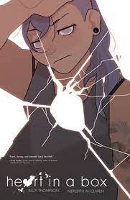
Heart in a Box by Kelly Thompson, illustrated by Meredith McClaren
This is a seven-issue comic about a woman who agrees to wish away her heart so she can stop feeling heartbroken over a past relationship. I mostly had it on my list because I'm a huge fan of the illustrator (one must support fellow Merediths). It's a nice little meditation on humanity in a way. Nothing super deep, but a fun quick read, and again, fantastic illustrations.
37mabith
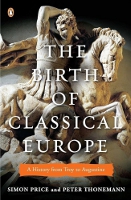
The Birth of Classical Europe: A History from Troy to Augustine by Simon Price
A generally interesting read, though it perhaps didn't do enough to justify the title, in terms of cause and effect? Not bad at all, just one of those okay historical reads. I needed something focused on the distant past, and this served well enough.
This review is probably a bit of a disservice to the book, and read at another time I might have found more enjoyment in it.
38mabith

Don't Tell Anybody the Secrets I Told You by Lucinda Williams
Williams is a musician I like a fair bit, having seen her live several times on Mountain Stage as I was growing up. Her music is quite personal, inhabiting a sort of folk country rock space, which varies a bit between albums.
She had a rocky childhood in some ways, due to her mother's struggles with her mental health and alcohol, though there were also compensations. Likewise, she had a rocky road to reasonable musical success. She comes across as a very genuine person, trying her best to understand a frequently confusing and difficult world. Her inability to stand up against her mother's family in the wake of her death really broke my heart, though I understand why. She's very honest about her own mistakes.
It's a short book, and there's often a shift in focus to how a particular song was written and the story behind it which can sometimes feel like they should be in a separate inset box of text. It was generally a good read though, if you're interested in Williams already. Some musician memoirs have a wide appeal (Patti Smith's, for instance), but I don't think this one does.
39mabith
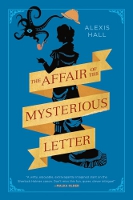
The Affair of the Mysterious Letter by Alexis Hall
This is Hall's venture into a fantasy world Sherlock Holmes pastiche and it's incredibly fun. He really captures the Watson narration tone and it's a well constructed mystery to boot.
The world building is also impressive. I don't read loads of fantasy, and the type I tend to enjoy most are historical fantasy, very character driven, with the fantasy element being less prominent. However, I didn't grow up on the Oz books for nothing, and also love a unique world that feels complete and compelling (Garth Nix being my pick for the worldbuilding successor to Baum). Hall's world and how he brought up the various countries and elements within it strongly reminded me of Jaclyn Moriarty's Colours of Madeleine trilogy, which is a major compliment.
There will be plenty of references in this I've missed, both to known fantasy novels and also to Sherlock Holmes details. I've read the Holmes novels and most of the short stories, but it's not a series or character I'm super into. Even without that, it was a great read. Hall really is the funniest recent writer I've encountered, and it's been a godsend.
40mabith
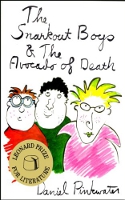
The Snarkout Boys and the Avocado of Death by Daniel Pinkwater REREAD
There are few authors I'm as devoted to as I am to Daniel Pinkwater. His books helped me hang onto imagination as a pre-teen/teen and not give into the idea of Growing Up as quickly as possible. His children's novels especially are so funny but also just smart! Also, he's a lovely man.
I've read them all so many times, and picked this up now as my "lay in bed for too long before sleep comes" listen. You can download many of his self-read audiobooks for free from his website, and he is always the best reader for them.
This is one of his rarer forays into what could be termed YA, as the protagonists are teenagers. They live in a version of Chicago, where instead of the Clark Theatre, there's the Snark, which shows a different double feature of old films every night. Our protagonists, Winston Bongo and Walter Galt, make a habit of Snarking Out, sneaking out of the house at night to go see movies. They quickly meet a headstrong young woman, known as Rat, who also snarks out and then get involved in searching for uncle, who frequently goes missing. It's an adventure, it's a meditation on the nonsense of high school, it's a comedy, it has its pastiche and Sherlock and Watson, it's a love letter to avocados and classic films. I watched so many old movies because of the ones mentioned in this book and the sequel.
Trying to adequately summarize any Pinkwater novel is an impossible task. If you have kids and pre-teens in your life, get them some Pinkwater. No one is more fun, no one encourages the creative mind more, no one else works as much art and philosophy into their books.
For anyone already devoted to Pinkwater, there's quite an interesting little book out there about his YA work (written before The Neddiad and its sequels came out), called The Agony and the Eggplant and it was a fascinating read.
41mabith
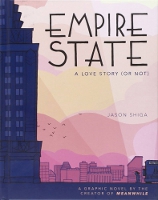
Empire State: A Love Story (or Not) by Jason Shiga
This is a medium length graphic novel about a couple of mid-20s friends. One of whom has just moved to New York City (from Oakland, CA), prompting the other to realize he may have been in love with her. He writes her a letter to say he's coming to visit and to meet him at the Empire State building and hops on a greyhound bus. She hasn't received the letter and is already dating someone.
I liked the style of it, but it was a mediocre read for me in most ways. Shiga is an author I always feel I should like more than I do because my favorite of the comic artists who came up in early 2000s (Shaenon K. Garrity) likes him, but here we are.
42mabith

What's Cooking in the Kremlin: From Rasputin to Putin, How Russia Built an Empire with a Knife and Fork by Witold Szablowski
I feel the title and subtitle of this may give a false idea of the tone of the book. In many ways we spend an equal amount of time on experiences during the Ukrainian famine and the siege of Leningrad, and the very personal stories of the cooks. There's an edition with the subtitle A Modern History of Russia Through the Kitchen Door, which doesn't quite answer either.
In any event, it's a good combination of food and history, the personal and political. There's a decent mix of horrible events and interesting little anecdotes, to keep one from feeling too overwhelmed. Szablowski lucked out with the timing of writing and researching this, as if he'd started a year or two later he wouldn't have been able to travel freely where he needed to (and I believe some of the oldest interviewees would have died).
Some sections are essentially monologues by interviewees and I sometimes felt this was jarring, the change in tone from those to the standard narrative writing. I imagine there wasn't really a better way to do it though, and I appreciated having the clear voice and personality of the subjects uninterrupted by other comments.
43mabith

Sheets by Brenna Thummler
This is a graphic novel aimed at middle grade readers. It's about a girl whose mother has recently died, her father is retreating into alcohol, and she's trying to run their laundry business herself. Meanwhile a local man is trying to sabotage the business so they'll she'll have to sign the property over to him and suddenly she's seeing the ghost of a young boy who doesn't want to face his own death.
I know I'm not the target audience, but I found it difficult to suspend my disbelief with this one. Not over the ghosts, or the shady local man. My issue was the town acting like it was totally fine for a THIRTEEN YEAR OLD to be running the business and being very rude to her when she's a little late opening after getting home from school. It was annoying while reading it when I thought she was actually a few years older and doubly annoying when I double-checked her age and found it SO young. It's a small town, not a large city, they all know her mom died and that she's largely looking after a much younger sibling as well, what the hell is wrong with these people.
I liked the art, but I almost gave up on it fairly early on due to that issue and only kept going because well, graphic novels are very quick reads and I was curious about how the ghost stuff would pan out. Not recommended.
44mabith
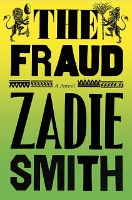
The Fraud by Zadie Smith
This historical novel covers both the very briefly popular novelist William Harrison Ainsworth, and the Tichborne case, whereby a man originally from Wapping in London saw ads searching for a wealthy young man thought to have died in a shipwreck and claimed to be him, necessitating several court trials and creating a public sensation. I found out about the book via a podcast on the case where Zadie Smith was the guest.
The novel flits around in time, starting more or less in the middle of things, with our main focus being Ainsworth's cousin/housekeeper, Eliza Touchet. Ainsworth's second wife is a keen supporter of the Tichborne claimant (absolutely a fraud), and between this and the public attention on the case, we're brought into that story.
Smith's balance of the two tales is incredibly well done, and I never found myself confused about where we were in time even with the audiobook because the people around the Ainsworths and Touchet change so much in each period. It was well read by the author herself, which was quite unexpected.
The book is touched with what I hope is Smith's trademark humor (having only read this and White Teeth. Touchet is a brilliant character to focus on (and create, to be fair, the real woman having died before the Tichborne case), and her own changes over the years seem absolutely realistic and believable. The use of Touchet might bother some readers, but it worked really well for me. Smith thoroughly recreates this period in a way that makes it seem she mostly writes historical fiction, even though this is actually her first.
45mabith
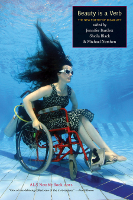
Beauty is a Verb: The New Poetry of Disability edited by Jennifer Bartlett, Sheila Black, and Michael Northen
This is a brilliant, challenging collection featuring 36 poets with a wide variety of disabilities. I'm disabled myself, and basically have been for my entire adult life after being totally healthy up to age 19.
Each poet has an initial short essay or excerpt from a speech or previously written piece and then a few poems. I marked many places, and many poems.
This is perhaps my favorite poem from it (though I've posted two others in the Poetry thread in Club Read):
The Common Core – Vassar Miller
Each man's sorrow is an absolute
Each man's pain is a norm
No one can prove and no on refute.
Which is the blacker, coal or soot?
Which blows fiercer, gale or storm?
Each man's sorrow is an absolute.
No man's sickness has a synonym,
No man's disease has a double.
You weep for your love, I for my limbs—
Who mourns with reason? Who over whims?
For, self-defined as a pebble,
No man's sickness has synonym.
Gangrene is fire and cancer is burning.
Which one's deadlier? Toss
A coin to decide; past your discerning
Touch the heart's center, still and unturning,
That common core of the Cross;
You die of fire and I of burning.
“I think the way I approach translation is the same way most translators do: crumple the original poem into a tiny wad, chew it for a while, spit it out, unwrap it, try to pat is down as flat and neat as possible.”
John Lee Clark – from Translating and Reading ASL Poetry
“Like the male gaze, the medical gaze doesn’t exist discreetly in the human eye, but as a sort of collective eye. A cultural peeper. The medical gaze, leering ever pointedly since the end of the nineteenth century (see Foucault), works two ways: 1.) it reveals things about you that you yourself did not know, and 2.) if it cannot see your illness, your symptoms don’t exist.”
Danielle Pafunda – from Meat Life
“Nothing I've said in this essay changes the fact that I also perceive my illness as a terrifying constraint: physically limiting, but also psychically limiting when fear of the future takes hold of me. But by thinking of chronic illness as a language, I can become engaged in an observation of what fluency might mean, the fluency to speak in a language entirely different from my body's language of health. I can then try to use words to communication this fluency, recounting my experience of body, of this opening to what is the altered or increased or dispersed perspective that illness provides or simply stimulates. But words are the second order of speaking in my body, through my body, and I have to be sensitive to the histories that each word calls forth, the traditions, which will reflect meaning in a different way than a healthy body would recall them, or understand them. I've discovered that the body is a surprisingly “elastic” medium for appreciating, for translating the languages at its disposal. Perhaps there are more than these two—the body's language of health and of illness—but these two are where I begin.”
Rusty Morrison – from To Saturate the Matter of the Present
46bryanoz
< 40 Thanks Meredith for reminding me about Daniel Pinkwater's books!
I really enjoyed his creative writing and zany characters and haven't read any for years, will find The Snarkout Boys and others I haven't read, thanks again:)
I really enjoyed his creative writing and zany characters and haven't read any for years, will find The Snarkout Boys and others I haven't read, thanks again:)
47scunliffe
>44 mabith: Thanks for these comments on The Fraud. When a well established author comes out with a new book there is so much hoop-la generated by the publishers that I think reviewers in good periodicals tend to be over favorable. So I have learned to discount those reviews which can often disappoint. I prefer to read the thoughts of experienced readers outside the industry.
So in this case I will add The Fraud to my list
So in this case I will add The Fraud to my list
48mabith
>46 bryanoz: He's always worth catching up to! I need to re-read his The Neddiad trilogy (which came out 2006-2010). I remember being happy he'd returned to some similar themes as Alan Mendelsohn, the Boy from Mars (particularly in the third book of that trilogy), which is the one that absolutely reignited by brain at age twelve.
>47 scunliffe: Publishers often shoot themselves in the foot in that way. We know Zadie Smith is well-regarded already, they'd be better off giving the basic points, mentioning the most unique point (the narrative structure), and letting people go into the read relatively blank. I certainly find the average LT review more helpful than anything in a professional publication.
>47 scunliffe: Publishers often shoot themselves in the foot in that way. We know Zadie Smith is well-regarded already, they'd be better off giving the basic points, mentioning the most unique point (the narrative structure), and letting people go into the read relatively blank. I certainly find the average LT review more helpful than anything in a professional publication.
49mabith

Adventures of a Dwergish Girl by Daniel Pinkwater
When I was looking up dates on the previous Pinkwater re-read I noticed a couple more recent books I hadn't read yet and obviously had to start catching up.
Dwergs are a dwarfish race secretly living in the Catskills. Some adventurous or bored dwergs go to regular public schools, and Molly O'Malley is one of those. Unwilling to become a typical Dwergish girl with all the weaving and cooking, she decides to move to the human town, where she gets a job in a pizza place and starts seeing a lot of ghosts around. There are trips to New York City, consulting a magical king about the ghosts, and a plot to steal the Dwergish gold to foil.
It's not Pinkwater's best work, but there are some fun little details. For the curious Pinkwater fans, my favorites of his 21st century works are The Artsy Smartsy Club and Adventures of a Cat-Whiskered Girl.
50mabith
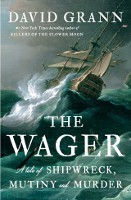
The Wager: A Tale of Shipwreck, Mutiny, and Murder by David Grann
I'm partial to a ship voyage book and by extension shipwreck and mutiny stories as well. For one, you really feel grateful to be alive now with no danger of impressment and able to get around the world in a faster, safer, and more pleasant manner.
This one wasn't my favorite of the genre, but it was well done, written clearly and fairly compellingly. Unfortunately, I was greatly looking forward to the court case against the mutineers and that was incredibly anticlimactic and minor.
I was in my local independent bookstore (where I used to be assistant manager so I have a Lot of Opinions about how things are done), and this was book was in the True Crime section... Which, you might as well put most of the history section in there if that's how you're arranging things.
51mabith
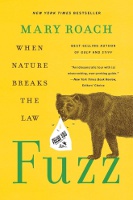
Fuzz: When Nature Breaks the Law by Mary Roach
I'm a general fan of Roach's non-fiction, where she just explores a lot of little related or semi-related topics to her heart's content. She's really found a great way to do one thing but have an incredibly varied life.
I picked this one for my book club to break up all the murder focused and Sad Times books that got chosen, and I was surprised how much discussion it inspired, though it may have had the side effect of making people more nervous about bears than they need to be (one of the suburbs of my city has had a lot of bear sightings lately).
As usual, Roach skips around topics and continents, and one of the more interesting aspects are the cultural differences in how we deal with 'problem' animals. I do wish she'd had a section on historical animal trials (she mentions a few very briefly), as that's always quite fascinating and usually very funny. It's not my favorite of her books, but an enjoyable read.
52mabith

Hidden Valley Road: Inside the Mind of an American Family by Robert Kolker
Carrying on from Girls and Their Monsters about the Genain quadruplets, it's another family where the children have a high occurrence of schizophrenia and how their story fits into the larger narrative of schizophrenia research and mental health treatment in the US generally. There are twelve children, and six of the ten boys are eventually diagnosed with schizophrenia.
It's very well written, and I think does a good job at refraining from judgement of all parties while presently the difficult realities of their lives and how this fact has impacted both the well and sick siblings. The oldest child, Don (also the first to show symptoms) is twenty years than the youngest, and these wide age gaps also contribute to many difficulties given the sheer number of uncontrollable kids (and the parents not bothering to try to control them all that much either).
53mabith

After I Died, I Became Popular Again - Zuo Chuanchuan
Mostly I've not posted about the re-reads of Chinese webnovels I've been reading, partly because they've been particularly silly ones lately and of little interest to anyone who isn't me. This is a new-to-me one though, and moderately less silly.
This is a transmigration-into-a-novel one, though unusually it's a couple of ancient people going into a modern dogblood novel (the plot of which involves the baby of a rich family, Qi Linqing, being switched out and growing up very poor in the countryside and the false young master getting everything good in life). More usually you have modern folks going into ancient settings. However, now a famous ancient painter is inhabiting Qi Linqing and he doesn't want any part of the drama. His previous apprentice has also transmigrated, into a classmate, and gradually suspects that the other is his master.
There's much face-slapping of the entitled false young master, and perhaps more detail about traditional Chinese ink painting than I needed in my life. I think the author must do it themselves, or else is just very convincing at bullshitting. It was a fun read, without big conflicts, and the interactions between the master and apprentice were very amusing.
It's interesting that transmigration-into-novel is now such a common trope that some authors don't bother to justify why the transmigration happened, which is a bit of a shame. A fair few involve the author maliciously sending a reader into a book after they've made negative comments or rejected it as a publisher (though the majority are just 'I Stayed Up Too Late Reading and Now I'm in the Book' - it's a lesson to us all).
Unrelated, my favorite novel-setting book has this premise allowing the main villain access to the entire work: “Due to an overabundance of plot holes, this story has been rejected by its readers. Thus, the most popular character among the readers has been selected to personally verify the story’s consistency, and make suitable changes.”
54mabith
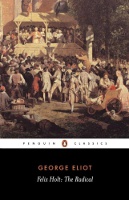
Felix Holt, the Radical by George Eliot
And now for something completely different...
I've been putting off reading this, as it's my last Eliot novel and I adore her work SO much. Her writing style, her humor, and her absolute grip on the psychology of her characters is just joyous. It's everything I love about Victorian novels.
One aspect of many of her books for me is also that I can't quite predict what will happen. There are numerous paths that seem possible (and plenty that seem impossible of course, given the times), and you're not sure until the very end what she'll choose. This is so rare with older novels. It doesn't necessarily make it better for me, I know where Elizabeth Gaskell's books are going, but love them to pieces regardless, but not knowing does make for an interesting reading experience.
This novel was one of her less successful for me. The pacing just doesn't seem right, like perhaps it should have had a whole extra volume inserted towards the end. The reveals that happen (to the characters, the reader can be aware) are so late into the book and it feels like the main one is an afterthought. The writing is still impeccable and deeply enjoyable, but it felt lacking compared to almost all her other novels. Perhaps this is because the previous work, Romola, was not a success at the time and impacted how she wrote this one. Our titular character Felix simply doesn't feel like a main character in the way he ought to, and he's far less developed than either of the other main characters.
It's a bit of a shame I didn't save Middlemarch to be my final Eliot read perhaps. I am thankful that I love to reread books, however, and I will enjoy revisiting some of hers in the future (just not this one or Silas Marner).
55pamelad
>25 mabith: I like Margery Sharp because she's dry and witty and likes her characters. And her books are short! Barbara Pym is also worth trying.
>32 mabith: Added this to the wish list.
>32 mabith: Added this to the wish list.
56mabith
>55 pamelad: That's such a good way to describe Sharp, that she likes her characters. That absolutely shines through. I'll definitely be reading more of her adult work.
57mabith
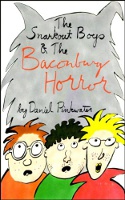
The Snarkout Boys and the Baconburg Horror by Daniel Pinkwater
After rereading the first one I had to complete the set. Like the first, there are SO many fun elements in this book. The teens discover a dark coffee house with terrible poetry and folk music (haven for teens of any era), there's a werewolf loose, Wallace Nussbaum is back, and Pinkwater has predicted the future with his Japanese pizza robots at the Garden of Earthly Bliss Drive-In and Pizzeria.
As ever, a great ride, many literary and historical allusions, and yet another mystery food which is never fully described but makes one deeply hungry (borgelnuskies).
58mabith
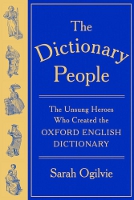
The Dictionary People: The Unsung Heroes Who Created the Oxford English Dictionary by Sarah Ogilvie
A nice little non-fiction read by a former OED editor, looking particularly at the volunteer contributors who are often overlooked (but only going into the main leaders of the project).
Good read for me, if the idea appeals to you I think the book will as well (does what it says on the tin, and all). Ogilvie and her helpers put in an extreme amount of research tracking people down after finding James Murray's address books of contributors.
59mabith
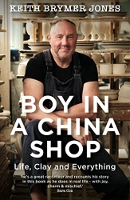
Boy in a China Shop by Keith Brymer Jones
There are a variety of creative competition shows which sort of spun-off from the popularity of The Great British Bake Off (all of which I basically prefer, because I love a handmade thing that's also usable), including The Great Pottery Throw Down. Jones is a judge on the show (the only one who has stayed for all the seasons of it), and became well known for crying and generally getting incredibly emotional over the work of the potters. He will tear up at least twice every episode. It seemed so ridiculous when I first started watching the show, but now I'm almost 40 and I tear up at the drop of a hat as well so it's become more endearing.
Surprisingly to me, Jones actually picked up pottery and stuck with it from quite a young age. Other than joining and being pretty serious about a punk band, pottery was really his life. He joined a working pottery right out of school and spent three years on apprentice grunt work before being allowed on the production line. When that business decided to move to Scotland, he set up his own studio and proceeded to nearly work himself to death.
It was a good read, and nice to get his full story in pottery. Amusingly, I had heard of the punk band he was in, The Wigs, and their big song was on a compilation of 1980s UK punk. Was very surreal to find out that was him.
60mabith
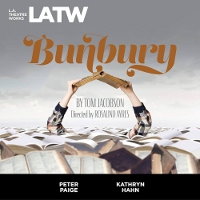
Bunbury by Tom Jacobson
"What if... Romeo & Juliet had a happy ending? Or Blanche Dubois didn’t go crazy? Or the Three Sisters actually made it to Moscow? When he discovers he’s only a fictitious, never-seen character in Oscar Wilde’s The Importance of Being Earnest, Bunbury joins forces with Rosaline, Romeo’s never-seen obsession from Romeo and Juliet. Together they infiltrate and alter classic literature."
This play had a wonderful premise but couldn't quite live up to it or make full use of it. How any of this play travel works, how they figure out what play they're in, how they get a hold of the scripts, etc... is never gone into. The main point of it is the writing and a lot of in-jokes as long as you recognize the plays. Jacobson's writing in the style of Wilde was particularly fun. If you don't recognize the plays, or don't know them well, you're a bit stuck. I've read Who's Afraid of Virginia Wolf but decades ago, and while I knew that's the play we were in I couldn't remember anything about the plot and had to look it up.
It would be a fun live performance to attend, particularly if one took the time to reread all the referenced plays beforehand, but I don't know that I particularly recommend it as a solo read/listen (or if so go into it with low expectations).
61mabith
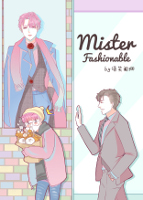

Two weeks ago we had a tornado in my area, which is very unusual here in WV. 90 mph winds, and 36 hours without electricity. It's not that long, but when you only have an electric stove and live in a fairly dark house it does FEEL long. The morning of the tornado I also went out and found I had a flat tire out of nowhere, so I couldn't seek electricity at friends' houses either, so I was forced to bury myself in re-read comfort (and now I've had to buy two new tires as the flat couldn't be fixed and that's just not fun on a fixed income.
Now you get the Chinese re-read round up!
Mr. Fashionable by Yu Xiao Lanshan 语笑阑珊
Gluttonous fashion model/actor runs into director of a company he'll be working with when he's in disguise to eat, director falls in love with him, very very silly book, very very silly main character (what the Chinese netizens would call a husky type - which has been decided to be the silliest dog for reasons that are mysterious to me but probably related to amusing meme pictures).
Rebirth of a Movie Star by J112233
This is another classic genre in the Chinese webnovel world - the rebirth novel. The main character dies relatively young and then finds themselves transported ten years or so back to the past with all their knowledge of the later years. This one features an unlucky actor who was used as a bank by his brother, has a very rocky career due to scandals related to that, and then is pushed into a heart attack when his partner, after pushing him to come out as gay, uses the backlash to crush his career and announce his marriage to rich woman. Going back, he decides to accept being the company boss' kept lover to avoid the complications of his brother's debts and the relationship becomes real (the boss was there when he died and was very distraught, so it wasn't out of nowhere). I don't know why this is my go-to comfort reread, but the main character is very appealing and there's an amusing child in it.
How to Say I Love You by Feng Liu Shu Dai 风流书呆
Neglected younger child of a wealthy family comes home, isn't allowed to join the company despite excellent achievement, mother pushes him into acting. Has conflicts with a star actor who judges him harshly, star actor is in car accident that leaves him able to read minds, realizes he's misjudged the other man and is woken up to how little he seems to know the people around him. A more thoughtful, less silly one.
62mabith
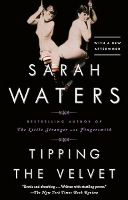
Tipping the Velvet by Sarah Waters
This is only my second Waters read (previously read The Night Watch), just one of those hundreds of contemporary authors I kept not getting to.
We're thrust into the late Victorian period and Nan Astley, a working class girl, falls into love with Kitty Butler who is a 'masher' or male impersonator at music halls. Kitty returns her feelings (though with more guilt and anxiety over the illicit nature of their love) and Nan follows her to London to serve as her dresser before joining the act. Her life has many ups and downs and she reels through three distinct phases and modes of life after moving to London.
I had to take several longer breaks in this reading because I was getting a little too upset about what was happening to Nan and some of her choices, but it was a good read with a good balance of humor. If you struggle with unlikable protagonists, you might struggle with Nan. She frequently doesn't do herself any favors.
63mabith
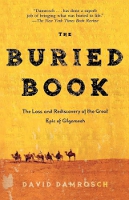
The Buried Book: The Loss and Rediscovery of the Epic of Gilgamesh by David Damrosch
An interesting read that I perhaps wasn't in the right headspace for. I think I was particularly stressing out about car repairs when I was reading it, so the epic and world of Victorian archaeology was less diverting than usual.
This book covers the epic, Ashurbanipal, who was one of the last kings of Assyria, and particularly George Smith, a self-taught Assryiologist from a working class background whose many discoveries were often pinned to other more aristocratic or traditionally educated figures. It's another brick of the wall of my dislike for E.A. Wallis Budge (who appears in the Amelia Peabody mysteries by Elizabeth Peters, and probably in some other non-fiction I've read).
The territory he wants to cover is a pretty big ask for a relatively short book, so maybe it's not totally my fault I wasn't as into it as I'd expected to be. I did enjoy it though and now feel permanently aggrieved for how Smith was treated.
64mabith

After Marrying the Villain I Became Popular by Gan Hui 甘洄
More transmigration into a novel as I was continuing to not get my car dealt with at this point, but it's not a re-read this time.
This represents the subgenre of transmigration where the transmigrator is someone who was extremely ill in the real world and had a really narrowed down life, so now they get to be healthy. As someone with disabling chronic pain, this certainly appeals.
Xia Wan is the cannon fodder ex-toy of the novel's protagonist, but of course the new Xia Wan, finding himself at the protagonist's engagement party grabs a new target to protect him, not realizing it's the protagonist's brother who becomes the main villain of the book. It's one of those where the 'villain' has reasonable complaints and is just driven to extreme action, vs actually being a villain so of course love saves him etc... (the actual evildoers still suffer). This is quite a well done one, with a more advanced plot than most, with numerous elements not present into the novel the original Xia Wan read because they only related to him and he was just a side character.
Part of what keeps me in the Chinese webnovel scene is the abundance of funny queer novels without too much drama, and often set in queer-norm worlds (the f/f ones tend to be more heartbreaking, barring a few, so I do end up reading fewer of them, I need to limit the heartbreak).
65mabith
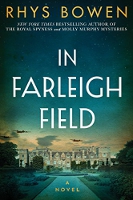
In Farleigh Field by Rhys Bowen
Not a good read and gets worse the more you dig into it. This was selected for my book club, and had so many flaws. The author has published far too many books for some of these things to still be slipping through.
There are whole side stories that had absolutely zero impact on the book as a whole and could have been cut without anyone noticing and there were numerous little bits you think will lead to something and they're just never mentioned again. The premise is during WWII a parachutist is found dead in a small village and thought to be a spy due to wearing an older variant of a uniform and badge. It's billed as a mystery but written as a social novel, the pacing is very odd, there's little concern for the mystery or spy until the very end. The villain is flagged pretty clearly at the beginning to the extent you think 'oh, probably a red herring' but no, he's the end villain and it ends incredibly anticlimactically.
If it were just a social/character novel set in this period it would be better (though still not for me). You have three childhood friends, one of whom, Jeremy, was in a German prison camp and has escaped and come home. Just before the war he crashed a plane due to recklessness, injuring another friend Ben, so that he can't serve in the military and joins MI5 instead. Then there's Pamela, daughter of a lord who is working at Bletchley, and deeply in love with Jeremy (Ben is in love with her of course). The book goes back and forth sometimes acting as if she and Jeremy are dating and sometimes that it's unrequited, it's quite odd. Ben is there to halfheartedly investigate the spy, Pamela is there to see Jeremy. There are a million side characters.
Not recommended for anyone.
66bryanoz
>62 mabith: Hi Meredith, Sarah Water’s Fingersmith is one of my favourite historical fiction reads, I also enjoyed her The Little Stranger and The Paying Guests. No new books from her since 2014 sadly, happy reading!
67mabith
Thanks, Bryan! Fingersmith is probably the next I'll read by her. I found the characterization in The Night Watch a little too thin, which I think is part of why it took me so long to pick up another by her.
68mabith

Tattoo by Bu Wen San Jiu REREAD
One of the relatively rarer Chinese webnovels where the main characters are both proper adults (a lot of the less prolific writers are quite young). One is a college professor, Xiao Ke, who happens to share a table in a bar with a tattoo artist, Zhou Zui, while celebrating his birthday alone. Zhou Zui gives him his card, neither thinks much of it, but then Xiao Ke's friend wants to get a tattoo so they call in the nominal favor and the two grow closer. Xiao Ke is the optimistic sunshine type, Zhou Zui is quiet and pessimistic, with a difficult past. He doesn't want to let Xiao Ke in but also can't bear to shut him out. Fairly simple, fairly short, but nice little novel with a minimum of nonsense and good supporting cast.
69mabith
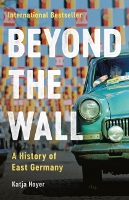
Beyond the Wall: A History of East Germany by Katja Hoyer
Does what it says on the tin! This was a great read, and there's a strong focus on counteracting our common misconceptions of the state and the period that is greatly needed (particularly in reference to reunification perhaps).
Hoyer manages to include a huge amount of detail without making it feel too overwhelming or like you're missing the human story. My only complaint really was that I happily would have read an even longer and more detailed work.
Highly recommend this one.
70mabith
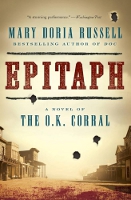
Epitaph by Mary Doria Russell
This has been on my to-read list since it came out in 2015, because I loved her book Doc so much. I do think I preferred that one, but Holliday is just such an interesting character.
This novel covers Josephine Marcus and Wyatt Earp mostly during their time in Tombstone (and their extended circles of course), but it also carries on past where the romantic novel version of their lives would end (aka where the movie Tombstone ends) and through the ends of their lives. I don't feel I know enough about either of them to comment on the historical accuracy, though I imagine it's far more accurate than the aforementioned movie (fun as that one is).
A good read, though perhaps not one that will live in my head for any extended period.
Editing to add this amusing quote from the book:
John Clum was not a callous man. He was a newspaper man, which is similar but not identical.
71mabith
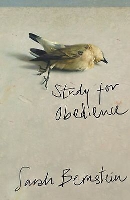
Study for Obedience by Sarah Bernstein
This one is going around LT, and it's a bit nice to feel part of a reading pack. Though from descriptions I knew it probably wasn't going to be a book I absolutely loved, the opening quote from it in Dan's review intrigued me, so here we are.
I enjoyed the writing, though struggled with the narrator's contradictions, the time period things were supposed to be happening, sudden mentions of Microsoft Teams, etc...
Still, glad I read it anyway (what's the point if you're only reading fiction you're already sure you'll love), and I'll take more from the other reviews of it on LT now.
72mabith
 .
. 
Ignition! An Informal History of Liquid Rocket Propellants by John Drury Clark
This was first published in 1977 and was recently republished in 2018. I'm not sure if there were any changes between the two editions, but if so I don't think it would have been much. The original cover is so much fun and I think they missed out by not having a new cover with a similar vibe (also I don't think Clark, who died in 1988, would be happy about an Elon Musk quote on the cover, even 2018 Musk I think Clark would have found a first prize ass).
My scientific interests don't extend hugely to chemistry, but it's been a while since I read some harder science and this guy made me think of my granddaddy. They did live in the same county in New Jersey for a decade between the 1950s-60s, Clark coming up with liquid rocket propellants and my granddaddy at Bell Labs writing technical instruction manuals for missiles and such. Granting, my granddaddy wasn't one for chemistry outside of what you need for developing photos but this book might have convinced him that it wasn't as 'cut and dry' (his own words) as he thought.
The book is absolutely technical, but Clark gets a good bit of humor in it as well. He perhaps overuses the phrase 'scared me to death' but given what he's working with, I suppose that's normal. Will I retain lots of information from this read? No. However, if hypergolic or thixotropic come up in a quiz, I now know what they mean and they were key enough points that my memory should keep track of them, so it's a win.
73mabith

Dark Archives: A Librarian's Investigation into the Science and History of Books Bound in Human Skin by Megan Rosenbloom
I've entered that stage of life where quite a lot of the books I'm reading (of this memoir/popular history ilk especially) are written by people essentially the same age as me and it still feels a bit startling.
The subtitle says most of it. Rosenbloom is a medical librarian, though also has a bachelors in journalism which no doubt helps make the book very readable. She works for a group who test books suspected to be bound in human skin, and some of the chapters revolve around that work and others about the people doing the binding, the reasons for it, misconceptions, etc...
It's a good read if you're interested in the topic. Obviously medical ethics is a strong part of this work, given that the creation of these books is weighted towards doctors in certain periods. Ethics of ownership comes up too, with varying beliefs about what should be done with these books.
I feel like I was expecting a bit 'more' from it, but I'm not sure what that would have looked like. Sometimes I think it's just a current reading mood I'm in lately that the popular history works have lost some of their appeal (compared to more in-depth histories).
74mabith

I Can Do It - Jiang Zi Bei REREAD
I started this reread on my recent train trip and forgot it was only nearly finished for a bit. The trip was largely for the scenery from the train (Charleston WV to Staunton VA, easily one of the most scene eastern Amtrak sections), so I found I really couldn't read print while on the train, except for periods when the sun was directly coming in the window so the curtain had to be shut. Even then I was mostly looking out the other side's windows. My thought of romantically reading Elizabeth Gaskell while on a train was also thwarted by just being too tired/in too much pain to concentrate on a new-to-me read with lots of antique dialect (fabulous trip though, gorgeous journey and Staunton is a classic fun little college town).
ANYWAY, this is a pro-gaming novel centered around the actual game, League of Legends (which seems a particularly tedious and uninteresting game to me which was created perhaps with pro-gaming in mind). It's an exceptionally funny one, and worth having to skim through game play sections. The characters and their interactions are so amusing and feel quite realistic. I probably annoyed my friend by chucking constantly when I was reading it in the hotel room.
The plot is focused on a teenage boy working as a game streamer known for his trash talk changing over to play professionally partly out of spite for people who say he can't and partly because of his admiration for the team's captain.
75mabith

Revolution: The History of England from the Battle of the Boyne to the Battle of Waterloo by Peter Ackroyd
Now for something completely different... This is the fourth of Ackroyd's big History of England series (starts with Foundation which is the only other one I've read). They're A Lot in terms of detail and the span of time they can cover, so probably only suitable for those really into their history.
This period is one where I've read or learned about specific events (Trafalgar, war of Jenkin's Ear, the American revolution, various aspects of the French revolution etc...), but not the wider scope from the English perspective. It was good to fill in some details.
Good reading for me, and I'll have to get to the two books in the middle this year. I hadn't really realized they were part of a sort-of series until I was looking up something about this book.
76mabith

Hands of Time: A Watchmaker's History by Rebecca Struthers
This is another memoir/popular history mixed work where the author is just my age. What have I been doing with my life, I could be a master watchmaker by now!
Struthers does a good job with this one, alternating between her own story, wider clock and watch making history, the history of specific famous watches, etc... She finds a good balance between all that, and did make me interested in finding a book more exclusively focused on horology.
77mabith
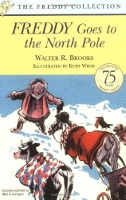
Freddy Goes to the North Pole by Walter R. Brooks RE-READ
Potentially my least favorite of the Freddy books I've read (and I have read most of them), and for what seems like a silly reason. At this point in the series, Brooks hadn't yet made the animals able to talk to humans. They could speak to each other and understand humans but didn't speak to humans. This didn't change until the fourth book in the series.
My trouble with the North Pole is that Santa is a character and they get stuck at his workshop for a while which pirates have sort of taken over but with sort of good intentions? It's a bit all over the place generally. Now, I think even as a kid (we did not have this one in our library) Santa being involved would have bothered me. I don't remember ever 'believing' in Santa, as much as my older siblings tried to inculcate that in me and people dressed as Santa hugely frightened me due to the fake beards. My parents and our circle were back to the land hippies, there were a lot of long beards, so fake ones were just alarming.
One could say Santa is no less plausible than a talking pig who can dress up and pass as human in certain conditions but to my brain they are in different leagues. This is part of why I've avoid a few of the later books in the series (Freddy and the Men from Mars and Freddy and the Baseball Team from Mars most notably...).
In general, however, the Freddy books are great fun and I highly recommend them. They still make me laugh loads as an adult reader and we absolutely adored them as kids. Brooks has a great way with making believably flawed characters, and pointing out those flaws in a way that says "we're all imperfect and that's okay" rather than "this is a moral failing!"
78mabith
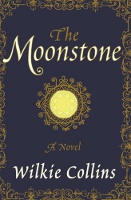
The Moonstone by Wilkie Collins
In a general way, I'm a great lover and defender of Victorian novels. It's heartbreaking that people stereotype them as boring or purely moralistic. The Moonstone certainly strengthens my love for the period even more.
This is such a well-balanced work. It's very funny at times, but also the setup is clever and interesting, the mystery does hold your attention, you are trying to work out what's happened along with the characters. Then the characters themselves, even the ones leaning into stereotypes, feel believable. The book also leaves with some minor mysteries, just enough to keep you thinking about it, not enough to be annoyed you never got a firm answer.
I hadn't read anything by Collins before, and now I'm eager to get to his other works (particularly as I've now read all of Eliot's novels and only have one Gaskell novel left).
Highly recommended.
79mabith
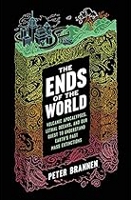
The Ends of the World:Volcanic Apocalypses, Lethal Oceans, and Our Quest to Understand Earth's Past Mass Extinctions by Peter Brannen
As usual, I have veered as far from a classic novel as possible, in part to help create a buffer before starting The House of Mirth.
I slightly regret going into this subject with a science journalist rather than a scientist. This one felt well done but more and more I wonder how much in these popular science books is over-simplified to the point of uselessness (yet my lack of knowledge means I can't spot that). On the other hand, this is what's accessible to the layreader. It's a quandary.
Having just finished a lecture series on geology, it did seem a good time to pick this up, when some extra knowledge was hopefully still in my head. As I say, there were no massive red flags that I could spot in this one with regards to accuracy and I think Brannen does a good job confronting some of the assumptions we make or the many unclear areas. I like to think I'm a reasonably critical reader in popular non-fiction in general, but I find that easier with history.
The writing is well done, the subject is interesting. The relevance to climate issues today felt stretched or shoe-horned in at times, like perhaps Brannen just wanted to focus on the past events but was told to tie them into now more. A good read if you're interested in the subject.
80mabith

Gentlemen of Uncertain Fortune: How Younger Sons Made Their Way in Jane Austen's England by Rory Muir
Certainly does what it says on the tin. If this were covering the 17th century half of them would be off the New World of course, but in the 18th century they're studying law, medicine, going into the church, and joining the army or navy.
It's not badly written at all, and I think Muir chooses his examples really well (one of Austen's brothers is often used), but it was not as engaging as I'd hoped. I think the title and cover make one expect a little more humor, though this is perhaps my own issue due to having read so many humorous history books in the last few years.
I can see this book being a really useful volume for fiction writers. Maybe one to pick up only if you're particularly interested in the period, or trying to understand a veer your ancestors took. Any of mine who were younger sons of better families were definitely already in the Americas, robbing me of the chance to see all my favorite comedians in person now. Quite rude of them.
81mabith
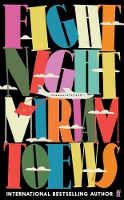
Fight Night by Miriam Toews (pronoun Taves)
Now here was an engaging work! I'd particularly recommend the audiobook, read by Toews daughter, which really adds to the mood and feeling sucked into this little family.
“You're a small thing,” Grandma writes, “and you must learn to fight.” Swiv's grandma, Elvira, has been fighting all her life. From her upbringing in a strict religious community, she has fought those who wanted to take away her joy, her independence, and her spirit. She has fought to make peace with her loved ones when they have chosen to leave her. And now, even as her health fails, Grandma is fighting for her family: for her daughter, partner-less and in the third term of a pregnancy; and for her granddaughter Swiv, a spirited nine-year-old who has been suspended from school. Cramped together in their Toronto home, on the precipice of extraordinary change, Grandma and Swiv undertake a vital new project, setting out to explain their lives in letters they will never send.
This book has a lot of elements of Toews own family and their history in it. Her parents were both part of the Kleine Gemeinde, a Mennonite group formed in 1812 in what was then the Russian empire (present-day Ukraine), from the group that settled in Canada. Toews' father and older sister committed suicide, as do Elvira's husband and daughter in the book (Toews' mother is also named Elvira).
I loved Swiv, her mother, and grandmother so much. They are incredibly alive and real almost immediately. There are many books aimed at adults but narrated by children, not all of them successfully capture the child's voice yet maintain the balance of an adult work. Toews succeeds here, in my opinion.
While at times Swiv feels older than nine you can see why, given how her mother and grandmother are. She is full of love for them, fears for their safety, but of course is also deeply embarrassed by them on a continuous basis and isn't quite old enough yet to be inured to it. The dialogue and each character's vocal quirks were particularly well done. I could see so much my nine-year-old self in Swiv.
This may be a book you'll either love or hate. I can imagine some readers having trouble with Swiv and perhaps the sequence of certain events, but it worked from start to finish for me. This was the only book in my book club's recent picks that I was excited about and I'm so pleased it lived up to expectations. I read it all in two bursts yesterday (it's quite short). We meet to discuss it tonight and finally I don't have to go in full of "here's a very mediocre book that everyone else liked much more than me" feelings.
82pamelad
>80 mabith: I found Gentlemen of Uncertain Fortune interesting because I've been having an extended historical romance binge, but there was a chapter or two where I got bogged down in the details. As you say, it would be useful for writers of historical romances. Any research would!
83mabith
>82 pamelad: Yes, I think it was the chapters on army and navy commissions that perhaps got to me particularly (and that was towards the end).
84mabith
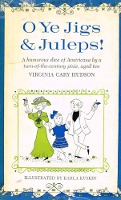
O Ye Jigs and Juleps by Virginia Cary Hudson RE-READ
I was in a nostalgic mood last night so re-read this before bed. This was a mainstay of my childhood, I adored it so much. My dad would use it for bedtime stories when he was feeling lazy (he was a professional storyteller so mostly we wanted a Proper story from him, not being read to). Also, after my parents divorced he started going to the Episcopal church and maybe thought focusing on these essays would make me less resistant to going (you can't take nine year old who has never regularly been to any religious services and expect them to instantly be happy to start going every other weekend when clearly it wasn't important to you before that).
They are a series of school essays on various topics purportedly written by the ten year old author in 1904. When I was a kid it was common knowledge, in our family at least, that this was just a construct but Wikipedia is certainly treating it as fact...
...here came that Tim Summerfield, acting smart with a new fifty cents for his birthday to buy paint for his bicycle. He is one of those Presbyterians and I thought of something. I said, "I bet you twenty-five cents the Presbyterians believe in procrastination" and he said they didn't and I took him up to Dr. Briggs' house. He is their preacher. And I told him what I wanted to know. And he said the Presbyterians sure did believe in procrastination and the pledge cards proved it. And I asked him if he had change for fifty cents and he said yes, and I got my twenty-five cents... and Tim ran home crying and his mother called my father's office and said if he wasn't careful he would have a gambler on his hands, and he said it looked like he already had one, and she said gambling was terrible, and he said it certainly was when you lost, and he gave me twenty-five cents to take to Tim with a can of paint for his birthday, and he didn't even thank me.
Oscar Sargent bet me my whole bag of gum drops that Miss Nelly McDonnell's cat couldn't scratch himself out if we buried him. I bet he could. But if he could, he didn't. Oscar says to me, he says, "What do people do with dead bodies?" And I said to Oscar, "they tie rocks on them and throw them in the river." And Oscar says, "but we don't have a river." And I said, "Mr. Hamilton has the biggest, deepest cistern in town." And now if Oscar says I told him to put Miss Nelly's tom cat in Mr. Hamilton's cistern, he is just adding up 2 and 2 and getting five.
Etiquette is what you are doing and saying when people are looking and listening. What you are thinking is your business. Thinking is not etiquette.
The book ends with:
PS Mrs. Dixon, if you conscience won't let you give me an A how about a B. If that woman keeps on giving me a zero in deportment, I will simply have to see the bishop.
That's the drift anyway. It was originally published in 1962 and was on bestseller lists for ages. Again, I don't believe these were written by Hudson at age 10. They were published after her death by Hudson's daughter who had made copies not long before a house fire destroyed the originals (quite convenient). The daughter defended the authenticity of the essays strongly, but she would, given the financial interest. In the end, it doesn't particularly matter, it was just strange to see it all taken at face value after growing up 'knowing' that the essays were either written by Hudson at a later date as reminiscences (most likely to me) or written by her daughter based on stories she'd been told.
I still love the stories, they still make me laugh, and they still bring me comfort.
85mabith
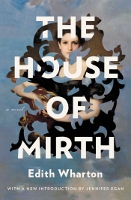
The House of Mirth by Edith Wharton
My first Wharton! Dan gave a great little summary on Wharton's books and where might be good to start on his thread, which was very helpful.
It did feel like such a departure from my 19th century reading, even though the story is set right at the end of it and the book was only published in 1905. I'm sure this is partly cultural, the higher social tiers in the US operating differently than those in the UK where most of my 19th century reads spring from (there was a book covering some of the major high society differences I read last year, The Husband Hunters).
The book focuses on Lily Bart, who was well-born but has become impoverished after her father's financial failure and the death of both her parents. She has been raised to be a social ornament, and to avoid 'dinginess' yet has to rely on friends and acquaintances so that she can stay decently dressed and act largely as the other ladies do.
There is a constant struggle between what she knows she must do for her own interests and versus what she might actually want and her own morals. There is a man of good standing who she could marry but her vision of the future with him and perhaps her own reluctance to inflict this loveless action on an unknowing party causes her to hesitate. Her actions are frequently misunderstood but she has no way to plead her case without harming others.
Throughout the book I was begging for Lily to fully confide in someone, to overcome her own nature, or at times or own scruples, to secure herself an easier life. She is brilliant but she is trapped by her own upbringing and by the way society functions. She's constructed so fully and realistically, with all the flaws and strengths of any average person, and I grew to really care about her as the book went on. Wharton grasped the psychology of her character extremely adeptly.
She broke my heart a bit, but I'm looking forward to reading more Wharton.
86mabith
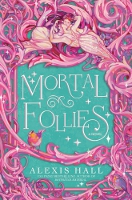
Mortal Follies by Alexis Hall
In order to restore my heart after The House of Mirth, I decided to go for this early 19th century set historical fantasy. This is essentially my favorite kind of fantasy - where the mythologies and folklore of a world are just essentially true but how much they impact the 'regular' people's lives is highly variable.
The year is 1814 and Maelys Mitchelmore finds herself under a mysterious curse. First, her dress utterly falls to pieces at a ball, to the extent that she has to flee to the garden and be rescued by the scandalous Lady Georgiana Landrake who is rumored to be a witch and to have murdered her whole family but also knows far more about curses than anyone else Maelys is familiar with.
As usual, Hall's writing is wonderfully funny and his characters are very engaging. He also solves a neat problem of exposition issues in this work by having it narrated by a fairy, Robin, who has fallen on hard times so follows various humans around through interesting times in order to write up a book on it later. This easily allows quick explanations of certain things (and also quite a bit of extra humor), and it slightly simultaneously gives you first and third person narration.
It's a great romp, and I loved it. There's a sequel coming out in August (Confounding Oaths), focusing on one of Mae's friends which I'm sure will be equally good.
87scunliffe
>78 mabith: 79 Have you tried Lady Audley's Secret by Miss M.E. Braddon, as it says on the Title Page of my very late 19th Century Edition. Just like Elizabeth Gaskell was '"Mrs. Gaskell", and Jane Austen simply "a lady"? It's a Victorian mystery too.
I too am a devotee of Victorian literature, and once even had the temerity to give a lecture on the Bronte sisters, Elizabeth Gaskell, George Elliot and Mary Elizabeth Braddon. Fortunately there was no real expert in the small audience.
I too am a devotee of Victorian literature, and once even had the temerity to give a lecture on the Bronte sisters, Elizabeth Gaskell, George Elliot and Mary Elizabeth Braddon. Fortunately there was no real expert in the small audience.
88mabith
>87 scunliffe: I haven't yet, though it's been on the list. Maybe this is finally the year! Sparking an interest in Victorian authors is always a worthy endeavor.
89mabith
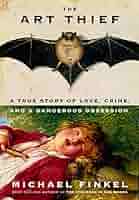
The Art Thief: A True Story of Love, Crime, and a Dangerous Obsession by Michael Finkel
This short work is the story of Stéphane Breitwieser, an extremely prolific art thief who completed more than two hundred thefts over a period of eight years. He likely wouldn't have gotten away with it for quite so long but he did not sell the art. He hoarded it all in his rooms, for his personal display, making sure no one other than his girlfriend (involved in the thefts) and his mother (who he lived with) ever saw the work. His mother only saw the items briefly, if at all, when he carried them in.
Finkel was able to build on others' work for this but also interviewed Breitwieser directly and seems to have been the person he spoke to the most. Finkel wisely does not attempt to write a longer book than he has material for and I think balances it all quite well. A good read.
90mabith
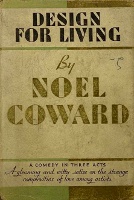
Design for Living by Noel Coward
Gary (valkyrdeath in Club Read) and I watched the 1930s movie adaptation recently so I thought I'd also get to the play. I've not actually read much Coward before. If you have access to Hoopla through your library, the LA Theatre Works group has a lot of recordings of staged plays (with a live audience) and it's a great resource. They're usually done quite well, though I was not into the main actress for this one.
It's an odd little play about three friends gradually figuring out a polyamorous relationship, essentially (why yes, the film is pre-Hays code). Coward throws you in at the deep end, partway through their story, in a way that felt a bit odd to me. All in all, I rather preferred the movie (and not just because two of the side characters are played by Edward Everett Horton and Franklin Pangborn, two loves of my young life).
Gary and I watch movies together most Sundays (via the magic of the internet) and we've been making sure to get to at least one older film per month, as we both love them and grew up watching a lot of them thanks to our dads. This year I've made a bit of a special focus on pre-code works. If I had to pick one decade that I could only watch the movies and hear the music from then, it would be the 1930s without question. Even with books you're doing all right, lots of Wodehouse, golden age mysteries, Faulkner, Steinbeck, TH White, Hurston, Pearl S. Buck, Graham Greene, Djuna Barnes, The Hobbit, and that's just thinking off the top of my head.
91mabith
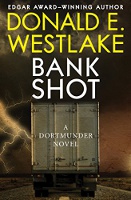
Bank Shot by Donald E. Westlake RE-READ
The second of Westlake's Dortmunder series, and the first I read, via audiobook, with my dad on a car trip when I was eleven. It started an absolute craze, and we both just adored the first nine books in the series SO much. The ninth book was the natural end point and I don't know why Westlake returned to it (I'd slightly bet on the needing the money), but they were never the same standard after that.
In this one, Kelp's nephew has come up with an idea to steal an entire bank, temporarily housed in a mobile home. Dortmunder doesn't yet think Kelp is a total jinx, but the nephew (who was let go from the FBI for wanting to introduce a secret handshake), is almost designed to irritate him. However, Dortmunder can see the plan working so well that he goes along with it. Of course, things don't go as planned.
It's an incredibly solid book, and just ridiculously funny. It was originally published in 1972 but I think it's aged well (better than many from the era). Westlake, to me, is always good at building realistic characters with realistic contemporary attitudes and to me it's very clear when that's the attitude of the character vs the author. In the Dortmunder books especially there's really never a huge 'yikes' moment even on that character attitude side.
This is also the first book where we get May, Dortmunder's life partner in this and all the other books, and I love her so much. She's smart, she's funny, she's realistic, and we immediately learn things about her which have nothing to do with Dortmunder or his work. I think it's also the first time we meet driver Stan Murch's mom, who is also a joy. I don't think anyone else writing these kinds of novels in this period built such great women characters.
If you can track down the audio editions read by Michael Kramer, they're perfection (likely only as ex-library audio cassettes). Honestly the most well-read fiction audiobooks I've ever encountered. Kramer is a complete master in this period. All the new readers are dreadful, no one should listen to them. If you're interested in digital files of the Kramer readings of books two through nine, I do have access I can share. They're too brilliant to disappear.
92mabith
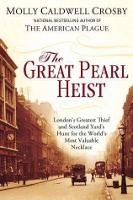
The Great Pearl Heist: London's Greatest Thief and Scotland Yard's Hunt for the World's Most Valuable Necklace by Molly Caldwell Crosby
I really liked Crosby's other two books, and was a little surprised by the subject of this one (the previous two are both about illnesses). I do love a heist though and vintage detecting. One of the main detectives was also instrumental in the case that inspired the recent Olivia Colman movie, Wicked Little Letters (well worth seeing).
The necklace was worth more than the Hope diamond, consisting of 61 matched pink pearls. Since this is 1913, we're well ahead of the cultured pearl industry (though predictably the Chinese had known the technique since the Song dynasty, 960-1279 CE), and pearls are beyond valuable.
It's an interesting little book. Nothing absolutely incredible, but if you like a heist and subsequent chase, it's a nice diversion.
93mabith

Mr. Melancholy Wants to Live a Peaceful Life - Cyan Wings RE-READ
Ah, another Chinese webnovel that I can heartily endorse as actually a great book. It's particularly interesting to me because it's sort of a response to another genre of webnovel - quick transmigration. Regular transmigration one or two people get sent to some new world, novel, present day, etc... Quick transmigration you have the same person spending 10-12 chapters in each of usually at least nine worlds (there are some exceptions). The reasons for this or how it ends is not always gone into in much detail or carefully thought out. Often someone is traveling through novels to keep the plot on track, or sent into worlds to be the villain who always suffers so the 'system' controlling them can steal their luck. Often I think it's just an excuse for a writer to do a lot of settings. You've always got a xianxia world, a more realistic ancient world, a modern entertainment industry setting, an apocalyptic world, a western fantasy world, etc...
In this world we meet a former 'clearer', Yu Hua, who survived being sent into more than 1300 worlds by the System, to meet specific goals so the system could steal the worlds' energies. Yu Hua has became so powerful though that he breaks free and goes to retire in an unopened world that the System can't yet touch. He just wants to live an ordinary life, and he has a plan. Marriage is not part of the plan, but his company forces him on a blind date and the other person catches his attention, making him really feel something for the first time in hundreds of years. When the book begins, they've been married for a few years, and Yu Hua has just lost his job due to the system managing to unseal some of his power, causing him to lose control and injure a coworker.
He is currently working on controlling the unlocked power and trying to figure out how to introduce his savings of $100 million dollars without arousing suspicion. His husband is trying to figure out a non-suspicious way to bring up the fact that his income is actually far more than his stated job, since in reality he's one of the world's Protectors, who fight off Destroyers (what clearers are known as), though there haven't been any since Yu Hua first arrived 15 years before.
It's a really funny book, the characters are created with a great realism to them and all feel very individual. However, the plot also really tightly done. The steps, the pacing, it all makes perfect sense for this kind of world, in this genre. The thing with amateur writers, often writing serially (or only five to ten chapters ahead of their posting schedule), plot isn't always the strong point of webnovels. This one has it all though. Great characters, great plot (more and more powerful destroyers keep coming, Yu Hua has to help the protectors fight them, showdown with the System, etc...), super funny.
94Tanya-dogearedcopy
>92 mabith: Oh! I love heist stories! Art, jewelry, whatever... and you've absolutely sold me with "and subsequent chase"! :-D
95mabith
Full warning Tanya, in some aspects the main police guy is the most naive man on earth, and the chase is a bit of a steady plod, but you know. The main thief and fence behind it is a really interesting guy as well (and a bit of a showman, always good in a heist situation).
96mabith
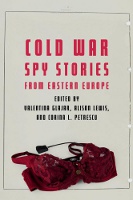
Cold War Spy Stories from Eastern Europe by Valentina Glajar and others
If you're looking for something with the more humorous or surreal stories of the period, this is not the book for you.
In many ways this collection feels a bit forced together, but it's quite interesting if you can go with the flow or treat each section individually. Surprisingly to me, I found the section on spy stories in film to be the most interesting.
97mabith
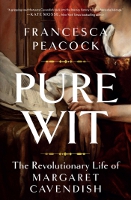
Pure Wit: The Revolutionary Life of Margaret Cavendish by Francesca Peacock
Having learned about her somewhere and having a novel about Cavendish on my radar (Margaret the First), I really wanted a biography first. Now I think that was probably a mistake and I should have gone novel then biography, but I'd always rather have fact really.
Cavendish was the author of the 1666 proto-science fiction novel, The Blazing World, among other things, and did have quite the extraordinary life. I read that some years back and found it interesting and worth reading if not amazing (experimental philosophy will probably never be my thing). This biography was just published in January, and I'm glad I waited for it. It was well done and goes into a lot of the reasons why Cavendish is somewhat forgotten and has been sidelined in both literary and feminist history. In addition it talks about how and why she was distorted in many earlier biographies.
There really should be a lush period mini-series about her, plus you've got the English Civil War as a background which isn't a common setting. The only downside to reading this now was that I am again sorely tempted to re-read Rebels and Traitors, Lindsey Davis' most excellent civil war epic.
98Tanya-dogearedcopy
>96 mabith: This is one of those that if I see it IRL, I will consider it fate and pick it up :-)
>97 mabith: I had not realized that Lindsey Davis had written beyond the setting of Ancient Rome! Definitely on my list for when the Reading Through Time (History) group reaches the 17th century!
>97 mabith: I had not realized that Lindsey Davis had written beyond the setting of Ancient Rome! Definitely on my list for when the Reading Through Time (History) group reaches the 17th century!
99mabith
Tanya, I hope you get the 17th century soon then! It's an absolutely brilliant work, her best in my opinion. Very long, but every page is justified (it covers decades). I'm devoted to her Falco books and stand-alone Rome novels (Flavia Albia I'm a little less sold on), but Rebels and Traitors is really something special. If I recall correctly, that was actually her more favorite historical period, it's partly just ancient Rome was what would sell reliably. Like with Falco though, she's great at including all those little details that make you feel in the period.
100mabith

Something's Not Right by Cyan Wings
Another book by the author of Mr Melancholy Wants to Live a Peaceful Life (see >93 mabith:), and another interesting take on a common genre of webnovel. However, this was written four years earlier and it shows, being a much simpler story.
In this world a group of people have transmigrated into an ancient setting novel (set in the Western Xia or Great Xia which was a power prior to the Yuan dynasty when the Mongols took over, this is a popular choice for ancient setting novels for reasons I cannot explain). Their goal is to seduce the emperor so that he gives up the throne for them and then they'll win some large monetary prize. It's sort of a testing ground for game system as well. They're given aphrodisiac hallucinogenic incense so they don't have to compromise their morals and actually sleep with the emperor.
The emperor has a head injury and on waking no long recognizes the people the people who have transmigrated and their tricks stop working. He now only trusts his 'empress' who is actually a man sent into the game to find the lead researcher for it.
Again, it's a shorter, simpler novel, but pretty fun and solid. Interesting that this author has been playing with common genres and tropes for so long (this is from 2016). Chinese webnovels specifically are just a really interesting corner of the writing world. I've read Japanese, Korean, and Thai works as well but they don't stand out as much for creativity or plot development and certainly not for humor. That said, I do think generally the Chinese sense of humor suits my sense of humor very well so your mileage may vary.
It's too bad officially published translations are few and far between (and often done far less well than the fan translations along with being expensive and released slowly in multiple volumes). There have been more lately, but it's all small presses and again, not great translations (other than Female General and Eldest Princess, as the fan translator was given permission to post hers by the author and this is what is being used for the official English publication). Unfortunately $20 each for goodness knows how many volumes in paperback (at least three, it's not far off from the total word count of Lord of the Rings and the volumes tend to be under 400 pages).
101mabith
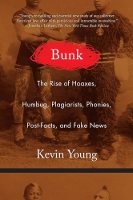
Bunk: The Rise of Hoaxes, Humbug, Plagiarists, Phonies, Post-Facts, and Fake News by Kevin Young
If you're looking for a book about earlier more 'fun' hoaxes, this isn't the one for you. There's a little covering Barnum stuff and that era but the majority is more recent history. I found it to be a very good read myself, if quite depressing about the state of humanity.
I have a feeling some readers are turned off by Young's frequent pronouncements in the later parts that he knew a certain person didn't smell right, HOWEVER, this ignores a key point. Most or all of those instances are talking about white people pretending to be black or native writers and poets, and Young is a black man (and poet). Of course what he sees in those acts is coming from a place of far greater knowledge than what I, for example, would see.
Many commiserations to him for being almost totally done with the book when the Rachel Dolezal news came out.
102mabith
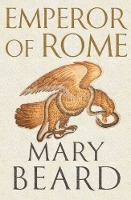
Emperor of Rome: Ruling the Ancient Roman World by Mary Beard
I'm a fan of Beard's writing and presenting on the ancient world. If I had the power (and a time machine), I'd very much want her and Barbara Mertz to have some of sort of ancient history chat show or podcast.
This book ambles about quite a lot, in a way that might annoy some but it worked for me. Beard thinks about history the way I enjoy most, so it's usually an easy sell.
103mabith

After Transmigrating I made the Antagonist Cry by Qiao Muli RE-READ
June has been a slumpy reading month for me. I've read a decent number of books but I've not been Excited about anything I've started other than Pure Wit. This is a hard state to bear, reading is my primary life activity and due to my disability there's not much I can replace it with when it fails to bring me enough joy.
So I got into some Chinese webnovel rereads again, particularly around this month's book club book which was dreadful.
This one there are Main worlds and for unexplained reasons the worlds created in novels also spring into existence and they must be kept on track and not allowed to collapse otherwise it affects the Main worlds. So our main character has come to this novel to correct things after the previous go was reset. The original novel is all dogblooded melodrama. His character marries the antagonist but ignores him in trying to win the heart of the person he actually loves and finally the antagonist loses his reason, collapses the world economy, and locks the husband in a small dark room. The transmigrator thinks the original character is an idiot as the antagonist is both incredibly handsome and the richest person on the planet (and quite a softie). So of course he's there working to be a good husband, not knowing that the antagonist accidentally kept his memories of the previous timeline. It's an uphill battle.
It's very silly and it's not one of the wonderfully written novels, but it's a quick fun bit of nonsense. The transmigrator is an actor in this world and ends up taking roles based on other worlds he's been in, so there's the added wrinkle of figuring out why those worlds are showing up here etc... Though it's not actually delved into in any meaningful way.
There are a significant number of novels where a transmigrator or a person who was reborn some years earlier or is given knowledge of the novel's original track, ends up deciding to get with the usually misunderstood villain. It's partly making fun of the poorer melodramatic novels where you think 'well this villain actually has quite reasonable complaints, these protagonists are awful.' Fortunately I've avoided such works by focusing on humor.
104mabith

Spells for Forgetting by Adrienne Young
Billed as a unique mystery with a light fantasy bent, I wish I had a spell to forget how much this book annoyed me! I resent the time spent on it and I think it's part of what soured my reading for the month.
Featured all the usual suspects for poor contemporary mystery writing: Characters required to be dumb as box of rocks to string out the book and characters required to act totally out of character to make the final plot event work. It was also extremely predictable in basically every aspect.
I would not have read it but it was a book club pick. I don't think I actually cared about the mystery element at any point. The author was mostly writing YA and I think this was their first foray into adult novels. It kind of shows in a negative way. The writing generally grated on me, as pointlessly and overly descriptive in ways that often led to repetition in individual paragraphs.
Luckily at the meeting other people also had problems with it, so I didn't have to be a lone voice of negativity.
105mabith

Ex-Husband's Call by Qin San Jian RE-READ
Another re-read to get the previous book out of my brain. This one features a married couple who met on a blind date set up by their parents but agreed to divorce after a year if things weren't working out. Well, it hasn't worked out super well, as both are essentially pretending to be idealized versions of themselves since they think the other might not like their real selves. The one who asks for the divorce is a teacher and his partner, a police officer, doesn't want to get divorced but had made the agreement so just decides to chase him back as they'll both be more likely to be themselves.
It's always nice to find one of these novels with proper adult characters and there are a lot of good details in this one, with some actual stakes related to their jobs, but it's still mainly just a funny read. Some nice, sensible comments on teaching along the way though with a few serious moments.
106scunliffe
>102 mabith: I agree that this book ambles around quite a lot, which at first annoyed me. Then I realized it was not a narrative history but a portrait built up in fragments about what it was like to rule as, and be ruled by emperors over the two hundred years that followed Augustus, the most imperial of them all.
107mabith
>106 scunliffe: Oh yeah, she's pretty clear about that in the beginning, but it can take some adjusting to depending on the mood.
108mabith
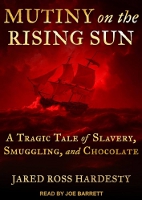
The Mutiny on the Rising Sun: A Tragic Tale of Slavery, Smuggling, and Chocolate by Jared Ross Hardesty
This felt like a less typical mutiny story. For one, it really brings in background from a lot of areas. For another, the author was either a main or THE researcher on a key figure involved for a chocolate shop that was using his name in the shop name or for promotions or something but didn't really know much about him. I got quite behind on reviews, so I'm no longer as clear on the details as I'd like to be for this review.
It is a less narrative book than other authors might have made it, but also probably more ruthlessly factual. There are some authors who are good at making you feel like you're in a story while still giving you buckets of Facts but it's not the most common skill after all and I'd rather have the facts.
Again, the details have largely faded, but it was an interesting read for those interested in such tales.
109mabith
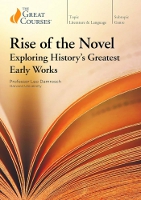
Rise of the Novel: Exploring History’s Greatest Early Works by Leo Damrosch
What is a lecture series if not a series of essays, so I'm counting it as a book.
I enjoyed this and learned quite a lot I didn't know already. It mostly went chronologically (not 100% though) so it was also interesting to see how the works influenced each other. I did skip the Tom Jones chapter as Damrosch advised it if you hadn't read the novel but planned to.
The writing felt engaging to me, but I have a pretty high tolerance for dry non-fiction.
110mabith

For Real by Alexis Hall RE-READ
I am aware I just re-read this in February, and I certainly didn't intend to re-read it again this year. HOWEVER, it was published in print for the first time with author annotations and an extra short story and I was lured into buying it. I mean, annotations from an author I find incredibly funny? That's all it takes to get my money apparently. After picking it up at the bookstore I was looking through the annotations then felt like I need to read them in the full context of the book and before I knew it was two-thirds of the way through so might as well finish it.
The annotations were so fun but also very thoughtful and smart and interesting, and showed me all the more subtle literary allusions I missed, further proving that Hall is a huge literature nerd, as I have previously proclaimed. There was even some Baudelaire he seemed to have translated himself. The only downside is now I know he's younger than me and despite being nearly 40 that still seems strange due to feeling about 25 in my head.
See the earlier in the thread for an actual review of the book itself.
111mabith
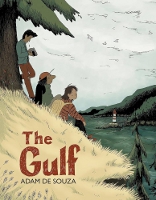
The Gulf by Adam de Souza
I received this graphic novel through the ER program and it took me a shamefully long time to sit down and read it. It's quite a large format volume, which my hands do struggle with.
This is definitely a snapshot of a few teenagers, rather than a book with a fully developed plot. Most of it takes place in 2007 when a girl, Oli, and her best friend, Milo, are running away to a commune they learned about through an old pamphlet the girl's parents had. A third friend was supposed to come with them, but after a meh date and disastrous aftermath with Oli she has essentially cut him out of her life. Instead the shy Alvin, who Milo seems to have a crush on, comes along.
They are woefully ill-prepared for this, as they are hiking to the commune and must camp on the way, in a way that seemed fairly unbelievable to me for 18/nearly 18 year olds. Oli gets into a fight at school the day they're supposed to leave (the last day of school) and her backpack gets left there, but she's not actually in Trouble trouble about it, so you'd think they'd just leave a day later, but no. I was an anxious sort of teenager, so perhaps that's just me finding it stretching belief.
I really enjoyed the art style (though I'm currently pondering why the cover has Oli with dark hair when it's blonde through the whole of the book). For me at this moment, I think I wanted more than a snapshot of their lives. Oli goes about things in ways I could never really understand and there's not much space dedicated to understanding why she feels the way she does (or why she has pretty serious anger issues). Rather than someone who will be 18 in a month, her actions felt more like a younger teen.
112mabith
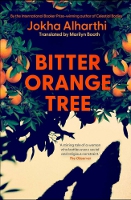
Bitter Orange Tree by Jokha Alharthi
Kay recommended this for an Omani author and it was very accessible from the library so I got it out right away.
In many ways it's another snapshot book, of a young woman and her family with some extra focus on her grandmother. However, that's a very different prospect in a novel vs a graphic novel, and I really enjoyed this one.
The description of the book doesn't feel hugely accurate to me (or claims the book will delve into more than it really does), so I'm glad I didn't really read it before starting the book! It's a quiet, character driven novel, and I cared about the characters very quickly. I really enjoyed the narrator, Zuhour's voice and the language she uses and there is some humor in there. I haven't read enough of these quieter character books recently and this reminded me how much I do like them.
113mabith
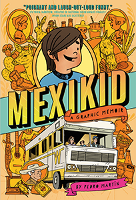
Mexikid: A Graphic Memoir by Pedro Martin
A good friend got massively into graphic novels and memoirs recently and recommended this to me. She and her kids have a sort of informal comics book club now and it just makes me happy every time I hear about it.
This one is about the author's large family and a particular road trip to Mexico to pick up their grandfather to bring him to live with them, with all the adventures and troubles along the way. I enjoyed the art style and getting to test my extremely rusty and limited Spanish knowledge (the random Spanish bits have translations in footnotes a lot of the time, but not all the time).
This takes place in the 1970s, so I don't envy my friend having to explain cassettes and Happy Days and such to her kids when they read this.
114mabith
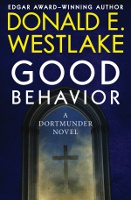
Good Behavior by Donald E. Westlake RE-READ
Bedtime re-read of maybe my favorite 'fine to read stand-alone' Dortmunder novel (my actual favorite you really need to have read the previous eight books to fully appreciate). This is only a marginal favorite though, the first nine books really only have one weaker spot and it's still fun.
In this one we get Dortmunder beholden to some nuns after a robbery gone wrong (not at the convent), who need him to rescue their sister who has been kidnapped by her very powerful and wealthy father. He expects her to marry well and help run all the family businesses, not live in seclusion, silent except for Thursdays.
As with all the first nine Dortmunders (the only ones you need to read, ignore the later books), it is a book very much of its time, 1985, referencing American backed coups in central America, and including a cult deprogrammer. It's an incredibly solid, perfectly paced book with so many standout hilarious moments. I've literally been reading this once a year since 1997 or 1998 and it still cracks me up.
Here is a little excerpt of the kind of joy you get with Westlake's Dortmunder books:
The Avalon State Bank Tower, in addition to stretching seventy-six stories into the sky, also extended four stories down into the ground, nestling itself into a sliced-out pocket in the bedrock of Manhattan Island. The bottom two floors were all machinery and metal ladders, like the bowels of a great ocean-going passenger liner—which in many ways is what a skyscraper is, massive and self-contained and compartmented, except that the skyscraper is always moored in the same place, and of course it's standing on end, and come to think of it skyscrapers don't float, and maybe they aren't anything like each other at all. Forget the whole thing.
115mabith
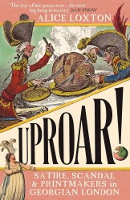
UPROAR!: Scandal, Satire and Printmakers in Georgian London by Alice Loxton
London, 1772: a young artist called Thomas Rowlandson is making his way through the grimy backstreets of the capital, on his way to begin his studies at the Royal Academy Schools. Within a few years, James Gillray and Isaac Cruikshank would join him in Piccadilly, turning satire into an artform, taking on the British establishment, and forever changing the way we view power.
I went into this expecting to love it but ended up being somewhat disappointed. Perhaps I would have been less so if I'd known that the author lists how many social media followers she has on her own website. She is 28, I guess that's normal, but to me feels (as the kids say) quite cringe.
One issue was Loxton seems to be trying very hard to write in a funny way and I don't think that's her strong suit (or her humor is not mine). Another issue was she periodically breaks the normal non-fiction writing to just imagine up scenes between real people. She is clear about doing this, she's not trying to sneak it through as fact, but it adds NOTHING to the book and simply distracts. In some of them she's adding modern inventions to these imaginings "if Gillray were listening to radio he might have heard..." Lady, what is the point!
There's good stuff in the book but Loxton really gets in her own way, as though she is mostly trying to appeal to a podcast audience vs a history reader audience.
If you pick this up, definitely get it in print and not audio as well. She reads it and her jolly tone trying to up the humor artificially does not help. She also pronounces a lot of words in ways I've never heard in my life. This is not simply UK vs American pronunciation, as I watch and listen to far more UK things than American ones.
116Eyejaybee
>115 mabith:. I agree entirely about this book. I had seen and enjoyed a lot of Alice Loxton’s clips on Instagram in which she talks about an unusual aspect of a historical artefact or building. Her quirky approach works in that format, but I was disappointed by this book. As you say, she seems to relish the apparently hysterically funny nature of her observations, which would be annoying enough if they actually were devastatingly funny, but they constantly fail to live up to her vaulting expectations, which makes it additionally irksome.
117mabith
Glad it wasn't just me, James! I really think the publisher made a mistake letting that tone stand in the book. In my experience most younger folks who got really into history podcasts, Instagram, Tiktoks etc... aren't really reading many non-fiction books, so keeping that vibe won't get them extra sales in an existing fanbase.
It's currently my struggle that one of my teenage nephews has gotten into history (yea!) but doesn't want to read any books and there's simply a limit in how much you can gain in those other formats (particularly in how much less your average podcast etc talks about sources and examining source bias and all that).
It's currently my struggle that one of my teenage nephews has gotten into history (yea!) but doesn't want to read any books and there's simply a limit in how much you can gain in those other formats (particularly in how much less your average podcast etc talks about sources and examining source bias and all that).
118mabith
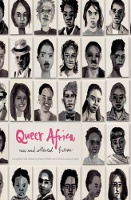
Queer Africa: New and Collection Fiction by Karen Martin, Makhosazana Xaba and others
This is volume 1, there is a second volume out now as well. This was a good collection. The stories felt varied, and I liked most of them quite well. I wouldn't say there were any that hugely stood out to me, they're mostly snapshots of lives (and I'm not a big short story person generally).
Good collection, I'll probably read the second volume at some point.
119mabith
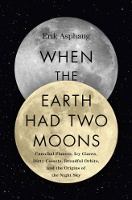
When the Earth Had Two Moons: Cannibal Planets, Icy Giants, Dirty Comets, Dreadful Orbits, and the Origins of the Night Sky by Erik Asphaug
A palate cleanser after the imaginings of Uproar and my attempt to read two different non-fiction books about Cassie Chadwick (both failures due to more imaginings).
I will say this had a slightly more romantic tone about the universe than I was perhaps expecting. It didn't go into great depth and is definitely popular science, but was largely what I needed at that moment (actually I think I needed another Ignition! but we can't have everything).
120mabith

The Antelope and the Night Wolf by Li Xiu Luo RE-READ
We've hit the absolutely high plateau of my grief season which starts with mother's day (then my dad's birthday, then father's day, then my mom's birthday). My mom's birthday was the 7th and it all feels particularly difficult this year. Her birthday is also when she first showed symptoms of anything at all being wrong (then diagnosed in August and she died in September), so it's just a dreadful time in addition to being hot enough I can't really leave the house.
I picked this as my 'can't/won't sleep' re-read, because it's especially silly. College student, Ling Yang, buys fully leveled account in the game he plays to start on a new server, that account was a couple with someone else and had scammed them. The account's former husband, Ye Lang, sees this new guy and insists he pretends to be the previous player (and say the account was hacked so 'she' wasn't the scammer). It's a great one for the public act vs the private interactions and of course they accidentally get to know each other in real life (and Ling Yang falls for Ye Lang and vice versa). There are a million other misunderstandings around things with Ling Yang's previous game friends and some less usual aspects to this novel, but the keynote is the absolutely silliness.
Hidden identity amateur gaming novels (vs professional e-sports settings), tend to be particularly fun. Though it leads to the embarrassment of my friend who plays a similar type of game telling me about it and me going "Aw, just like in my Chinese novels" as if it's a unique thing.
121mabith
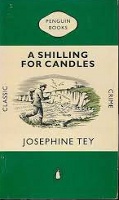
A Shilling for Candles by Josephine Tey RE-READ
On my mom's birthday I'd normally go out early in the morning at stare at the river for a while (my mom loved water), but even at 8 am it was already far too humid for me to go out without physical consequences.
I decided I needed to be watching/reading/listening to things my mom loved and this is also a bit difficult. She had many things she enjoyed or recommended, but was also not a person to come rave to you about some author or show or musician. Just wasn't her character (her serious excitement was reserved for activities and experiences rather than media).
However, I do remember as a kid when she found some collected editions of Josephine Tey that she hadn't read in years and was noticeably excited about it. I've read all the Tey novels before but mostly only once (other than Brat Farrar, my favorite). I really enjoy her style in them. It just feels incredibly unique and modern for the period. She manages to make everyone very human and quite mundane, which is how most crime is of course. Despite the realistic nature of the characters they're still very compelling books. This was the first Tey I read, back in 2009 (when I was forcing my mom to give me recommendations) and I remembered absolutely nothing about it.
This one suffers from some anti-semitism, though partly of the sort where I'm pretty sure the author thinks she's being more progressive than most (which given the times she might have been). It is depressing. It's not a major part of the book at all, but of course stands out.
122mabith
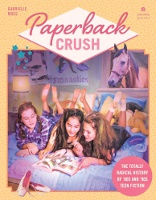
Paperback Crush: The Totally Radical History of '80s and '90s Teen Fiction by Gabrielle Moss
This was vaguely on my to-read list but I kept putting it off since though I'm the right age for them, I really didn't read these sorts of novels growing up. A friend just read it though and said it was interesting even without having read the books focused on and I'm considering giving a copy to my sister for her birthday. She definitely did read these books (she had a big Sweet Valley High period which rubbed off enough on me to the extent I read a couple of the middle school set ones before I got bored and gave up pretending in a vain hope she'd like me more).
It's a short book, and doesn't delve too deeply into the wider issues, which would be more interesting to me. Moss features a lot of quotes from the authors (and illustrators) involved, and does go into the earlier history of teen books and particular trends. I was slightly horrified to learn what was going on in those Sweet Valley High books, and maybe it's good I read very few 'teen' books and went straight from children's novels to adult books. The few teen-centric ones I did read (more serious, non-series books) definitely gave me the impression that this period of life would be stressful and perhaps generally unpleasant (not wrong).
123mabith
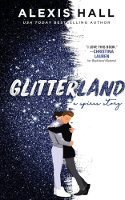
Glitterland by Alexis Hall RE-READ
I told myself I wouldn't re-read this yet, but here we are. The trouble is, this not-really-a-series series of books is getting their first print run and Hall did annotations for all of them, and apparently that's all it takes for me to need to buy the book. Then I made the mistake of looking at the first couple and before I knew it I was halfway through the book and then why not finish it.
This one has quite an unlikable narrator, Ash, who is largely too depressed and anxious to think anything he says will matter to anyone, only then he falls in love with a Very Essex model, Darian, who he meets in a night club he's been forced to visit (if you're familiar with UK TV personalities, Darian is basically Rylan without the snark). You spend a lot of the book wanting to slap some sense into Ash, but how he behaves makes perfect sense for the character and what he's dealing with (and he does work on himself).
It's perhaps my least favorite of Hall's books that I've read, but still solid especially given it was his first or second book published (and I liked it enough to re-read it). His facility with dialogue is already very present, which is one of the things I most enjoy about his writing.
No one tell any of my other favorite authors about this annotation trick, I don't have enough money for it.
124mabith
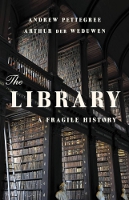
The Library: A Fragile History by Andrew Pettegree and Arthur der Weduwen
If there's one thing I'm all about, it's books about books. This was a good one, full of very interesting information going through the history of libraries chronologically (which I appreciate).
It's a good companion to A Gentle Madness: Bibliophiles, Bibliomanes, and the Eternal Passion for Books, perhaps, which I read way back in 2012 and remember loving.
Shockingly, the specific derangements suffered by children forced to spend eight hour stretches in libraries their parents work in over school breaks was not covered. That's clearly a book I'll have to write myself.
125mabith
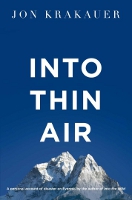
Into Thin Air by Jon Krakauer
This is a memoir/reporting of a particular Everest climb that ended in a number of deaths which Krakauer, a keen climber but also outdoors journalist, took part in. It was a book club pick, though I ended up missing the meeting due to the heat today.
I have little time for Everest and extreme mountaineering. Anything where the altitude means you literally can't think clearly a lot of the time seems like a ridiculous thing to take part in if you have a family you love. Many hobbies aren't 100% safe, but this kind of climbing is uniquely dangerous for so many reasons (weather, snow/ice instability, effects of altitude and low-oxygen, etc...) it honestly seems like a selfish thing to do to your loved ones and I will never understand why people do it.
Krakauer writes well, and I do understand he needed to write this to process what happened, but it is just a baffling thing to do to me generally. The year this accident happened the death rate for Everest climbers (though he might have only been talking about people who actually reached the summit) was one in seven (as opposed to many other years where it's one in four).
126mabith
Like a lot of us I've seen that NYT list of best 21st century books going around, and looked at similar lists from other publications. It is interesting the non-fiction that's fallen off the radar but surely would have made the list ten years ago (The Botany of Desire and Reading Lolita in Tehran seemed conspicuous by their absence).
I keep a spreadsheet of what I've read since 2006 which includes the publication year, so I sorted it by date and drew out some favorites. I tried to stick a little more to bigger titles (this is debatable, I know, but I promise I could have gone more niche) and I've separated fiction and non-fiction and ordered them chronologically.
The Amazing Adventures of Kavalier and Clay by Michael Chabon
White Teeth by Zadie Smith
The Salt Roads by Nalo Hopkinson
Jonathan Strange and Mr. Norrell by Susanna Clarke
The Secret River by Kate Grenville
Lavinia by Ursula K. Le Guin
Rebels and Traitors by Lindsey Davis
Capital by John Lanchester
The Golem and the Jinni by Helene Wecker
All the Birds, Singing by Evie Wyld
A Brief History of Seven Killings by Marlon James
Sing, Unburied, Sing by Jesmyn Ward
Lotus by Lijia Zhang
Fight Night by Miriam Toews
When the Angels Left the Old Country by Sacha Lamb
Babel by RF Kuang
Nickel and Dimed by Barbara Ehrenreich
Triangle: the Fire that Changed America by David von Drehle
Persepolis by Marjane Satrapi
Slavery by Another Name by Douglas Blackmon
In the Realm of Hungry Ghosts by Gabor Mate
The New Jim Crow by Michelle Alexander
No Good Men Among the Living by Anand Gopal
1914 the Year the World Ended by Paul Man
To the End of June: The Intimate Life of American Foster Care by Cris Beam
All Joy No Fun by Jennifer Senior
Kitty Genovese by Kevin Cook
Charity and Sylvia: A Same-Sex Marriage in Early America by Rachel Hope Cleves
The Radium Girls by Kate Moore
What You Have Heard is True by Carolyn Forche
I keep a spreadsheet of what I've read since 2006 which includes the publication year, so I sorted it by date and drew out some favorites. I tried to stick a little more to bigger titles (this is debatable, I know, but I promise I could have gone more niche) and I've separated fiction and non-fiction and ordered them chronologically.
The Amazing Adventures of Kavalier and Clay by Michael Chabon
White Teeth by Zadie Smith
The Salt Roads by Nalo Hopkinson
Jonathan Strange and Mr. Norrell by Susanna Clarke
The Secret River by Kate Grenville
Lavinia by Ursula K. Le Guin
Rebels and Traitors by Lindsey Davis
Capital by John Lanchester
The Golem and the Jinni by Helene Wecker
All the Birds, Singing by Evie Wyld
A Brief History of Seven Killings by Marlon James
Sing, Unburied, Sing by Jesmyn Ward
Lotus by Lijia Zhang
Fight Night by Miriam Toews
When the Angels Left the Old Country by Sacha Lamb
Babel by RF Kuang
Nickel and Dimed by Barbara Ehrenreich
Triangle: the Fire that Changed America by David von Drehle
Persepolis by Marjane Satrapi
Slavery by Another Name by Douglas Blackmon
In the Realm of Hungry Ghosts by Gabor Mate
The New Jim Crow by Michelle Alexander
No Good Men Among the Living by Anand Gopal
1914 the Year the World Ended by Paul Man
To the End of June: The Intimate Life of American Foster Care by Cris Beam
All Joy No Fun by Jennifer Senior
Kitty Genovese by Kevin Cook
Charity and Sylvia: A Same-Sex Marriage in Early America by Rachel Hope Cleves
The Radium Girls by Kate Moore
What You Have Heard is True by Carolyn Forche
127scunliffe
>125 mabith: I think it is reasonable to allow that very well seasoned and accomplished Himalayan climbers are entitled to take the calculated risks of even venturing onto Everest, and some of them have died.
But the really shocking aspect of this book is that the profit motive of expedition leaders to take large parties up the mountain distorted the calculation of risk, and also allowed insufficiently experienced climbers to take part. Not what mountaineering should be, hence the resulting deaths when things began to go wrong.
But the really shocking aspect of this book is that the profit motive of expedition leaders to take large parties up the mountain distorted the calculation of risk, and also allowed insufficiently experienced climbers to take part. Not what mountaineering should be, hence the resulting deaths when things began to go wrong.
129bryanoz
>126 mabith: White Teeth, Jonathan Strange, The Secret River and The Golem and the Djinni would be on my list, must get to Babel soon.
130Tanya-dogearedcopy
LOL, I have always considered myself a heavy reader but the NYT list humbled me! I have only read 11 titles (cf to an average of 30+ from my other reader friends)! It’s not that I don’t have an interest in 21st-century books (I own another 38 from the list) but that I tend to shy away from reading bestsellers while other people are reading them. It’s been that way since the early Oprah book club days, a knee-jerk reaction. Ridiculous, I know!
The one from your list that intrigues me is 1914: The Year the World Ended (by Paul Ham). Taking the BB for that one!
The one from your list that intrigues me is 1914: The Year the World Ended (by Paul Ham). Taking the BB for that one!
131mabith
>128 Eyejaybee: >129 bryanoz: There have definitely been some great books these decades.
>130 Tanya-dogearedcopy: There are SO many books published every year, I think unless you're reading strictly to what gets hyped up it's hard to have more than 30-something on any of those lists. Plus there are so many amazing older works to get to.
I try to avoid the very popular books a lot of the time too, plus there are things like The Goldfinch that I'm pretty certain I won't enjoy but also won't necessarily challenge me in a useful way (I do read things I'm fairly sure I won't love on a pretty regular basis but certainly not when they're 700+ pages long and I don't need to read more books by white Americans than I already do).
>130 Tanya-dogearedcopy: There are SO many books published every year, I think unless you're reading strictly to what gets hyped up it's hard to have more than 30-something on any of those lists. Plus there are so many amazing older works to get to.
I try to avoid the very popular books a lot of the time too, plus there are things like The Goldfinch that I'm pretty certain I won't enjoy but also won't necessarily challenge me in a useful way (I do read things I'm fairly sure I won't love on a pretty regular basis but certainly not when they're 700+ pages long and I don't need to read more books by white Americans than I already do).
132mabith
>127 scunliffe: Oh I think people are perfectly free to take risks with their own lives, it just seems incredibly selfish to me personally to do so when you have family who deeply care about you. I can't imagine telling my spouse or young children "I'm off to do something that had a one in five/eight/etc... death rate last season!" Plenty of the deaths happen in extremely professional not-profit driven parties (indeed sometimes it's guides using amateurs to fund their summit attempt and grounding the amateurs at lower elevations so they can succeed).
Sorry for delay in reply! I've been incredibly scattered.
Sorry for delay in reply! I've been incredibly scattered.
133mabith

You'll Do: A History of Marrying for Reasons Other Than Love by Marcia A. Zug
The last few weeks have been so stressful that much of this book has gone out of my brain.
It was an interesting read, and especially that shift in history of when the idea (more than the fact) of marrying for love started coming to the fore and the reasons for it.
However the last third of the book especially was deeply depressing as we'd moved into Modern Times and the ways marriage can protect abusers (they regularly get shorter sentences/less punishment in court cases) among other issues. I had to take a break from the book at one point. Of course now we're seeing so many on the right in the US trying to get rid of no-fault divorce and UGH.
While it might seem partly off-topic, I'm surprised Zug didn't touch on restrictions on marriage for those receiving disability benefits (in regards to halving or ending your benefits) or the fact that disabled people unable to get benefits frequently end up in abusive marriages as the only way they can survive.
134mabith
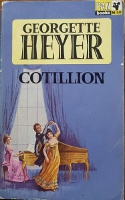
Cotillion by Georgette Heyer
I've been meaning to read a Heyer for a while, I remember a few people I followed when I first joined LT posted about her books a fair bit and they sounded fun. I'd had The Masqueraders pegged as the first to read, but then saw a post about an online book club set to read Cotillion and thought I'd go for it.
The set-up is Kitty's guardian has decided to leave her his fortune only if she marries one of his great-nephews. He has called them all to his home to announce it (though not all have appeared) and let them all propose (feeling certain she'll choose his favorite, who hasn't shown up). Kitty is insulted and is mid-running away when she meets up with her cousin Freddy who was late to the party. She convinces him to pretend to propose to her so she go to London for a bit and plan from there.
It was a great read, really fun and the character development was wonderfully done. I can see why people love Heyer so much. The end felt very abrupt, but I think that's partly just the genre. I am glad one particular ex of mine never read any because she would have been talking in Heyer's Regency slang for months. I introduced her to PG Wodehouse and Damon Runyon and her mimicking their speech styles got old quite quickly.
The book club also went really well and I think I successfully acted like a normal person and not the anxious wreck that I was.
135mabith
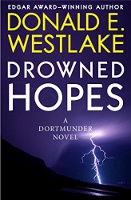
Drowned Hopes by Donald E. Westlake RE-READ
I shall continue to post about these re-reads to encourage you all to pick them up. They're just brilliant books.
This is the seventh and longest book in the Dortmunder series (which are all stand alone apart from What's the Worst that Could Happen, which you really must read most of the previous eight books to fully appreciate). In it, an old and particularly disliked cellmate has been unexpectedly released from prison due to his age.
Tom Jimson wants some help getting a coffin full of money out from under a reservoir, created some years after the stash was buried. Dortmunder is battling not only the fact that Tom's partners tend to turn up dead but also keep him from simply blowing up the dam. We get some particularly great new characters in this one as well.
I've transcribed for you a scene with the regulars in the bar they plan jobs in. In every book Westlake creates hilarious bits with them. My parents particularly loved this one.
When Andy Kelp walked into the OJ Bar & Grill on Amsterdam Avenue at six in the evening, the regulars were discussing the proposition that the new big buildings that had been stuck up over on Broadway, one block to the west, were actually spaceships designed and owned by aliens. “It's for a zoo,” one regular was suggesting.
“No no no,” a second regular said, “that isn't what I mean.” So he was apparently the one who'd raised the suggestion in the first place. “What I meant is for the aliens to come here.”
A third regular frowned at that. “Aliens come here? When?”
“Now,” the second regular told him. “They're here already.”
The third regular looked around the joint and saw Kelp trying to attract the attention of Rollo the bartender, who was methodically rinsing seven hundred million glasses and was off in a world of his own. The regular frowned at Kelp, who frowned back. The regular returned to his friends. “I don't see no aliens,” he said.
“Yuppies,” the second regular told him. “Where'd you think they came from? Earth?”
“Yuppies?” The third regular was a massive frowner. “How do you figure that?”
“I still say,” said the first regular, “it's for a zoo.”
“You need a zoo,” the second regular told him. “Turn yourself in.” To the third regular he said, “It's the yuppies, all right. Here they are all of a sudden all over the place, every one of them the same. Can actual adult human beings live indefinitely on ice cream and cookies? No. And did you ever see what they drink?”
“Foamy stuff,” the third regular said thoughtfully. “and green stuff. And green foamy stuff.”
“Exactly,” the second regular said. “And you notice their shoes?”
The first regular said, dangerously, “Whadaya mean, turn myself in?”
“Not in here,” Rollo said absently. He seemed to look at Kelp, who waved at him, but apparently Rollo's eyes were not at the moment linked up with his brain; he went on with his glass-rinsing.
Meanwhile, the second regular had ignored the first regular's interruption, and was saying, “All yuppies, male and female, they all wear those same weird shoes. You know why?”
“Fashion,” the third regular said.
“To a zoo, you mean?” demanded the first regular. “Turn myself in at a zoo? Is that what you mean?”
“Fashion?” echoed the second regular. “How can it be fashion to wear a suit and at the same time those big clunky weird canvas sneakers? How does it work out to be fashion for a woman to put on all kindsa makeup, and fix her hair, and put on a dress and earrings and stuff around her neck, and then put on those sneakers?”
“So what's your reading on this?” the third regular asked, as the first regular, zoo partisan, stepped slowly and purposefully off his stool and removed his coat.
“Their feet are different,” the second regular explained. “On accounta they're aliens. Human feet won't fit into those shoes.”
The first regular took a nineteenth-century pugilistic stance and said, “Put up your dukes.”
“Not in here,” Rollo said calmly, still washing.
“Rollo?” Kelp said, wagging his fingers, but Rollo still wasn't switched to ordinary reception.
Meantime, the other regulars were gazing upon the pugilist with surprised interest. “And what,” the second regular asked, “is this all about?”
“You said it isn't a zoo,” the pugilist told him, “you got me to answer to. You make cracks about me and zoos, we'll see what happens next.”
“Well, wait a minute,” the third regular said. “You got a zoo theory?”
“I have,” the pugilist told him while maintaining his fists-up, wrists-bent, elbows-crooked stance, one foot in front of the other.
“Well, let it fly,” the third regular invited him. “Everybody gets to say their theory.”
“Naturally,” the second regular said. He'd been gazing at those upraised fists with interest but no particular concern.
The pugilist lowered his fists minimally. “Naturally?”
“Rollo,” said Kelp.
“You got an idea that's better than yuppies,” the second regular told the pugilist, “let's have it.”
The ex-pugilist lowered his arms. “It is yuppies,” he said. “Only it's different.”
The other regulars gave him all their attention.
“Okay,” the zoo man said, looking a little self-conscious at being given the respectful hearing he'd been demanding, “the thing is this: you're right about those new buildings being spaceships.”
“Thank you,” the second regular said with dignity.
“But they're like roach motels,” the ex-pugilist said. “They attract yuppies. Little tiny rooms, loft beds, no moldings; it's what they like. See, the aliens, they got zoos all over the universe, all kindsa creatures, but they never had human beings before, because there weren't any human beings that could live under zoo conditions. But yuppies do it naturally!”
“Rollo!” insisted Kelp.
“So, what,” asked the third regular, “is your reading of the situation?”
“Once all the buildings are completely rented out,” the ex-pugilist told them, “they take off, like ant farms, they deliver yuppies all over the universe to all the different zoos.”
“I don't buy it,” the second regular said. “I still buy mine. The yuppies are the aliens. You can tell by their feet.”
“You know, but wait a minute now,” the third regular said. “Botha these theories end at the same place. And I like the place. At the end, the new buildings and the yuppies are both gone.”
With a surprised look, the second regular said, “That's true, isn't it?”
“Spaceship buildings,” agreed the ex-pugilist, “fulla yuppies, gone.”
This idea was so pleasing to everyone that conversation stopped briefly so they could all contemplate this future world—soon, Lord—when the yuppies and their warrens would all be away in some other corner of the universe.
136mabith
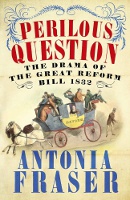
Perilous Question: Reform or Revolution? Britain on the Brink, 1832 by Antonia Fraser
I was on a bit of a run with that book about reasons for marrying other than love and then the Heyer so thought I'd stick close-ish to the period Cotillion is set in with this one.
Good read if you're interested in the period. I've gotten behind on reviews so I've forgotten if there was anything specific I felt about this one other than it's a nice little history book, as you can generally expect from Fraser.
137mabith

Don't You Like Me - Lu Tianyi RE-READ
House stress has gotten on top of me and I've flung myself into a string of re-reads, most of which I won't actually be posting about.
In this one, Lin Feiran has started at a new boarding school on the wrong foot. His roommate is the school idol, a role he was used to having, so he's in an entirely one-sided, very childish cold war with Gu Kaifeng. After Feiran's grandfather dies, he can suddenly see ghosts, and is extremely frightened. Kaifeng has strong yang energy (yin energy is associated with ghosts), so after touching Kaifeng, Feiran is spared the ghosts for some minutes. After he started clinging to him, Kaifeng gets the wrong idea of what's going on, thinking Feiran is just embarrassed to admit his feelings.
It's interspersed with him getting more used to ghosts, and helping them. I am perhaps partial to this because there are also a number of ghost-based east Asian TV shows (and one UK sitcom) I really enjoy.
138mabith
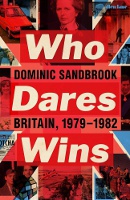
Who Dares Wins: Britain, 1979-1982 by Dominic Sandbrook
The most recent of Sandbrook's massive histories. This one came out after a longer gap compared to the time between previous volumes, and I slightly wonder if what was happening in the 2010s influenced his view back, given that things had gotten generally insane in politics (it was published in 2019, the previous volume was published in 2012). I don't think that's necessarily a negative thing, just something to ponder in how that changes our view on past politicians.
I found it as interesting as the other volumes I've read, and as usual, despite the great length I kind of want to immediately start another one. The way Sandbrook incorporates various aspects of life and culture in the period is always well done (for my tastes anyway). In this volume he had the restarted Mass Observation project to pull from as well. Plus I just enjoy the very tight focus on a short period of time, yet it feels broad because we're not ignoring pop culture or everyday life.
There are five books in this set, and I started with book three, so I'm greatly looking forward to going back to the 1950s-60s where things feel (to me personally as an 80s baby) mildly less harrowing.
139mabith
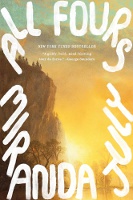
All Fours by Miranda July
How to review this book... I love July's writing, and there is at times incredible realism in her characters. They are not Normal but they live and breathe.
It's the story of a semi known artist who is going to drive to New York City, on a very long cross-country journey from California. However, she stops for lunch about 30 minutes from her house, gets slightly entranced by a man at a gas station, and decides to hire his girlfriend to redecorate her crappy motel room (like, new flooring redecorate). It is insane and unbelievable, but of course this is an artist.
It is ultimately about a rejiggering of life, the acceptance of aging, a loss of control, the lies we tell ourselves, and incredibly intense emotions.
Never has a book made me feel more asexual. Partly perhaps because I'm not sex-repulsed at all this issue in fiction is usually mild, but the fact of sexual attraction is always a bit hard for me to understand and this book really relies on a lot of that. To be fair, I've also spent a lot of life deadening my own emotions, so I'm sure that doesn't help either.
Likely to be a love/hate book for many, but July's writing ability truly is glorious.
140mabith

Thinking About History by Sarah Maza
I am frequently thinking about history myself, so this seemed like a good book to pick up. It focuses on how history has been studied and trends in writing history.
Definitely one of those books where each section could be a more in-depth work on its own, so go into this expecting an overview of many issues of history study and writing, rather than a deep dive.
If you have a look at the table of contents, that gives you a perfect idea of what to expect. Good read for me.
141mabith
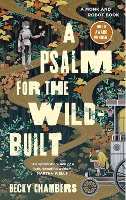 .
. 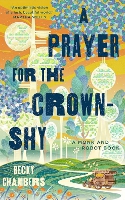
A Psalm for the Wild-Built and A Prayer for the Crown-Shy by Becky Chambers
The first book of this duo was picked for my in-person book club. We read Chambers' The Long Way to a Small Angry Planet last year and were all impressed by her alien society building. None of the other species were just Humans In Another Shape, and while she didn't overload you with sociological detail, you felt she could write an encyclopedia on each. These books were similar, in the way the robots and their lifestyle were thought out.
In this world, robots previously used in factories develop consciousness and leave the human settlements to do their own thing (and humans, to their credit, let them go and do not seek them out again or build more). Sibling Dex is a tea monk who decides to go and work as a traveler through various communities, letting people come to them with troubles, giving them tea to suit. They worked very hard to become good at this new work but one day feel the urge to leave it. They decide to seek out an abandoned monastery and on the way run into the robot Mosscap who asks, what do humans need.
The two women who suggested the first book to the group found it a calming happy read, but I kind of think they skated past a lot of the philosophical musings. Not that it can't be a comforting read, but there's more than solarpunk idealism here. In the second book especially, as we learn more about how the society functions, I think there's a potentially very dark underbelly if you're a bit more cynical.
I did enjoy these, and it's a reminder that I should read more of Chambers' books.
142mabith

Devil Venerable Also Wants to Know by Cyan Wings RE-READ
Thought I'd re-read the other book I have by this author since I re-read my favorite and a new-to-me one earlier this year. This is the author who always does really fun twists to common genres, and they're quite a funny writer as well. While Mr. Melancholy Just Wants to Live a Peaceful Life is superior, this one is still a fun read (and maybe it's not exactly superior, I just prefer that genre to xianxia).
In a Mary Sue xianxia novel, the online readers have grown fed up with the nonsensical plot and the way the female lead clings to her abusive 'true love' ignoring much better prospects and leading to the destruction of the world. When the villain of the work, demonic sect leader Wenren E, is given the first volume of the novel in question he also wants to know why he's supposed to fall in love with the female lead, even though she's clearly an idiot to make the choices she makes.
Wary of this situation, Wenren È didn’t destroy the book and, managing to look past the title, opened the cover and found a few lines on the first page: “Due to an overabundance of plot holes, this story has been rejected by its readers. Thus, the most popular character among the readers has been selected to personally verify the story’s consistency, and make suitable changes.”
This really covers so many tropes of that sort of novel, the female lead only finding the special magical items when she's about to die, saving all the right people at the right time, plot armor, etc... Wenren E's only goal is to the keep the world from being destroyed and helping Baili Qingmiao (you can immediately tell she's a Mary Sue because she has a two-character surname) break free of her abusive love (not to be with him instead, he is not one for love and has a very devoted subordinate thank you very much). Wenren E is overpowered in many ways but not brilliant at understanding people leading to some interesting choices.
The author really does brilliantly well playing with the tropes but also creating a quite compelling book with a lot of humor and no plot holes at all. Certainly one of the most talented writers on the webnovel scene. I also just love how meta webnovels get. I love the idea that sometimes readers are so annoyed, or an author is at their wit's end, and the book or characters just develop a consciousness of their own to save it. Or there are ones where the author basically curses a mean commenter (or publisher who has rejected the novel) INTO the book to prove the plot works just FINE, thank you very much. This style where a book character is given full plot access is a rarer sort.
143mabith
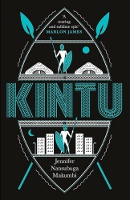
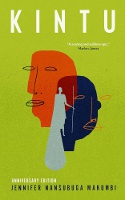
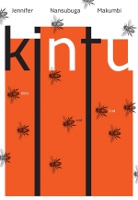
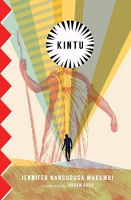
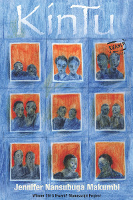
Kintu by Jennifer Nansubuga Makumbi
There were so many covers available for this book I thought I'd share a selection of them. I think the one with the bees is my favorite after reading the book, as it feels like it relates to the content a lot more than the others.
I have to disagree with the Marlon James quote that appears on some of these covers, I don't think it is an epic. Yes it covers multiple generations of a family, but if you go in expecting something similar to Homegoing or Roots, you'll likely be disappointed. It's not in that vein at all, in my opinion, and deserves to be appreciated for what it is. It didn't feel like other books I'd describe as epic fiction, it felt more like snapshots and scrapbooks which had gotten a little mixed up together (in a good way).
Divided into six sections, the novel begins in 1750, when Kintu Kidda sets out for the capital to pledge allegiance to the new leader of the Buganda Kingdom. Along the way, he unleashes a curse that will plague his family for generations. In an ambitious tale of a clan and a nation, Makumbi weaves together the stories of Kintu’s descendants as they seek to break from the burden of their shared past and reconcile the inheritance of tradition and the modern world that is their future.
I don't think they are seeking to break free from their shared past, many or most of them don't really know much about that past. They are all struggling in their own ways, but in some ways it's the story of changes in Uganda more than it is the story of this family. Many of us when we're struggling want some deeper cause that was not under our control, but I don't think that equates to firm knowledge of, or belief in, the curse for most of the characters we actually spend time with.
The book does not progress chronologically, we flit back and forth between people and times and you must be willing to sit in the boat of the book and go where the current takes you. You must not insist on firm and clear endings for all characters or situations.
I really enjoyed Makumbi's writing and I think she did a great job building the characters and their lives, their individual voices were very strong. I was happy to drift along with them. I've perhaps spent too much time talking about what the book is not, but for me that's usually the more important knowledge to have when starting a read.
144mabith
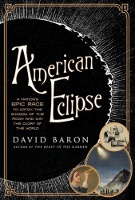
American Eclipse: A Nation's Epic Race to Catch the Shadow of the Moon and Win the Glory of the World by David Baron
I do enjoy a book about pre-20th century scientists trying to get it together to observe and study brief astronomical events (Chasing Venus being another in the genre}.
This one is also punctuated by Thomas Edison making insane claims and his usual 'yes I've invented this, just working out a few bugs now' before he's actually built/invented anything at all.
A good read, well written. I noted this rather too pertinent quote:
“In other intellectual nations, science has a fostering mother,” Simon Newcomb maintained. “In Germany, the universities. In France, the government. In England the scientific societies. The only one it can look to here is the educated public.”
In a democratic and egalitarian America, the citizenry was in charge of the nation's destiny, and therefore advancing science in the United States required convincing the populace of the value of research, that it was worth promotion and investment.
145mabith
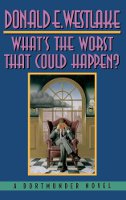
What's the Worst that Could Happen? by Donald E. Westlake RE-READ
The final of the really quality Dortmunder books, and the natural end point of the series. Dortmunder's lady friend May has received a lucky ring from a deceased uncle. Worried about his recent luck, she suggests he wear it since it fits. He's immediately offered an easy job, burglary from a corporate property guaranteed to be vacant to a bankruptcy ruling.
However, the corporate titan is in residence, apprehends Dortmunder, and to top it all off, steals the ring from him. This naturally can't be accepted, so Dortmunder is determined to retrieve the ring. It's an absolutely perfect comic novel, but largely if you've read at least four or five of the previous books.
Westlake excels at writing wealthy assholes, so I copy over for you his introduction to the villain of this piece - Max Fairbanks. If you're new to Dortmunder and want a different book with a rich asshole there's Nobody's Perfect and Good Behavior.
“Max Fairbanks,” Max Fairbanks said, “you're a bad boy.” The milky blue eyes that gazed softly back at him in the bathroom mirror were understanding, sympathetic, even humorous; they forgave the bad boy.
Max Fairbanks had been in the business of forgiving Max Fairbanks, forgiving his indiscretions, his peccadilloes, his little foibles, for a long long time. He was in his midsixties now, having been born somewhere and sometime—some-where east of the Rhine, probably, and sometime in the middle of the nineteen thirties, most likely; not a good combination—and somewhere and sometime in his early years he'd learned that a gentle word not only turneth away wrath, it can also turneth away the opponent's head just long enough to crush it with a brick. Smiles and brutality in a judicious mix; Mad had perfected the recipe early, when the stakes were at their highest, and had seen no reason for adjustment in the many successful years since.
As with so many self-made men, Max had begun by marrying money. He wasn't Max Fairbanks yet, not back then, the century in its fifties and he in in his twenties, but he'd long since stopped being his original self. Had there ever been loving parents who had given this child a name, their own plus another, no one by the 1950s knew anything about them, including Max, who having found himself in London, called himself Basil Rupert, and soon made himself indispensable to a brewer's daughter named Elsie Brenstid. Brenstid pere, named Clement for some reason, had found young Basil Rupert far more resistable than his daughter had, until Basil demonstrated just how the Big B Brewery's company-owned pubs could be made to produce considerably more income with just the right applications of cajolery and terror.
The marriage lasted three years, producing twin girls and an extremely satisfactory divorce settlement for Basil, Elsie being by then ready to pay anything to get away from her husband. Basil took this grubstake off to Australia, and by the time the ship landed he had somehow become a native Englishman called Edward Wizmick, from Devon.
146mabith
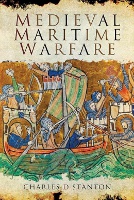
Medieval Maritime Warfare by Charles D. Stanton
I had a need for non-fiction with zero relevance to our modern struggles or my life so plucked this off the to-read list.
It's pretty long, very dry, and probably not for the general reader, but it served its purpose for me.
147scunliffe
>140 mabith: If you want a more in depth look at the writing of history, try Making History by Richard Cohen. I really recommend it.
148mabith
>147 scunliffe: Thanks, I'll look for it! I'm always up for anything about history study/writing, really.
149mabith
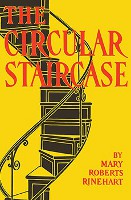
The Circular Staircase by Mary Roberts Rinehart
This is one of the influential early mystery novels and Rinehart is associated with 'the butler did it!' trope, though it existed prior to her. Originally published in 1908, if you changed the wording of the casual racism (there's not loads of this, thankfully, but certainly there and immediately reminds you exactly when this was published) and some of the technological references you'd easily think it was written in the 1940s or 50s. The tone and style felt incredibly unusual for the time.
This novel also started the “Had I But Known” style of mystery narration, though I feel like it was fairly lightly done (I'm writing this review far too late however so my memory is fuzzy).
Rachel Innes is renting a summer house for herself and her niece and nephew (her wards, just adults) but the second night there she's awakened by a loud noise and finds a dead body at the bottom of the circular staircase (after talk of ghosts and a strange noise in the house the first night as well). Rachel is quite determined to do a lot of her own investigating and also refuses to leave the house until it's solved to her satisfaction, much to the annoyance of the people renting it to her. Of course there are characters hiding things and it's only the first dead body.
Rachel was a very entertaining narrator, and again, feels quite timeless in most ways. Adjusting for cultural differences, I think most of us have known a Rachel (Rinehart also being a child of the Ohio River Valley, as I am, she certainly felt familiar to me).
If you're interested in mysteries, particularly of the golden age, this is worth a read.
150mabith
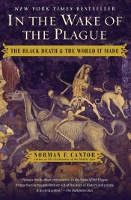
In the Wake of the Plague: The Black Death and the World it Made by Norman Cantor
I have a bit of a soft spot for older historians and I'm familiar with Cantor's best known work, The Civilization of the Middle Ages, a textbook my dad used in college which I'd pour through as a kid, because of course he'd held onto it.
This book was interesting in parts but felt extremely scattered and random and wasn't a satisfying read.
151mabith
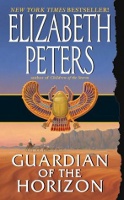
Guardian of the Horizon by Elizabeth Peters
This is the eleventh book in the Amelia Peabody mystery series, which are generally reliable for a fun time. They largely take place in Egypt, with a couple in Sudan, starting with the 1884-85 archeological season as one of the main characters is an archeologist. Peters herself, the pen name of Barbara Mertz, was an Egyptologist and wrote a brilliant book about ancient Egypt, Red Land, Black Land, which hasn't been out of print since being published in the 1960s. She knows her stuff and is rightfully scathing about the archeologists and their methods when these books are set.
This wasn't one of my favorites, going into the sillier/fantasy territory of the hidden civilization still speaking an ancient language and worshipping the old gods which they first visited in the sixth book, The Last Camel Died at Noon. This one required our leads to get rather naive for a while, though one could excuse it with a 'just in case our friend really is in trouble' attitude. It's also a bit dominated by romantic angst which I didn't love.
All the same, Amelia Peabody is such a fun character and her narration is so amusing that I couldn't dislike it. I do also think that Peters has gone a good job creating a more progressive character that isn't just a late 20th century person shoved back in time. Peabody is still very much a Victorian.
152mabith
Today is the second anniversary of my dad's death (I do think he somehow purposefully went today so the date would be hard to forget, he was that sort), so it's a strange sort of day. I have eaten pie and ice cream for him, and indulged in a lunch time beer. I also reread The Trolley to Yesterday, as we were both big fans of John Bellairs and that's my favorite and the first I read.
He was a flawed parent (though very fun when I was a kid) and a flawed friend, but also responsible for so many of reading interests and tastes, and I think his confidence really rubbed off on me in how I interacted with peers in my childhood which was a help. If I'd been more together I might have finally reread Cards of Identity by Nigel Dennis before today. He 'saved' it for me until he thought I was old enough to appreciate it (age 17 or so), but I'm not sure I was at the time. It was one of those novels he and his college friends devoured and talked about endlessly.
I'm also awaiting delivery of a book one of his college professors wrote about theatre at the college. It was his favorite professor (who I heard about, at length, all my life, Dr Hill this, Dr Hill that) and the book has a number of show posters my dad drew in it, as well as pictures of him in productions.
Here he is in 1975 at the Cincinnati art museum, very indicative of how he was (pretending a statue was biting him, actually both my parents were Like That about pictures with statues).

He was a flawed parent (though very fun when I was a kid) and a flawed friend, but also responsible for so many of reading interests and tastes, and I think his confidence really rubbed off on me in how I interacted with peers in my childhood which was a help. If I'd been more together I might have finally reread Cards of Identity by Nigel Dennis before today. He 'saved' it for me until he thought I was old enough to appreciate it (age 17 or so), but I'm not sure I was at the time. It was one of those novels he and his college friends devoured and talked about endlessly.
I'm also awaiting delivery of a book one of his college professors wrote about theatre at the college. It was his favorite professor (who I heard about, at length, all my life, Dr Hill this, Dr Hill that) and the book has a number of show posters my dad drew in it, as well as pictures of him in productions.
Here he is in 1975 at the Cincinnati art museum, very indicative of how he was (pretending a statue was biting him, actually both my parents were Like That about pictures with statues).

153mabith
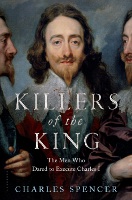
Killers of the King: The Men Who Dared to Execute Charles I by Charles Spencer
Subtitle says it all about the subject really! I found this to be a great read, very dynamically written. Recommended if you're interested in the topic.
It led me to fighting off the urge to give Rebels and Traitors another re-read, as does everything set in this period. Can't recommend that novel enough. It's an epic work, covering decades and Davis' most brilliant writing (but not without her trademark humor).
154mabith
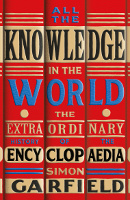
All the Knowledge in the World: The Extraordinary History of the Encyclopedia by Simon Garfield
I've enjoyed other books by Garfield (particularly Mauve), and figured I'd enjoy this as well, which I did.
Of course you could dive more deeply into a lot of what covers, but that's not the point of this book. For me it was a well constructed light non-fiction work about a varied and interesting topic. He goes the full course, into the early CD-ROM encyclopedias (which I certainly remember) and Wikipedia (the strengths and drawbacks).
One amusing thing I learned was that the dictionary selling scam bits at the beginning of the Westlake book Bank Shot are entirely accurate for how dictionaries were sold (in terms of updates and question answering services and a free bookcase etc...).
155mabith
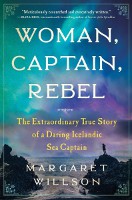
Woman, Captain, Rebel: The Extraordinary True Story of a Daring Icelandic Sea Captain by Margaret Wilson
This is about a Icelandic woman born in 1777, Thuridur Einarsdottir, who led a fairly extraordinary life, including as a well-respected fishing boat captain. She's a very interesting figure, but it was also just a fascinating resource for daily life in Iceland in this period.
Wilson writes it in a more novelized style than I'm a big fan of, but not to the point that it ruined the book for me. Wilson talks about sources and where quotes are coming from in the beginning, which helped. I'd have probably liked it more written less in that style, but one can't have everything.
Decent if not amazing read, but very happy to have learned about this interesting person who kept pushing to live her own life to her own morals, even when things were going wrong.
156mabith
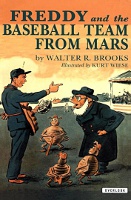
Freddy and the Baseball Team from Mars by Walter R. Brooks
Perhaps it seems picky that I can accept talking farm animals and a pig who can semi-convincingly disguise himself as a human but turn my nose up at the martians and Father Christmas showing up in the books. I'm afraid that's the kind of unreasonable person I am.
I needed a quick bit of nonsense before I started Doctor Zhivago, so grabbed this in audio, one of the rare Freddy the Pig books I'd not read yet. It's quite odd that there's an audio edition of this one, but apparently not of Freddy and the Men from Mars, which introduces the martians.
As I say, this is one of those that just gets too silly for me, but Brooks is always fun. I love his writing and his humor SO much, and in some ways he makes me laugh even more now than when I was a kid. I have precious few 'new to me' Freddy books left to read now, just four. My sister did not do her part in carrying on the love for Freddy to her kids, and I'm still pretty sour about it. It's a privilege to have had a Freddy childhood.
157mabith
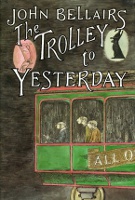
The Trolley to Yesterday by John Bellairs RE-READ
One of my standout authors and books from childhood. Bellairs' Johnny Dixon series are mostly firmly in creepy/horror territory (there are a couple I wouldn't read after dark even now), other than this one which has a historical bent. I loved them all, but this remained my favorite. Lots of folks seem to prefer Bellairs' Lewis Barnavelt or Anthony Monday books, and while I like them, this is really My series. I'm fairly certainly that as a child I just deeply wanted to be the Professor, Johnny's elderly neighbor and friend.
Johnny Dixon is a nerdy, shy, awkward kid who is living with his grandparents (his mother has died, his father is in the air force serving in Korea). The Professor is one of his key friends (along with Fergie, another semi-outcast but a much more cocky and outgoing one but tries to be cool). In this book the Professor is acting very strangely, and it turns out he's discovered a time machine in his basement and has gotten a little obsessed with trying to prevent a particular massacre during the 1453 fall of Constantinople (as one does).
This is one of those books where I vividly remember the first time I read it as a kid. I was already into history (thanks, Asterix) and this further pushed me along.
158mabith
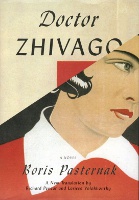
Doctor Zhivago by Boris Pasternak
Another book I've been meaning to read for far too long. I have rather a soft spot for the movie. Recently a Russian woman joined my local book club and had just re-read it so that spurred me on.
For me it's one that I'll benefit from rereading. I'm fairly good at keeping track of characters but definitely used a name sheet at times to help with the name variants. Knowing I will probably re-read it at some point, I felt like it was more important to just go with the flow and enjoyed the book that way. Zhivago is such a great character and I liked getting to know the real picture vs just movie Zhivago.
I don't have to sell this title to anyone, but if you've been putting it off for years as well, maybe take it as a sign.
159Tanya-dogearedcopy
>158 mabith: When I was a kid, I remember watching the movie on network television and falling in love with Omar Shariff and the iced over dacha and the balalaika… And because I shared a first name with one of the characters. 😂
I finally read the book for the first time in high school—kept the paperback (with the movie tie-in cover) around long enough for a second read in college before it got lost in the shuffle of moves and life in general. Definitely picking up a new copy on my next buying spree 🙂
I finally read the book for the first time in high school—kept the paperback (with the movie tie-in cover) around long enough for a second read in college before it got lost in the shuffle of moves and life in general. Definitely picking up a new copy on my next buying spree 🙂
160mabith
>158 mabith: It's very difficult to avoid either falling in love with Omar Sharif or wanting to be him! It would be a good book to have a copy of, for sure.
161mabith
And now today is the 7th anniversary of my mom's death. We only found out there was anything serious wrong in mid-August and then she died September 19th, so it was a severe shock. She had seemed in excellent health (and was just 66) and only a few months before had been in Croatia with a family friend, walking fifteen miles a day.
She remains the best person I've known. The most caring, the most genuinely curious and interested in other people and the world, incredibly smart and able to maintain a very zen attitude towards life (she worked for the postal service and then at an airport, so this was vital). She became the oldest person to complete whitewater raft guide training at her company (and in that area generally) when she was in her late 50s. She read voraciously, but rarely recommended books, which makes me a bit sad. She was an excellent parent and a wonderful friend, and the void she's left in my life only seems to get bigger every year. Although, I take some comfort in the fact that she hasn't had to see the political and world events of the last seven years.

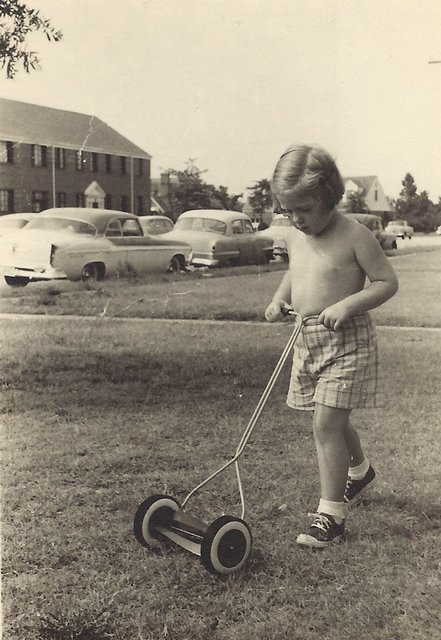
I love this picture of her from her fourth birthday (1955). She's so seriously using her brand new toy lawnmower, and one feels the expression and stance (pushing it with her belly) is copied directly from her dad.
She remains the best person I've known. The most caring, the most genuinely curious and interested in other people and the world, incredibly smart and able to maintain a very zen attitude towards life (she worked for the postal service and then at an airport, so this was vital). She became the oldest person to complete whitewater raft guide training at her company (and in that area generally) when she was in her late 50s. She read voraciously, but rarely recommended books, which makes me a bit sad. She was an excellent parent and a wonderful friend, and the void she's left in my life only seems to get bigger every year. Although, I take some comfort in the fact that she hasn't had to see the political and world events of the last seven years.


I love this picture of her from her fourth birthday (1955). She's so seriously using her brand new toy lawnmower, and one feels the expression and stance (pushing it with her belly) is copied directly from her dad.
162mabith

He Lifted My Red Veil by Zi Jin RE-READ
Quick night-time re-read of a partly silly, partly serious gaming webnovel. Gaming novels are often interesting to me because you've got a whole hidden identity aspect you can use for all sorts of misunderstandings. This is a Future world, so there's magical gaming helmets where you're in the game and feel sensations etc.
Le Han just wants to be in a relationship, even if it's only online. He's shy however, so when the game he plays (based on China's warring states period) has a tie-the-knot event, he goes to the area for male brides and waits for someone to lift his veil (Chinese traditional wedding etiquette). Qi Xun meant to lift his friend's veil as the friend's sister had taken revenge on his account (and there's no way to divorce without the heart rating getting to 100), but gets Le Han instead. They quickly get on well. However, one is on a side account with a famous main account, the other is on his unknown main account but has a famous side account, which causes some fun misunderstandings down the line (and of course manage to run into each other in real life as well without realizing).
What makes this a bit different is that Le Han's sexuality was forcibly revealed in high school and he had a really horrible last couple years. The circumstances and the reasonings of the bullies are very realistic, and done well. Mostly the book is just fun getting to the two leads meeting and being together in real life, but it's also one where it feels quite clear that the author is part of the LGBT community, or is very close with those who are.
163mabith
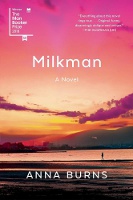
Milkman by Anna Burns
My pick for my book club this month, which was generally enjoyed. I remembered from when it came out there was some aspect people struggled with, but had forgotten that it was the fact that author didn't give anyone proper names. It's all third sister, first brother, Something McSomething, Milkman, the Real Milkman, etc... This didn't bother me, maybe partly because I'm so used to it in Chinese things and often wish it was standard in English so I could easily refer to my older brothers by age order but still indicating they're all older brothers. I say 'my youngest brother' and people think it's a younger brother when it's the youngest of my older brothers (and most people in my life do not need to keep track of these siblings by their names).
Anyway, I enjoyed the book. Middle sister is 18, and a bit of an odd ball (she walks around while reading books and this is just, beyond the beyond). When a man known as Milkman, a high-ranking paramilitary, starts paying attention to her, she gets stuck in the local rumor mill with no one listening to her about what's actually happening.
The construction of the book is interesting, in that it will give you an event, then double-back a ways before bringing you back to the event first mentioned. This felt very skillfully done, and I had the feeling of getting stuck in a long conversation with someone on a long distance bus ride (in a mostly good way).
I didn't like it as much as I hoped to though. I just didn't feel particularly caught up in Middle Sister's life, it didn't grip me or entrance me or transport me. Great writing, good story, interesting format, but maybe just picked up at the wrong moment.
The rest of the book club enjoyed it as well, though some struggled a bit with the no-names. I was a little surprised to see how ignorant of the Troubles the rest of the group were, especially given that at this meeting they were almost all essentially my age (39) or older.
164mabith
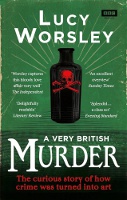
The Art of the English Murder by Lucy Worsley
Using the cover from the British edition with the original title because it's a nicer one.
This book covers both real murders, and their place in social history (plus how they were investigated) and the birth of true crime as an interest, and themes and trends of British detective fiction. It's maybe a bit of a muddle, but of course they are related and many detective novels were inspired by actual events. A pretty good little read if you're interested in the subject.
165mabith
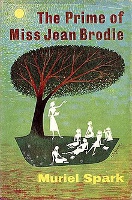
The Prime of Miss Jean Brodie by Muriel Spark
Since Gary (valkyrdeath on LT) has been reading loads of Spark this year, I decided to finally read my first by her. It seemed only right to start with the early classic.
Summary from Wikipedia:
In 1930s Edinburgh, six 10-year-old girls, Sandy, Rose, Mary, Jenny, Monica, and Eunice, are assigned Miss Jean Brodie, who describes herself as being "in {her} prime," as their teacher. Miss Brodie, determined that they shall receive an education in the original sense of the Latin verb educere, "to lead out", gives her students lessons about her personal love life and travels, promoting art history, classical studies, and fascism. Under her mentorship, these six girls whom Brodie singles out as the elite group among her students—known as the "Brodie set"—begin to stand out from the rest of the school.
A good read, and so well-constructed. Maybe particularly interesting to me since I went to a small boarding school and occasionally cliques or too-close one-to-one relationships did develop around specific teachers (less so when I was there than when my sister was there thankfully). Brodie's voice was so strong and she felt incredibly real.
It's hard to imagine its adaptation to film or TV being all that successful though (if faithful to the book). It feels like it would be difficult to get across a lot of the information in a way that felt natural.
166mabith

The Disabled Tyrant's Beloved Pet Fish by Xueshan Fei Hu RE-READ
This is one of those books that when I picked it up, I thought "well this sounds stupid, let's read it." A young man, Li Yu (homophone for carp), transmigrates into a novel he's read, but he transmigrates as a fish--an ordinary kitchen carp as well, not even a colorful koi. He manages to get himself adopted by the tyrant (the fifth son of the Emperor), the male lead of the novel. Li Yu has a system in his head, giving him tasks so he can avoid turning into fish bones and fish ash and eventually be human again.
The characters are really fun, but it's also a good example of 'sure you've transmigrated into a book but you're changing the plot and will learn things never written in the book because that's a limited picture of this world.' It's a court politics drama at heart which is done very well and the pacing is excellent. There are mysteries to figure out and it's just very funny (as you can, tell I require humor). Another of those stupid premises that has been used well and to great effect. Li Yu is a bit slow on the uptake in certain areas, which makes him quite endearing.
Mostly read this again because official translations are being released and I wanted to compare to the fan translation. At first I was very huffy about the differences but then I gave it a proper try and the official one is fine. It's not a good as the fan one, but I wouldn't say avoid it. However, for some reason they've decided the e-book versions should follow the print versions, which in China are generally released in multiple volumes (the three volume novel is alive and well!). $8 for one volume of a three or four volume book as an e-book is both very annoying to have on a device as separate parts and very expensive for me.
167mabith
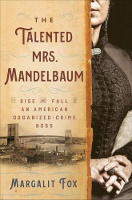
The Talented Mrs. Mandelbaum: The Rise and Fall of an American Organized-Crime Boss by Margalit Fox
I've enjoyed everything I've read by Fox (particularly, The Riddle of the Labyrinth), so it was a no-brainer to pick this up when I wanted a quick non-fiction read. I must say, Fox also doesn't stretch out a topic beyond the length it needs for a book. You wouldn't catch her turning what really only needs a long article into a 400 page book the way sometimes happens with the rise of popular non-fiction.
Fredericka 'Marm' Mandelbaum operated as a fence in New York City between 1862 and 1884, including involvement in financing and planning large burglaries and training pickpockets. The business was certainly organized, and Mandelbaum had a reputation for keeping her word. She also paid a sizeable amount in bribes to judges, politicians, and police officers, socializing with them at her home along with other known criminals.
Interesting little read, well done as with Fox's other books.
168mabith
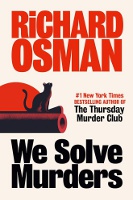
We Solve Murders by Richard Osman
Osman has either ended or put his Thursday Murder Club series on hold (he says he might revisit, I'd kind of be surprised if he does really, though I'd love that) and given us a new one. I think this is also the start of multiple books, though I haven't actually checked.
The first series was definitely not a fluke, this one takes us to very different sorts of people and places and issues, but it's equally well done. What I've been particularly impressed by both in his first book and this one, is the depth he's able to get into his characters without making it feel forced or over-explained. It feels like he's been writing them for decades, they just feel so fully formed and established. I find it really incredible.
Here Osman takes us into the harder side of crime where Amy the bodyguard is currently guarding a famous author with a death threat against her. Unfortunately a series of murders in Amy's vicinity are showing a worrying pattern and they (Amy, the author, and her father-in-law Steve) need to figure out what's going on before anyone else catches up.
I adored Amy and Steve (and the author), and definitely want more of them. Recommended if you like modern mysteries or you've run out of classics. I don't actually care for most modern mysteries but Osman is the exception for me.
Gary (valkyrdeath) and I were pondering if Osman has read Donald E. Westlake, this book especially really feels like he has (and he should, he'd love him). More in reference to Westlake's stand alone books than his series, for the someone similar vibe in balancing the humor and the crime.
169mabith
I stand corrected on the Thursday Murder Club, Gary said there was a note at the end of the ebook which implied the next Osman book would be back with them. I'm curious if that was just because Osman missed them, had a great idea for them that he couldn't put down, or had to bow to publisher pressure. It really did not sound like his intention in previous interviews.
He's plenty established he certainly doesn't need to be publishing a book every year as well, he's not a jobbing author, as it were.
He's plenty established he certainly doesn't need to be publishing a book every year as well, he's not a jobbing author, as it were.
170pamelad
>152 mabith:, >161 mabith: Your dad looks like a real character, and your mum is lovely. Such an earnest little girl, pushing that wheelbarrow.
I'm sorry you couldn't have more time with them.
I'm sorry you couldn't have more time with them.
171mabith
>170 pamelad: Thanks. I do wish I'd had more time. It does mean I have to be a little thankful for my disability. If I hadn't gotten sick, I wouldn't have had the extremely close relationship with my mom. We would have had a good relationship, but because of that we spent a huge amount of time together, and that at least was a huge boon to my life.
172mabith
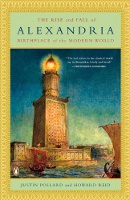
The Rise and Fall of Alexandria by Justin Pollard and Howard Reid
I'm a little punchy from the exhaustion of testing my driving limits today (and using beer to combat the extra pain now) but wanted to get started on the heap of reviews I have to do.
I absolutely loved this book. I thought it was really well managed and organized, and enjoyed the writing. Perhaps I am slightly biased by a lot of it covering periods of history I'm particularly interested having almost been named Alexandria myself, partly after the city. My mom and her family lived in Egypt for a period when she was a kid. Amuses me that she thought of it as a name (which I've always greatly regretted not getting), because my maternal grandmother thought the rest of the Cairo anglophone community's obsession with "Alex" (as they called it) to be vastly misplaced. She much preferred Cairo.
Highly recommend this book to anyone wanting a nice dose of mostly ancient history presented in a very readable package. I happy for the whole ride and it was a fascinating story.
173mabith
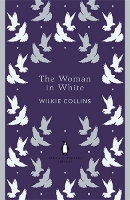
The Woman in White by Wilkie Collins
After adoring The Moonstone, I wanted to get to another Collins this year and thought I'd stick with the other really big title. Like The Moonstone it's told in chronological order with the major characters (and some slightly less major ones) narrating different sections. Collins does this very effectively.
I'd probably have been better off starting with this one before The Moonstone, which was more my speed due to all the humor and not having such a melodramatic soap opera vibe, but I enjoyed this one as well. It won't be a favorite that I reread, but it's well constructed and reasonably suspenseful. I particularly enjoyed Fosco and some of the other negative characters.
Extremely predictably, I enjoyed Uncle Fairlie (problematically queer-coded hypochrondriac bachelor that he is) the most, and from his section I quote:
Nothing, in my opinion, sets the odious selfishness of mankind in such a repulsively vivid light as the treatment, in all classes of society, which the Single people receive at the hands of the Married people. When you have once shown yourself too considerate and self-denying to add a family of your own to an already overcrowded population, you are vindictively marked out by your married friends, who have no similar consideration and no similar self-denial, as the recipient of half their conjugal troubles, and the born friend of all their children. Husbands and wives talk of the cares of matrimony, and bachelors and spinsters bear them. Take my own case. I considerately remain single, and my poor dear brother Philip inconsiderately marries. What does he do when he dies? He leaves his daughter to me. She is a sweet girl—she is also a dreadful responsibility. Why lay her on my shoulders? Because I am bound, in the harmless character of a single man, to relieve my married connections of all their own troubles.
Being the sole long-term single one of my group of five siblings, the rest of whom have been married for decades, sometimes it does feel like that.
If anyone has other favorite Collins novels, do let me know which they are.
174mabith
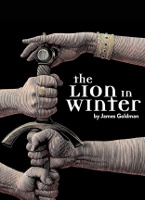
The Lion in Winter by James Goldman
Gary (valkyrdeath here) and I have a little movie club of a Sunday and some months back we watched the 1968 film based on this play. I really enjoyed it (I mean, Katherine Hepburn, come on) and wanted to get to the play as well.
They're extremely similar, not many changes that I particularly noticed (though the gap between seeing./reading them means I can't be 100% sure). Makes sense, as Goldman wrote the screenplay as well. I'd say just see the movie. You can't really beat Hepburn and Peter O'Toole, plus a young Anthony Hopkins.
It's an interesting amalgamation of feeling very 1960s and also very not.
175mabith

A Gentleman From Japan by Thomas Lockley
NOT a good book. I almost dropped it in the opening chapters and very much wish I had. If I'd looked up anything about the author ahead of time I definitely would have.
The sections with the subject of this book, known as Christopher, are just totally novelized to a ludicrous extent. After the first section like that it went into some more normal non-fiction writing and I was hopeful that would continue so didn't drop the book, then I felt I was already halfway through I should finish the book. This was a mistake and I must do better about not subjecting myself to mediocre reads that aren't even historically trustworthy.
The subject left no interviews, no testimony, no writings of his own. References to him in primary sources are around but they're not deep or detailed or anything that would require a book of this length rather than a good article length piece. Other books by this author seem to be even worse for stretching material. I'm not sure who decided recently that narrative non-fiction meant novelized but I'd like to ring their neck. 'Narrative' does not mean you don't talk about sources in the text, it does not mean arbitrarily assigning actions your subject that another of his group might have done when sources aren't remotely clear about who did what, it does not mean attributing specific emotions to them based on your very modern feelings towards an issue.
Not recommended to anyone.
176mabith
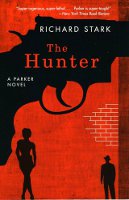 .
. 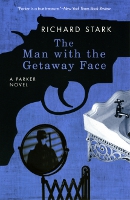
The Hunter and The Man with the Getaway Face by Richard Stark
These are the first two Parker books, published under Donald E. Westlake's most prolific pseudonym. The series is known for visiting every possible permutation of the heist novel. Parker is a largely successful criminal, and not averse to violence. In the first, he's out on the loose after having been betrayed by his wife at the behest of a partner in a job, and both believe he's dead. He's out for revenge and to get back what he's owed.
Very interesting to read given I'm such a devotee of Westlake's Dortmunder novels and have read a fair few of his stand-alone books. Dortmunder and Parker are two sides of the same coin (Dortmunder is very non-violent and doesn't want to run with violent folks either) and the former came about because Westlake was trying to write a Parker novel but it just kept going silly. You can really see that, and both are extremely good planners who suffer from a lot of semi-random bad luck (at least Parker does in these first two books). That's part of what makes the crime elements feel particularly realistic.
Fascinating as well to get a peak into an earlier era of Westlake's writing. The bones for greatness are all there, and some of his particular writing quirks as well (amusing bank names for one). The Hunter was published in 1962 and the next four Parker books all came out in 1963. There's quite a lot of misogyny and normalized violence against women that the characters engage in, but it is the period and the characters (and knowing Westlake's later writing as I do, it never feels like it's Him).
I read the first two together, since The Hunter is not a heist novel, and rather wanted to keep going after the second as well. They're very quick reads. I don't know what I'll ever be reading all of them, but I'd like to get the beginning down so I can skip around to some later Parkers (particularly after he'd written a couple Dortmunders) and see how he develops. I will read the first five at least, since the fifth book, The Score seems to be a particular favorite.
177mabith
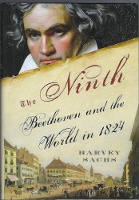
The Ninth: Beethoven and the World in 1824 by Harvey Sachs
While the "and the world" section of this book felt a bit forced, it was a good read. I don't think Sachs successfully either looked at 1824 enough to justify the subtitle or really knew how to balance the two aspects of the book. I'm not sure why just a book about Beethoven and the ninth symphony wasn't enough. There's plenty of depth to go into regarding it's place at the time and then from a historical vantage point in the canon of classical music, in addition to the actual writing of it and performance wrangling.
I would say I'm a classical music dilettante. I enjoy it, and grew up listening to a fair bit of it, and my mom was one of those parents who would only buy me classical music or modern composer albums. I appreciate a skilled musician in any genre, and used to always put a symphony or opera on when I was reading in print back when I was a person who kept a schedule (and before I was so into one specific Chinese singer). But with all that, I don't know much about the background and history of specific pieces or composers, I don't worry about what operas are really about, etc... The book worked fairly well for me, and I remained interested throughout despite the focus issue. I wish I'd sat and re-listened to the ninth symphony before starting it rather than after, but enjoyable either way.
178mabith
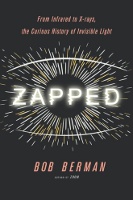
Zapped: From Infrared to X-rays, the Curious History of Invisible Light by Bob Berman
Just the kind of science non-fiction I was in the mood for. Interesting and varied book, well constructed. Convinced me I should really make more effort to be in the sun a bit every day even though it's painful (due to my nerve disease, doesn't matter if it's through glass so sunburn isn't a risk, it's painful no matter what).
Lots of interesting scientific history and new facts in this one. Recommended for a nice little science read.
179mabith
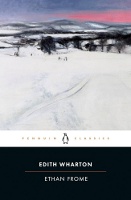
Ethan Frome by Edith Wharton
A rare Wharton in a rural setting. I was in the mood for something classic but didn't want to start anything too long, so plumped for this as my second Wharton. I didn't enjoy it as much as The House of Mirth, but that's partly due to the content. Man falls in love with his hypochondriac wife's cousin who is boarding with them to be a help to the wife.
I wasn't able to muster up very much sympathy for our title character, for various reasons. Still enjoyed Wharton's writing style however, and I'll continue to read more. Next will probably be The Age of Innocence.
180mabith
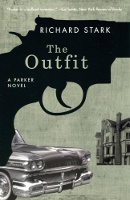
The Outfit by Richard Stark
The third Parker novel, he feels slightly more balanced in this one. After his plan to be hidden from the mafia fails in the last book and in this one they start out by trying to kill him, he decides to to make it clear what it will cost them to carry out this vendetta. You get glimpses of a number of heists in this one, carried out by his acquaintances. There are also a few "Hmm, bet he'll regret leaving that person unmurdered" moments.
These books are so short and punchy, making it very tempting to immediately read the next one. Westlake/Stark's writing style is as good as ever though. Even in these early Parkers you can see his humor poking out, and the bits he'd expand on when he started writing his Dortmunder novels. Really been interesting to go back to an earlier period in his writing.
181mabith
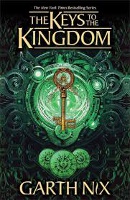
The Keys to the Kingdom series by Garth Nix RE-READ
I've been slowly re-reading these as my bedtime audiobook and decided to save the posting for one entry. There are seven books, starting with Mister Monday, and I think it's one of the best middle grade series out there. Nix is of course, a titan of fantasy writing, and his world building in this series is no less interesting or impressive than in his better known YA works. Middle grade books, and getting great ones into kids' hands, are so important in creating lifelong readers.
His Chosen One hero in these, Arthur, really doesn't want to be there. However, if he doesn't get involved, contamination from The House and its denizens cause huge problems in the regular world, plus people keep trying to kill him. He's a great character, extremely believable, and there's never any glamour to his situation. The books are really well constructed, with the pacing speeding up as you go along and Arthur gains power. Most of all I just love the world Nix built with this series. It's also a good balance of humor with messages about what's important, power corrupting, etc...
Highly recommended for the middle grade readers in your life.
182mabith
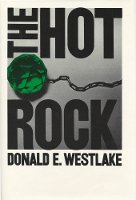
The Hot Rock by Donald E. Westlake RE-READ
I was planning to revisit this anyway after the first few Parker books out of my own interest in Westlake's writing and development. I was also transcribing a not-too-long webnovel and found it easier doing it while listening to something very familiar so I could turn my brain off a bit and just leave the fingers on (vs just music). I'm a very good touch typist, but during transcription if I start thinking too much or slowing down the accuracy decreases. I've read or listened to this book pretty much once a year for 27 years, so you can't really get more familiar.
This is the first Dortmunder book and in some ways you can feel Westlake just slightly holding back on the comedy and some of the sheer silliness, though it grows with each heist (all for the same stone, all highly professional, yet circumstances conspire against the gang). For the next book, Bank Shot, I think that's where he just lets himself go fully into the comedy. I did feel like you could see where this was initially a Parker book.
Westlake never fails to delight me, even when the words are pretty much tattooed on my brain, there are still minor turns of phrase that I'll notice particularly on a re-read and it's an absolute joy. No one is funnier, though Pratchett is an extremely close second. I endlessly regret that I didn't get my mom to read these (she might have anyway, I checked them out myself so often and was reading them as a child, but if so she didn't tell me, not being a 'let's chat about this book' person).
Just a warning if you're tempted by these, the currently available audio editions are dreadful, stay away from them. Michael Kramer is only good reader for them.
183mabith

Those Wild Wyndhams: Three Sisters at the Heart of Power by Claudia Renton
The Wyndham sisters (and their parents) were at the center of an elite intellectual social group known as The Souls, which also included people like Arthur Balfour, Margot Asquith, George Curzon, and Alfred Lyttelton. They were rather free romantically, and could easily foster one of those very dramatic soap opera-esque 'history' shows which have been so popular. The sisters used a heap of twee nicknames and an insufferable kind of baby talk slang and the whole group had their own complicated slang vocabulary unique to the Souls (with a lot of referring to themselves in the third person in letters).
Very interesting look at the more hipster center of late 19th and early 20th century British society with lots of important figures, but lord they largely seem dreadful to be around. The book was well constructed, relying on the heaps of letters left and being extremely clear when going into conjecture rather than fact (and using things in said letters as clear basis for the conjecture vs imagining whatever).
184mabith
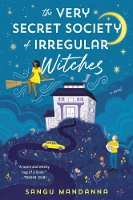
The Very Secret Society of Irregular Witches by Sangu Mandanna
This was my bookclub read for October. It's a sort of cozy fantasy, which if you like that kind of thing and can really turn your brain off is a nice enough read I guess (according a lot of other group members).
It was not fun enough to result in me turning my brain off though. There were just a lot of key contradictions in character actions in order to get the plot to do what the author wanted (at least in my opinion).
In this world there are witches, and they're all orphans. Just parents automatically die of something or other after their born and it's largely insisted they be solitary for protection except for semi-regular meetings of small groups. Mika, wanting to feel connected, takes to witch-core Tiktok and makes aesthetic videos of 'pretend' magic. This leads to someone reaching out to her to tutor three young witches who are living together and can't control their magic.
The trouble is, Mika has been so strict with her personal life and connections, with no real longterm friends, moving every couple years, etc... That establishing a quite popular internet presence made no sense to me. There was a lot of that, because I don't think the author bothered to find a way to connect the two groups without that aspect. I'd have preferred a chance encounter, honestly. That's only the beginning of the 'does this make sense for the character, oh well we need it for the plot' issues.
Not a dreadful book, but extremely mediocre for me.
185scunliffe
>179 mabith: Do read The Age of Innocence, I think it is Wharton's best.
To me Ethan Frome is about bleakness, reinforced by the weather. There is a brief ray of sunshine but it is quickly extinguished, with an ending that would fit in a horror story. Powerful stuff.
To me Ethan Frome is about bleakness, reinforced by the weather. There is a brief ray of sunshine but it is quickly extinguished, with an ending that would fit in a horror story. Powerful stuff.
186mabith
>185 scunliffe: I definitely will, I imagine I'll end up reading a lot of Wharton since I do like her writing style. The bleakness in Ethan Frome was certainly there, but I don't think I ever recovered from the beginning and feeling 100% sure that Frome's interest was entirely one-sided.
187mabith
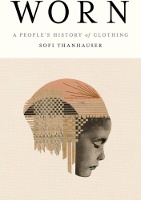
Worn: A People's History of Clothing by Sofi Thanhauser
A decent non-fiction read, though some areas where I felt like some brief comments were not necessary the whole story from other things I've read by actual historians but instead the less correct common knowledge version. This is pretty common with popular history works by non-historians, but it makes it hard to put much faith in the areas where I don't already have some knowledge and tarnishes the read for me.
I would say it's a book to make you search out more in depth works on specific topics.
188mabith
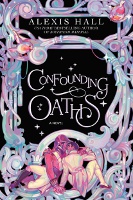
Confounding Oaths by Alexis Hall
Now here's a properly fun fantasy book. It's the second in a little duo set in the same world of very early 19th century Britain, where all the old gods and the fairy realm are known to be real. The first book Mortal Follies focused on Maelys who had been cursed and this second one focuses on her cousins, the Caesars. They live in a more difficult space in society as they're mixed race.
John Caesar gets into a fight defending his sister's honor at a ball and is rescued by a handsome promoted-from-the-ranks army captain, Orestes James. His sister, Mary, upset at always being overlooked in favor or her lighter-skinned younger sister, makes a wish which is granted by one of the fair folk. Of course, it is not a benign wish with no consequence and much of the book is spent trying to undo it against Mary's wishes and also still dealing with the consequences of his fight at the ball (which end up being rather serious) while falling for Captain James.
I really enjoy this world Hall created - regular historical world but with whatever mythology/religions being Real is my favorite sort of fantasy. I also love the way both books are narrated by a fairy who needs to record mortal adventures to earn a living/keep busy while being on the outs with Oberon. It adds SO much humor and makes it easy to put in exposition in a less forced way. It is very funny, as usual, though one shouldn't expect a romance novel the way his non-fantasy works are. These are more the usual 'fantasy novel with romance element' and I'd say the romance is even more low-key in this second book, partly due to the character's personalities and life situation's as compared to the leads in the first book.
These two also win the prize for best Hall book covers. He's been blessed with great audio readers but not so many good cover designs (in my very personal opinion), apart from these two books.
189mabith

New Times, New Hell by Lin Zhiluo RE-READ
Re-read this now largely just to post about it, as it's one of my absolute favorites.
Yu Zhengdu is a programmer who has just finished university. Something has gone wrong with his recommendation to a top tier company, so he's looking for a short term job until that's sorted out. He finds a 'life management' company, which turns out to be the modern hell run by the Ghost King who is trying to simplify the reincarnation process. The previous Hell faced problems after the cultural revolution campaign to get rid of the 'four olds' and they are working on recovering (there's a lot of humor to be found in socialism's impact on ghosts).
It's SUCH a funny book, partly due to the ghost king, Shang Que. It's kind of a monster-of-the-week book, going through different work issues and ghost run-ins with Zhengdu making various technological advances along the way as a sort of scientific Daoism (the magical ghost exorcising side of Daoism). We run through these events getting lots of character development along the way, and there's also a larger overarching issue that comes in gradually and makes up the main end event. The characters are definitely the key joy.
As with all the Chinese webnovels I read there's a romance element, and the way Zhengdu and Shang Que get together is the most fun aspect of the book for me. It still makes me cackle while reading it, the author has built the characters so well and engineered it so amusingly.
The Ghost Emperor's entire face had turned green. He looked at Shang Que. "You actually added internet to the Hungry Ghost Path?!"
"It is the goal of socialism to push for informatization and modernization of distant and isolated areas. It is also the mission of our new Hell in these new times," Yu Zhengdu humbly replied.
"Exactly, exactly." It could be said that Ghost Mother was a big fan of her current leaders. She immediately expressed her loyalty by following up Yu Zhengdu's explanation with: "Under the leadership of the new Hell, not only has our Hungry Ghost Path been connected to the internet, we've also arranged for reeducation classes for the little ghosts. With the double guidance of cooking classes and socialist values, our education plans have achieved great success. I trust that in the near future, the little ghosts will be able to smoothly return into the paths of reincarnation."
190mabith
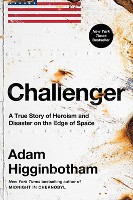
Challenger: A True Story of Heroism and Disaster on the Edge of Space by Adam Higginbotham
A very comprehensive and well written book, covering a broad period, not just the disaster. This is necessary to put it in the full context, to understand what led to various decisions along the way, etc... For some people this will be a negative, but for me it was a definite positive.
I was one of the myriad children who wanted to be an astronaut, so perhaps this colors my enjoyment, but I also think you can't understand the disaster without this wider context. It's all interesting anyway.
Recommended for the dedicated non-fiction readers or anyone with a keen interest in NASA.
191mabith
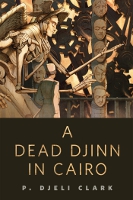
A Dead Djinn in Cairo by P. Djeli Clark
I've been meaning to read this for a long old time, and finally got to it.
This book is more like an extra long short story than a novella even, but presents such an interesting world. I'm excited to get onto the longer works in the series.
192mabith
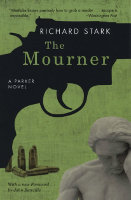
The Mourner by Richard Stark
Parker is playing cleanup from the previous book, when a broad he'd hooked up with was in the room when an outfit (mafia) hitman attacked. It was legitimate self-defense, but it's best not to trouble the law with such details. Now Bett is holding on to the gun Parker used and in order to get it back he needs to steal a statue for her father, an enthusiastic art collector.
It's in the collection of Kapor, a diplomat from a fictional European communist country, who buys art just to have and doesn't know the value of the piece - one of the Mourners of Dijon. It's an actual set of statues, and we're given a potted history. This is one of Westlake's favorite things to do, and he rarely resists the urge. Even Parker complaining about getting the backstory isn't enough to stop him.
Things get a little mixed up along the way, with Kapor being sought by his own government for embezzlement and we spend a good chunk of the book with Auguste Menlo, a compatriot who has come to retrieve the funds.
Still finding it very interesting reading these. They're so tightly written and short it makes you want to keep reading them. Some may find Menlo's key mistake unlikely but it made sense for me in the circumstances. The older I get, the more impressed I am with Westlake's writing. The year this was published he had seven books come out.
193mabith
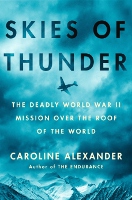
Skies of Thunder: The Deadly World War II Mission Over the Roof of the World by Caroline Alexander
Alexander is one of my absolute favorite non-fiction writers, so I was very glad to see she had a new book out after a long break. It shines most in her book The Bounty: The True Story of the Mutiny on the Bounty, but this is the real narrative non-fiction, a gripping story but full of hard facts and solid background information.
This book is a slightly more scattered story, covering the air route for getting supplies from Myanmar (Burma, as it was then) into China and the complications around that. I had slightly forgotten how much I hate Chiang Kai-Shek before getting into this. It takes very little reading about him before you realize that even a leader with zero charisma could have ousted the Nationalists after WWII, let alone someone like Mao. Chiang Kai-Shek just treated the populace at large SO poorly, and remained focused on fighting the communists rather than the Japanese for most of WWII, to everyone's utter frustration.
It's a good read. Not necessarily the subject of my dreams for Alexander, but I'll read anything by her.
194mabith
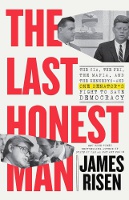
The Last Honest Man: The CIA, the FBI, the Mafia, and the Kennedys―and One Senator's Fight to Save Democracy by James Risen
This is about Frank Church, who led the once well-known Church Committee, established in 1975 to investigate abuses by the CIA, NSA, and FBI in the aftermath of Watergate. They brought out MKULTRA, COINTELPRO, and Family Jewels (a CIA program looking into covert assassination of foreign leaders), among other things.
Church is a fascinating figure, and one of those 'what might have been' people in US politics, as he died quite young. He was by no means perfect (no one is) but he was key in pushing these very necessary investigations. The book doesn't just lionize him, it seems to look at the full picture.
And he also had no time for Chiang Kai-Shek. So there.
195mabith
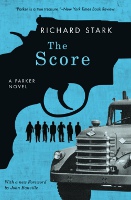
The Score by Richard Stark
Now for something completely different. The fifth Parker novel, and the one I'd been waiting for as it seems to be a fan favorite among the earlier books. I can see why, Parker is going to rob an entire town and that's inevitably a fun concept.
Of course, there's a problem. The person who brought them the job has an unclear connection to the town that Parker knows will probably cause trouble. He just doesn't know what kind and takes the risk regardless.
A fun read.
196mabith
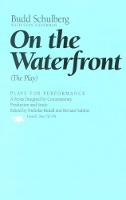
On the Waterfront by Budd Schulberg
I didn't realize until after I'd finished this that the screenplay came first for this work and the play much later. If I'd known I probably would have just watched the film. I was largely familiar with the title, rather than anything else, and hadn't known it was the source for the oft-referenced line "I coulda been a contender."
An interesting relic but probably best to just watch the film or maybe read the later novel he wrote for a different focus. Feels a little like Schulberg was lost for ideas and trying to capitalize on known successes.
197mabith
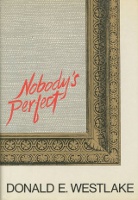
Nobody's Perfect by Donald E. Westlake RE-READ
I'm well behind on reviews, so these are from early November, and the fun and familiar distraction was/is certainly needed.
This is the fourth Dortmunder book, maybe slightly weaker than most of its peers in the first nine novels but still fun. Dortmunder has been caught in a minor burglary, and suddenly a high powered, famous defense attorney is there to get him off. Afterwards, the attorney instructs him to contact someone, which naturally Dortmunder doesn't wish to do. Forced, he finds a rich dilettante who wants to arrange a false robbery of a painting for an insurance payout.
Of course, things never go smoothly for Dortmunder, and this one even drags him overseas. There are some particularly funny bits (as ever), and Westlake always writes obnoxious rich people so well and with quite a bit of variety. Chauncey in this novel would not get along with our rich businessmen in Good Behavior or What's the Worst That Could Happen, and they wouldn't get along with each other either.
Bad lookout that Westlake is already talking about dead zones in shopping malls in 1977.
However, inflation and unemployment have affected the shopping centers at least as much as the rest of the economy, so that here and there among the brave enticements stood a storefront dark, silent, its windows black, its forehead nameless, its prospects bleak. The survivors seemed to beam the more brightly in their efforts to distract attention from their fallen comrades, but Dortmunder could see them. Dortmunder and a failed enterprise could always recognize one another.
198mabith
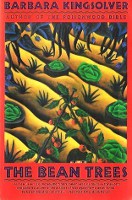
The Bean Trees by Barbara Kingsolver
I've read other Kingsolver books before but this is actually my first of her novels, which I've long meant to read. It was comforting to be with Appalachian characters - no matter how different from my life or upbringing there's just a sense of home.
This was a strange but enjoyable ride and I certainly enjoyed Kingsolver's writing style. Looking forward to reading more.
Also very strange that none of the covers I've seen for this book feature wisteria, which is what the bean trees refers to. Special place in hell for whoever did that now common cover which just has a silhouette of a tree on it.
199mabith
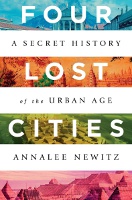
Four Lost Cities: A Secret History of the Urban Age by Annalee Newitz
Ancient history is my main comfort with the election stress. I really wanted a full book about Çatalhöyük but couldn't find anything in audio. This one covers Çatalhöyük, Pompeii, Angkor, and Cahokia.
A good little read, if everything feels too brief. The focus of the book is definitely on the urban nature of these cities and how that impacted things. Just what I wanted at the time. Part of me kind of thinks she'd have been better leaving out Pompeii. It's so much more known as a City.
Left me feeling quite annoyed that when I was in school we did nothing on the moundbuilder cultures. I spent my childhood going to mounds, they're common enough in my region that on car trips they were a typical 'let the kids out to run up and down this mound for a bit' stop. Yet instead of learning about that in social studies we had to do the US colonial period and revolution every single year with precious little new information added each time. I mean, West Virginia's second largest mound is fifty minutes drive from where I grew up.
200mabith
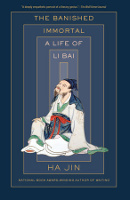
The Banished Immortal: A Life of Li Bai by Ha Jin
You can't really engage with current Chinese media without encountering references to Li Bai (also known as Li Po), which says something about his staying power (these are not necessarily named references that you can spot without an education in the Chinese classics but translators often point them out).
He was talented and ambitious and in many ways his talent got in the way of developing a proper career at court. Those who would have sponsored him often worried that he would overshadow them and so withdrew support. He's known for his drinking, and his drive towards perfecting older forms of poetry rather than creating new ones. It was particularly interesting hearing about his writing from women's perspectives and how that differed in his poetry compared to the others who occasionally did it.
This was a very good read for me. Interesting and well done.
Last year Gary and I watched the very long animated movie, Chang'an (also called 30,000 Miles From Chang'an), which is about the friendship between Li Bai and Gao Shi stretching from a prosperous period to the An Lushan rebellion (and slightly about Du Fu). I loved the way they included the poetry in the film and the background are so gorgeous. If you want a taste of Li Bai and this era of poetry, I'd recommend it.
Here among flowers one flask of wine,
With no close friends, I pour it alone.
I lift cup to bright moon, beg its company,
Then facing my shadow, we become three.
The moon has never known how to drink;
My shadow does nothing but follow me.
But with moon and shadow as companions the while,
This joy I find must catch spring while it's here.
I sing, and the moon just lingers on;
I dance, and my shadow flails wildly.
When still sober we share friendship and pleasure,
Then, utterly drunk, each goes his own way—
Let us join to roam beyond human cares
And plan to meet far in the river of stars.
—"Drinking Alone by Moonlight" (Yuèxià dúzhuó 月下獨酌), translated by Stephen Owen
201mabith
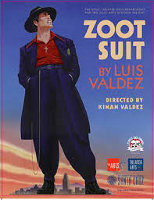
Zoot Suit by Luis Valdez
Another play, this one based on the Sleepy Lagoon murder of 1942 and the zoot suit riots of 1943. A good play. This is another of the LA Theatre Works audio productions, which are a great resource if your library subscribes to Hoopla.
I hadn't realized that Valdez also wrote and directed La Bamba, a movie I absolutely adore (Ritchie Valens biopic).
202mabith
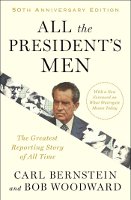
All the President's Men by Carl Bernstein and Bob Woodward
My book club thought I was very cleverly putting this book in November (I arrange the order of our picks because no one else can be trusted to care about genre variety) but actually it was accidental. It was almost quaint to look back at this given everything that's gone on in the last eight years. I was horrified to hear that one woman in our group was only vaguely aware of Watergate, and she's in her thirties. I mean, surely it's referenced in lots of popular media.
It's remained a popular book for good reason, it's very readable and carries you along the investigation like a mystery novel. Though, saying that, a number of people in my book club found it dry. I don't agree, but I love history and I do read a lot of non-fiction compared to those group members. The woman who suggested it didn't find it dry either.
I am glad I'd also just read that book about Frank Church which goes into the aftermath of Watergate and the impact on politics.
203mabith

Waiting for the Flood by Alexis Hall
Given the election and just being generally down for a few reasons I decided not to 'save' the annotated Hall books anymore. With this one it consists of two novellas, though the second is twice as long as the first. I'd already read the first but the second only got written for this print edition (they were only digital previously). I'd waited on this partly since I loved Edwin, the main character of the first novella, and I didn't want to like his ex Marius (the focus of the second part) or find out what his deal was.
Hall writes a fair few unlikable leading men, and Marius is certainly one of those. However, he's very good at the unlikable traits making sense given the character and creating a believable person (and generally those characters dislike themselves more than anyone else). I enjoyed that the thrust of these books together is that you can love someone, and keep loving them, while realizing you're not right together, you're too alike or too different and it doesn't mean the love isn't real.
A plot summary is sort of unimportant with these stories. Of all his books I've read, this one (two) maybe feels the most like a character study, perhaps because there's really kind of only one event in each. It's not my favorite of Hall's books or this little 'series' (they're not actually related, really, there's just occasionally some overlap in characters' friends groups) but it's still a good read and very funny in parts.
This passage really sums up what I want in any important relationship, romantic or platonic.
It's all I've ever wanted, really. Someone to make tea for. To know how they like to drink it, and share some pieces of time with them at the end of long days, and short ones, good days and bad, and everything in between.
204mabith
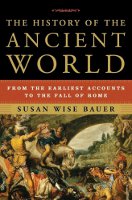
The History of the Ancient World by Susan Wise Bauer
I read half of this, and it wasn't very good, but I just needed to not be thinking about anything current. I stopped, took a break for other books and decided to still finish it, curious what she'd say about the later areas where I do actually know a fair bit.
She does not really talk about sources as it goes along, and she takes a lot of ancient historians at face value in the text with no pushback about motives. It's a strange thing because it feels like my social studies (what they called history in school when I was young) books growing up - just very simplified and dumbed down. Only of course this is not a book aimed at children to give them an interest they can look into more deeply. I don't see the point of writing this way for adults.
Not recommended for anyone really.
205mabith
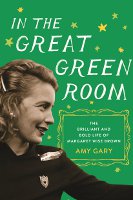
In the Great Green Room: The Brilliant and Bold Life of Margaret Wise Brown by Amy Gary
What an interesting figure Brown was! She deserved to have had an easier life with more love in it.
These days we almost exclusively know her for those childhood staples Goodnight Moon and The Runaway Bunny, but she was extremely prolific and had ideas about children's books which were well ahead of their time. She had a long standing affair with a man who said he wouldn't marry and then married someone else, then one with quite a toxic woman writer, Blanche Oelrichs (pen name Michael Strange) who was always running down her work for children as unimportant. Those sections are so hard to read, Gary renders Brown so real to the reader you wish you could go yank her away. (She was of course not a perfect paragon of virtue or anything, don't expect that.)
Really enjoyed reading this and finding out more about her. When I get that time machine I'll go seduce her myself and keep her away from Blanche. I'd be much more help to a titan of picture books.
206mabith

Pansies by Alexis Hall RE-READ
The last of this now annotated 'series.' This is the hardest book of the group for me, for a variety of reasons.
Alfie Bell has done well - he got all the right degrees, moved to London, and now he's making all the money he could need as some sort of investment banker (it's not my area). He goes back to South Shields for a friend's wedding, accidentally comes out as gay to all the wedding guests, and while freaking out about it in a bar meets (and slightly falls for) a stranger who turns out to be a boy he'd bullied in school (for being noticeably queer, essentially).
Alfie is dealing with so much internalized homophobia, and struggling with the change this has brought in his relationship with his parents and fearing the change it will bring to his older relationships with his peers. Also making this a hard read for me is the fact that Fen, the boy he'd bullied, is dealing with the loss of his mother (and it's a very similar relationship/grief to mine for my mom).
Grief is a pretty constant theme for Hall. Whether it's a literal death or grieving a past self or grieving something that could have been. The literal deaths are also varied and represent very different kinds of relationships. In many ways Alfie is grieving as well, the self he was 'supposed' to have been if he weren't gay.
"But it feels lonely without someone in the world who knows who I am. Not just everything I pretend to be."
This is exactly how I feel about my mom.
Until he'd had to tell them he was gay, he'd always pretty much taken for granted that his parents loved him. But it was family that held them. A pattern of days spent together. The inevitability of ancestry. It was good, though. Important. A lot more than most people had. ... But it wasn't like this. The sort of love that gave you yourself and changed you with its loss. The sort of love you'd cling to, however you could.
It's a good book, and while I've gone for the serious aspects of course there are still a lot of funny moments. Hall makes me laugh more than anyone else since Westlake and Pratchett. The internalized homophobia does just stab me in the heart though. It feels like it would have been a tough book to live in while writing it.
207mabith
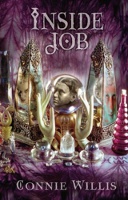
Inside Job by Connie Willis
Reading any Willis is always a reminder that I should read more Willis.
This is a novella about a paranormal debunker and the actress who has glommed onto him as an assistant. She brings him to a new-ish channeler, and during the act she abruptly seems to start channeling a skeptic who insults the audience. They realize later it's HL Mencken (because of course).
It's not her greatest work, but a fun little jaunt.
208mabith
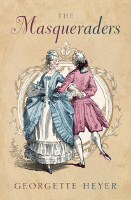
The Masqueraders by Georgette Heyer
Another fun little jaunt. This is an earlier work than the other Heyer I read (Cotillion), and rather than her well-known Regency romances it's set soon after the Jacobite uprising of 1745.
A brother and sister are somewhat on the run, waiting for orders from their rather wild father, when they get a little caught up in other's dramas and become more known in society than they meant to be. Enhancing it is that they're both cross-dressing (for hiding in plain sight purposes, though it doesn't really feel like that's actually necessary, honestly). Love and adventure abound in any case. It was fun, and interesting to read one of her early works (1928), though Cotillion (1953) is definitely more solid.
209mabith
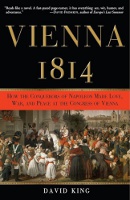
Vienna 1814: How the Conquerors of Napoleon Made Love, War, and Peace at the Congress of Vienna by David King
Just what I needed after the ancient world nonsense - hard focus on a short period. Subtitle says it all really. Good, interesting read about a period where I have a lot of gaps in knowledge.
210mabith
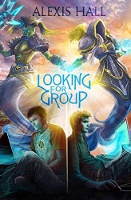
Looking for Group by Alexis Hall
You can tell it's really been a tough month, because here's another Hall book, though this time entirely new to me.
Given I've read so many gaming-set Chinese novels of course I had to read Hall's venture into the genre. He's quite a big gamer himself and it does show here. If I hadn't read all those Chinese novels I'd have been a bit lost with a lot of the gaming terms (there is a glossary though, which I did need).
It's a quick read, far less complicated than my Chinese ones, and focused on younger characters than he usually writes (first year of university). Drew leaves his guild in Heroes of Legend because their playstyle was making it Not Fun, joins a new guild, meets Kit, who he thinks is a girl and develops a crush on before finding out it's a boy. That's not actually much of an issue in the end. Instead he's struggling with expectations and peer pressure and trying to be someone who doesn't get teased basically and is doing uni "right." Fun one, if simple.
211mabith
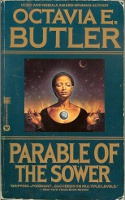
Parable of the Sower by Octavia E. Butler
I really loved Butler's Kindred and Fledgling, so I've been meaning to read more by her. The duo that this book is part of seemed a more manageable next step as compared to her earlier Patternist series or Xenogensis/Lilith's Brood series.
Reading this now it's even more evident what a strong writer we lost with Butler dying so young. Though it's also strange to come at this work from Now, after the strong rise of doomsday preppers (who generally only think about guns and storing canned food rather than more useful skills) and the increasing lack of regulations.
We're in a dystopian future, there's climate change and vast social inequality, but rather than springing from some big single event the US has just slid into this horror more gradually. Lauren and her family must stay in their formerly gated now walled community the vast majority of the time for safety. Water is incredibly expensive and they are better off than many, not needing to be purely subsistence farmers but they wouldn't survive without their gardens and preserving.
Lauren's father is a community leader and preacher, but Lauren develops her own sense of religion and ideas on where humanity needs to go.
A very good read and I'll look forward to the next one.
212mabith
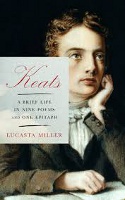
Keats: A Brief Life in Nine Poems and One Epitaph by Lucasta Miller
After seeing this one on Dan's thread I immediately grabbed it from the library. Sounded just what I was in the mood for and I really enjoyed another Miller bio, L.E.L.: The Lost Life and Scandalous Death of Letitia Elizabeth Landon, the Celebrated "Female Byron", so felt confident in the author.
Keats is one of those poets where small bits of his writing make it into common knowledge more than you might realize. I would certainly say in the US I grew up hearing/seeing references to Keats' actual poems far more than say, Byron (whereas I certainly got more references to Byron's life, mad bad and dangerous to know etc). My dad was very fond of saying 'a thing of beauty is a joy forever,' particularly about early 1940s cars, and I seem to remember encountering multiple parodies of the first few lines of The Eve of St. Agnes, most notably in The Snarkout Boys and the Baconburg Horror.
It's a very well-done, extremely readable book and I learned a lot. I'm looking forward to more interesting books by Miller, though I will wait on The Bronte Myth until I've read more Bronte novels.
213mabith
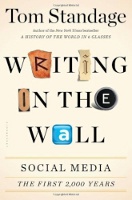
Writing on the Wall: Social Media - The First 2,000 Years by Tom Standage
I feel like this is one of those books where the subtitle sort of puts you off it, or makes you defensive. It might be better to go into it thinking of horizontal news spreading (peer to peer as it were). I'm not sure he totally justifies it, but there's a lot of interesting tidbits about communication and how it's shifted over the centuries.
In general I've enjoyed Standage's books - fun popular history reads with interesting facts spread liberally throughout and this was much the same. I feel it suffers a bit in comparison to his excellent work, The Victorian Internet about the telegraph, where I think he really does justify the title with the actual history.
Not a bad read, but not his best. Good enough for my currently scattered and unhappy little brain.
214mabith
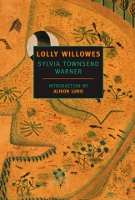
Lolly Willowes by Sylvia Townsend Warner
This came up recently on an LT thread but I can't remember where. It spurred me to look to see if it was more available now than the last time I checked and lo and behold the library had an audiobook. A friend's wonderful father recommended this me more than a decade ago, along a pile of other less well-known modern classics. I went into it knowing nothing about the plot and thoroughly enjoyed the experience.
Laura (Lolly) Willowes has lived in the family home with her father until his death, at which point she moves in with her brother Henry becoming the live-in aunt-of-all-work. As the children are grown she feels stifled by her role and that it has ended anyway, so makes a sudden decision to move to a small village. I won't say more about the plot, but it goes in a surprising direction for 1926.
This felt like a horrible 'what could have been' for me in some ways. I'm the only unmarried sibling of my family, I can't work due to a disability, and after my sister's first child was born she wanted me to move in with them (largely to help out, given that she was unhappy with my idea of maybe moving to the same city but not into their small apartment). I declined, because it was never going to work out well, but it gave a sort of there but the grace of god relevancy to Laura's struggles with her place in the family and in the world. In reference to the end of the book,
I wrote down a number of quotes from this one but here's my favorite:
Indeed, Laura’s legs were very slim and frisky, they liked climbing trees and jumping over haycocks, they had no wish to retire from the world and belong to a young lady.
215mabith
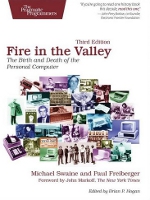
Fire in the Valley: The Birth and Death of the Personal Computer by Michael Swaine and Paul Freiberger (Third edition)
The title says it all really! This is a book whose first edition was published in 1984, with the subtitle The Making of the Personal Computer. Sadly we're now in a world where people don't know what a folder is and are only familiar with the enforced ignorance and uselessness of knowing how to use a smartphone or tablet. Not to mention god knows how bad it is for their hands and wrists. This all depresses me so I wanted to go back to the joy of the earlier PC days. A good book, told well, and the type of thing I needed.
My first day working at the local bookstore, lightning struck the building and fried all the network cards in the store computers so we couldn't get online for anything. My fairly basic computer skills meant I could both pinpoint the issue and replace the cards myself, deeply impressing the elderly store owner and making me a computer god in her eyes (probably half responsible for the $250 bonus I got six months later, and thems 2003 dollars!). My poor nieces and nephews may never have that joy.
216mabith
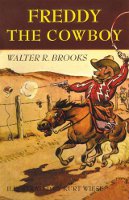
Freddy the Cowboy by Walter R. Brooks
One of the last few new-to-me Freddy books I've got left. This saddens me a bit, but they make excellent re-reading. Also, the earlier (and better) books are largely available as very well done audio editions on Hoopla.
Of all the children's classics that deserve to be well known today and continually read, these should be high on the list. They're far better than most and yet largely forgotten. My parents were a great age to have read these as kids yet never knew about them until they were being republished in the 1980s (my dad came across them largely due to being a librarian). I do wonder if both of them were a bit snooty in their reading tastes though, so might well have ignored a talking animal book if they'd seen them, particularly as the oldest of their siblings. The more I think about the more likely that feels.
The humor in these holds up wonderfully for the adult reader today. Brooks is so good at making the animals into well-rounded characters with a variety strengths and weaknesses.
This one isn't my favorite, though I like the rub of a horse Freddy buys (after seeing the owner beating him) teaching Freddy to ride well. It also introduces The Horrible Ten, who are a great invention. Still solid fun and ranks above when Brooks brings in martians and such (it was the 1950s after all).
217mabith
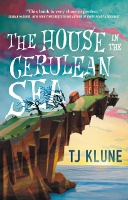
The House in the Cerulean Sea by TJ Klune
I'm out of step with many others and didn't love this book. It was a book club read and pretty much everyone else really liked it. For my mood now, and for the audio version being distracting and not great, it was just too twee.
It's a fantasy book where a bureaucracy has taken charge of magical children and largely put them into 'orphanages' (though no one is ever adopted). Our narrator, Linus, is an inspector, looking to incidents at the homes and, to his mind, making sure the children are safe. Now he has a special mission to visit a more unique home where one child is the son of Satan and they're all seen as more dangerous than others. Linus is incredibly naive at the start and grows after meeting the children blah blah blah.
The tone of it feels like it should have been a children's book (it's listed in adult sections, not even YA), but you can't sell a children's novel with an adult narrator. The audio narrator's style didn't help this issue. I also couldn't tell if the author was being intentional with certain aspects. Two of the children make a lot of hyperbolic threats of violence and talk about murder a lot and to me that's just a lot of kids. It was certainly me. I learned how to make nooses to string up dolls and stuffed animals as sacrifices to various gods and goddesses I read about, and was always being told to stop picking up dead birds. One woman in my book club found her daughter looking at her wedding picture in the woman's bedroom, and the kid said when her parents died and this was her room she was going to move the picture.
So I kind of thought "these are honestly just normal kids with a few powers" would have been a bigger part of the book, but the focus was more 'even if they're dangerous they're still innocent children!' It kind of gave me the impression that Klune also hasn't really been around kids that much. I don't know if that's true or not (I do know it's hard to write good child characters and good 'adults interacting with kids' characters).
Again, most people I've talked to seemed to really like the book, and I think I'm rarely in the mood for quite this kind of book so your mileage may vary. I would say don't go near the audio version though (southern US accents where the home is but Klune, an American, has put British slang into the characters' mouths, plus being an overly theatrical reader). The book itself wasn't terrible, there were fun little bits, but just not for me.
I was on best behavior last night at book club and not doing my more typical 'but what if you thought about this more critically' thing so clearly still had a lot of complaints to get out. Whoops.

